

Complete Dubai Safari Park Guide – Location Map, Timing & Ticket
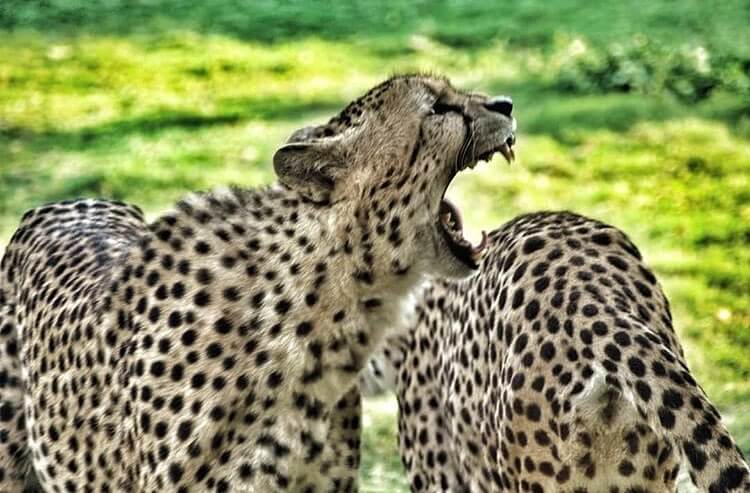
Originally posted 2018-10-17 00:16:18.
Dubai Safari Park – A Great Wildlife Project
Dubai Safari Park, located in Al Warqa’a is another jewel in the crown of the happening city. Opened on 12th of December 2017 the Dubai Safari Park promises to be an affordable and economical recreational option for all. This project replaces the 50-year-old zoo in Jumeirah. Lack of space and adverse conditions of the Dubai Zoo was a point of main concern which led to this initiative. The safari park now houses the existing animals from the Jumeirah Zoo plus new ones. This massive wildlife project consists of 250 species, including endangered species.
Some of the critically endangered species were announced to be a part of an international breeding program involving the breeding of animals to send them to other zoos or to be released into the wild. There is now a total of more than 2,500 animals with a planned addition of approximately 2,500 more. The area of the safari park is spread over 120 hectares of land, which has been divided into five villages.
Table of Contents
The Safari Village
This is not your conventional zoo where you only get to view the animals lounging around in their cages or small enclosures created for them. You now get to view them in a more natural habitat.
For a tour of the safari village, an air-conditioned car specially designed for the tour will give you a classic, close-up view of the exotic animals and their lifestyles. Consider it an escapade into the jungles of Africa and Asia, where you can behold lush, tropical forest sights. Animals inhabiting the Safari Village include bears, baboons, water buffaloes, zebras, and deer. You can witness the majestic brown lions soaking up the sun, cheetahs on their racing tracks and tigers in their enclosure with the splendid, gurgling waterfalls to keep them cool.

You get to view the crocodiles at close-quarters in the world’s first drive-through hypo-aquarium, giving you better look at the formidable reptilian creatures. Other attractions include brown bears, a bird theatre with 6 shows and feeding areas for giraffes. An expedition of this region of the Safari Park can take anywhere from 45 to 120 minutes.
The Arabian Village
Now let’s enter the region that constitutes the Arabian village Arabian village. This tract of land consists of sandy deserts, and rocky mountains, and the steppe showing you the Arabian habitat landscape surrounding the wildlife. A steppe is a vast area of barren land without any plantation except for shrubs. A luxuriant meadow filled with a great variety of flora and fauna is a welcome sight. Populating this territory you will meet Arabian wolves, Antelopes, and Nilgais. Nilgai is the largest Asian Antelope.
Step onto a train crossing through the Arab village and watch the horses, birds, ostriches and falcons enjoying their day. It will take about 20 to 25 minutes to…
African Village
Moving to the African region of the park which welcomes you with a set of the African savannas and rainforest, gives you feel of the real African landscapes. Here you will be greeted by the giant tortoises, chimpanzees, hyenas, flamingos, African wild dogs and the regal white lions. Even in this village, you can take the train or Safari car to ride around and enjoy the animals. There are four stops where you can walk and watch the white lions ready to play through the glass walls, plus gorillas, pygmy hippos, lemur, bongo and okapi which is one of the endangered species that the forest is breeding. The ride around this section of the park will take somewhere between 90 to 140 minutes.

Asian Village
Here in the Asian village the scenery, the environment, the landscape is all set to reflect the Asian forests. You can take a walk along the dense trees of the enclosure and witness the beautiful Asian creatures. This will require at around 30 to 90 minutes of your time. The species to see here are the Komodo Dragons, Moon Bears and Gibbons. Along with these, there are elephants, pandas and monkeys and a variety of birds and reptiles.
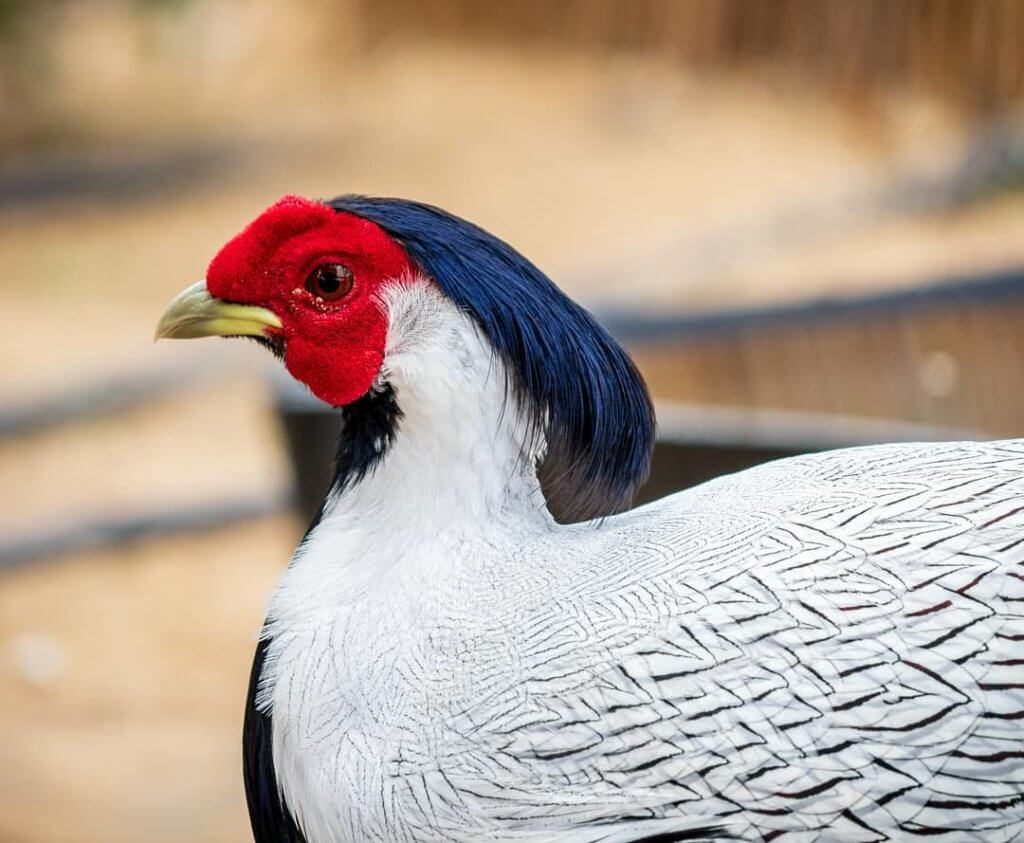
The Children’s Farm
Visiting the Dubai safari park with children, you just cannot miss out on the most adventurous section of the park. Close to the park’s entrance is the children’s corner specially designed to keep the children involved. This is an educational spot where children can learn about farm animals, their importance and how to take care of them. The farm features farm animals such as sheep, cows, goats and chickens. Activities involve collecting milk and eggs and riding ponies.
Wadi Village
Of course, no tourist spot is complete without eateries. The Wadi village offers you a relaxing spot which has water streams flowing through it and fishing ponds all powered by solar energy. After the tour, you can relax in the green valley and treat yourself to the delicious foodstuff being offered by the restaurants and eateries.
Special Features
The park has special facilities to maintain a suitably cool environment for the animals. Air-conditioned rocks, misting fans and chilled and chilled pools have been installed all over the park. There is a large theatre that can accommodate up to 1,000 people. This theatre host shows featuring different animals. They have eco-friendly vehicles for touring. This park features a UAE’s biggest walk-through aviary in the African village and the first drive-through hippo and tiger exhibit. They introduced the world’s first drive-through crocodile exhibit.
Dubai Safari Park Location Map
The Safari Park, located opposite Dragon Mart on Hatta Road in Al Warqa’a 5 is open to the public from 9 am to 7 p.m. However the tickets stop selling at 5 p.m. or when the park was filled to capacity. The tickets are available for purchase from the main building of the park or you can here +971 800 900 to book your tickets on phone. The ticket prices are as follows: For full access to all areas of the park, obtain a combo ticket at 85 AED for adults and 30 AED for children.
For entry to all areas except the Safari Village obtain the Dubai Safari Park Ticket at 50 AED for adults and 20 AED for children (The same ticket prices apply if you only wish to visit the Safari village).
There is free entry for the elderly above the age of 60, for children below 3 years of age and people with special needs (accompanied by 2 people).
Future attractions
There are plans to introduce about 2,000 more animals, Australian and South African villages, veterinary, zoo-keeping and conservation courses to educate people and bring awareness among them regarding wildlife. The park was closed on 15 May 2017 for further up gradation and is expected to re-open in the month October with more features. Let’s see what surprises are in-store after the embellishment program is complete.
Similar Posts
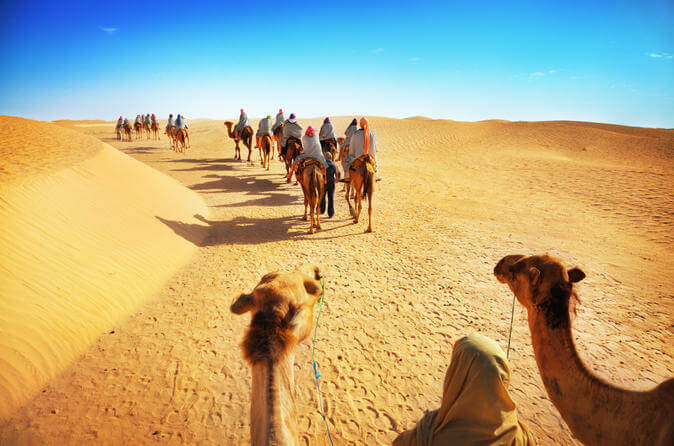
Best Desert Safari Dubai ( Review of Discover Desert Safari Tourism)
Originally posted 2017-09-09 04:52:04. Desert Safari Dubai Desert Safari Dubai should be a must-visit place on your Dubai tour itinerary. Especially, If you want to view another side of Dubai, the Dubai Desert should be your priority. Located between Dubai & Sharjah border, this place gives a real feeling of the desert. Tripadvisor includes this…
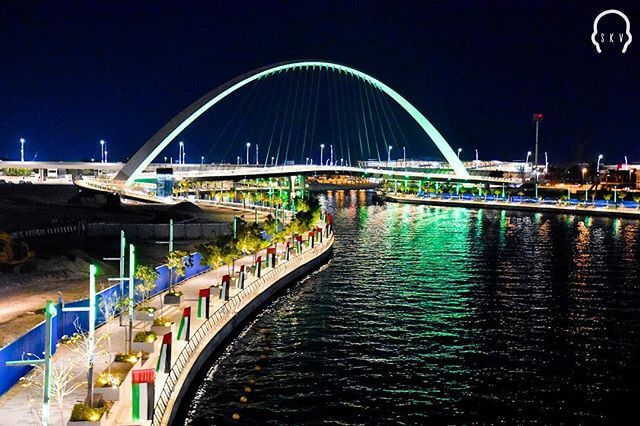
Ultimate Dubai Water Canal Cruise Guide,Timing,Ticket & Location Map
Originally posted 2018-09-27 07:03:38. How Long Dubai Water Canal? Dubai water canal is the newest AED 2.7 billion human-made island in Dubai that connects Business Bay to Safa Park. Dubai Water Canal, 3.2 km long waterway, completed in 2017. Beginning at the Dubai Creek, the canal runs through the Shaikh Zayed Road, Passing along the…

Dubai Creek Park: Activities to do at Creek Park
Originally posted 2021-01-29 09:39:09. Dubai Creek Park lies on the edge of Dubai Creek, which connects the desert to the sea trading port in the old city located between Garhoud and Maktoum. This park can be found in Dubai Creek Park, the second largest park in Dubai. It is also one of the oldest parks…

Palm Fountain: Launching of the Biggest Fountain
Palm Jumeirah is known to be situated in Dubai, UAE (United Arab Emirates). It is an offshore Island that is manmade. It is especially for private hotels and houses. The most fascinating is that the name “Pal Jumeirah” has been kept on the way it looks. If seen from high up in the air you…
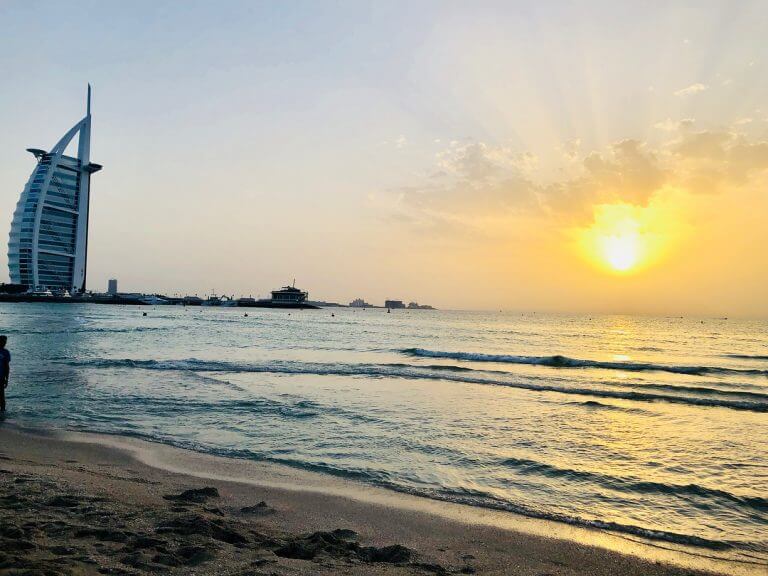
Free Things to Do in Dubai – No Need to Spend Even a Dihram
Originally posted 2017-10-29 15:07:06. It is hard to find anyone who does not enjoy free offers. We tend to think of luxury and expensive things whenever we hear about Dubai. Nevertheless, I have put together a list of Free Things to Do in Dubai that you simply cannot miss out on if you are a…
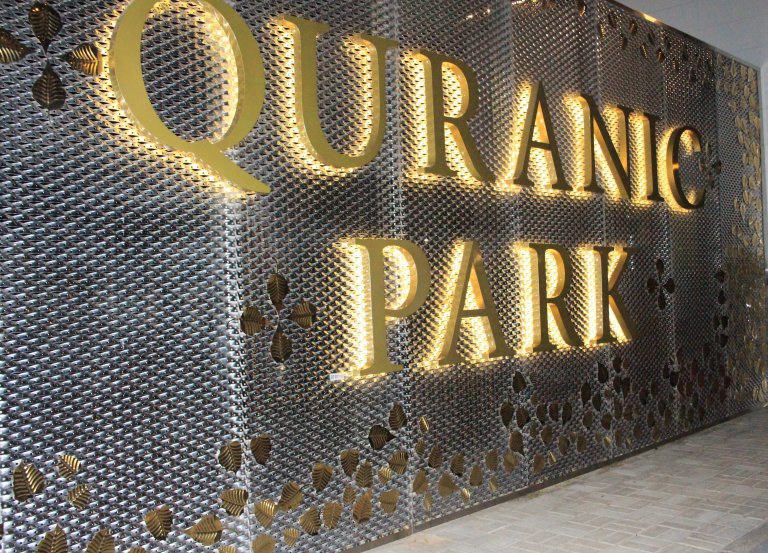
Al Quran Park : Featuring Miracles of Islam
Originally posted 2019-04-01 17:51:07. Al Quran Park is the most prestigious and holy place to visit in Dubai. It was inaugurated on March 29. A unique feature of Al Quran Park is that it contains all the miracles of Islamic values accounted for in the Quran, the Holy book of Muslims. Entry to this park…
Leave a Reply Cancel reply
Your email address will not be published. Required fields are marked *
This site uses Akismet to reduce spam. Learn how your comment data is processed .

Dubai Safari Park Guide
About dubai safari park.
Experience the wild side of Dubai at one of its most popular attractions with your Dubai Safari Park tickets. Spanning a massive area the park houses more than three thousand animals brought here from different parts of the world. Explore the four unique zones that the park is divided into, each with its own distinct features and specialties. Each zone is named a ‘village’ which is distinguished on the basis of different parts of the globe to which the animals belong. These include the Explorer Village, African Village, Asian Village, Al Wadi, Arabian Village, as well as a Kids Farm where children can spend a happy time playing and learning about wildlife.
The Dubai Safari Park offers a variety of other experiences and activities that will make your visit here memorable. Embark on a drive-through experience on one of the park’s air-conditioned buses to spot the animals at close quarters. You can also enjoy other activities like bird, goat, and giraffe feeding, breakfast with the feathered inhabitants of the park, or an exclusive photography tour with an expert guide to fill you in on interesting facts and fun stories about the park and its inhabitants.
Dubai Safari Park Tickets
Here is your big opportunity to witness this region’s one-of-a-kind safari park where you get to meet animals from a variety of species nurtured in their natural habitats. So get your Dubai Safari Park ticket booking done today to explore the diverse sections of the park each of which promises a unique experience. Moreover, by booking your Dubai Safari Park tickets online you can further enhance your experience. You get to book from the comforts of your own home or on the go as opposed to braving long queues in the heat if you were to get them at the venue in person. Moreover, when you do your Dubai Safari Park ticket booking in advance online you can also enjoy amazing deals, offers, and discounts.
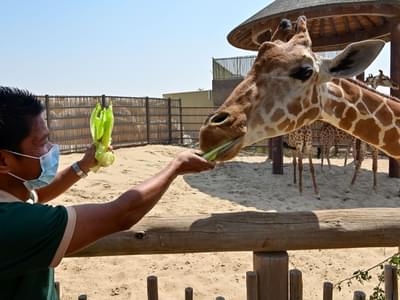
Visit the Dubai Safari Park and explore various ecosystems of animals spread across 6 different zones - Asian, Arab, African, Al Wadi, Kids Farm, and the Explorer Village
Indulge in various fun activities inside the Dubai Safari Park which include the Birds of Prey show, Giraffe feeding, Bird feeding, and many more.
Go on a fun-packed, educational Safari Journey which lasts around 45 minutes and brings guests up close to numerous animals.
Walk through the Dubai Safari Park and witness various rare species of plants and animals as you stroll through diverse sections of the park.
Book your Dubai Safari Park tickets online for hassle-free entry to the Park and avoid waiting in long queues.
- Individuals with SANAD (Saudi Aramco Nabors Drilling Company) Card will be exempted and can enter the park free of cost.
- Complimentary wheelchair service is offered at request.
- Outside food and beverages are not allowed inside the park.
- Alcoholic drinks are strictly prohibited inside the park.
- Minors must be accompanied by a responsible adult at all times.
- The last entry at the main gate of Dubai Safari park is at 3:30 PM.
- Super taxi service is available within the park which can be used for visiting the different areas and that charges AED 10 for adults and AED 5 for child for one way.
- Please wear comfortable clothing and shoes (shoulders and knees should be covered).
- You are required to respect the animals and park facilities. This includes NOT teasing the animals and not littering inside the park.
- Bicycles, pets, scooters, skateboards and roller skates, Balloons, balls, toy guns and flash photographs are not allowed inside the park.
- Remember to stay hydrated throughout your visit.
- People of Determination (people with disabilities) along with two companions can enter the park for free.
Why You Should Visit Dubai Safari Park?
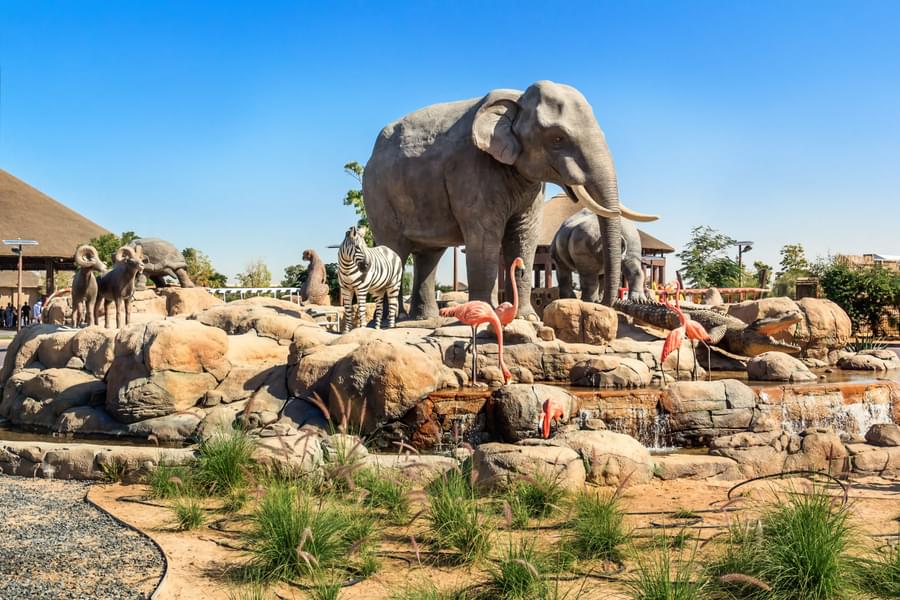
- Enjoy a unique experience of visiting this well-maintained safari park that houses over 3000 animals from across the globe
- Get your Dubai Safari Park tickets to explore the distinct ‘Villages’ or zones that replicate the natural habitat for animals from various parts of the world, whether they are grasslands or tropical rainforests
- From African Savannah and Asian Village to Arabian steppes and Wadi corner, the park promises a one-of-a-kind experience in each of its sections
- You can see animals from about 250 different species including tigers, lions, hippos, gazelles, hyenas, gorillas, flamingos, reptiles, chimpanzees, and much more
- Indulge in entertaining activities like going for an elephant or a camel ride, or feeding the giraffes
- For more thrill, use your Dubai Safari Park tickets to sit on board a powerful vehicle that will take you for a drive-through experience
- Appreciate the interactive park’s praiseworthy endeavors at conserving energy with its power-efficient facilities that make use of solar energy along with other tasks like breeding endangered species
- Make the most of your visit to the wild with kids where they can learn about different animals, their ecosystems, natural habits, and much more
- Kids can also enjoy the kids’ zoo here along with interactive games and activities.
Villages at Dubai Safari Park
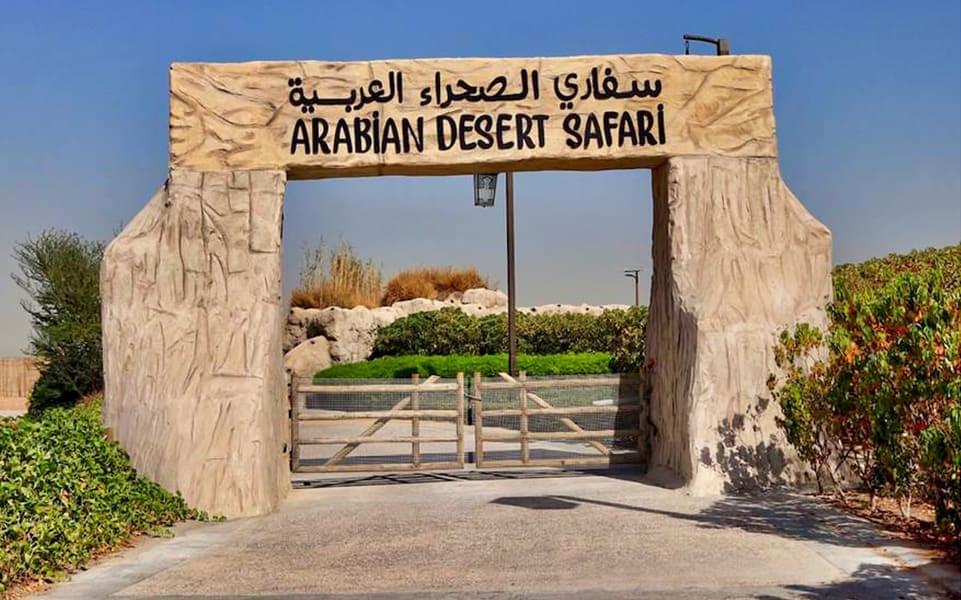
Visit the section of the park that showcases the beautiful Arabian desert wildlife with animals that range from the majestic Oryx and Arabian wolves to ostriches, gazelles, and much more. This is a drive-through experience that is reminiscent of the vast deserts of Western Asia and the Arabian peninsula, complete with images of historic nomadic desert culture.
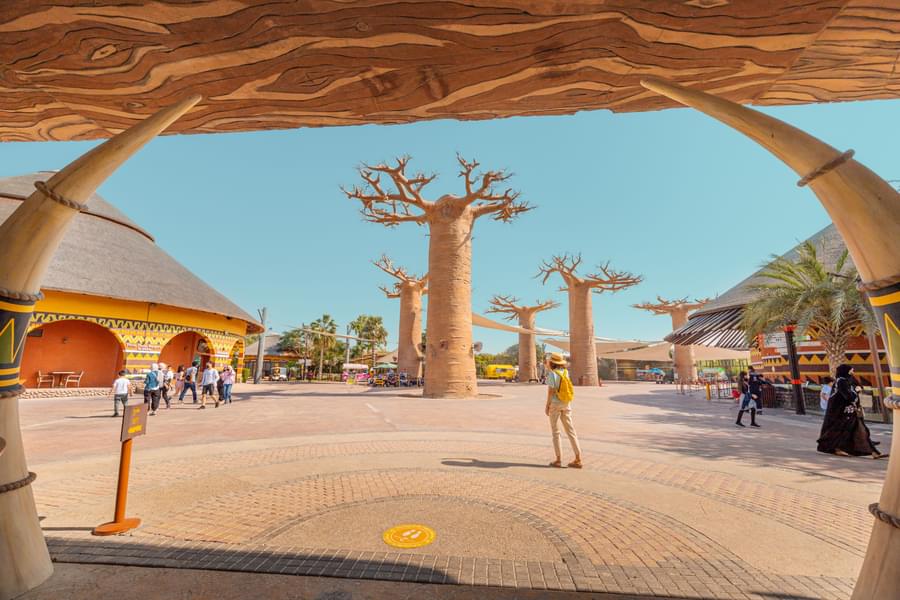
Enjoy a fun-filled tour around the Asian Village aboard a toy train with your Dubai Safari Park tickets. Here you can witness the diverse culture that this continent represents along with the influences of its ornate architecture. You will find animals that inhabit a range of habitats from forests to ponds like gibbons, moon bears, and komodo dragons.
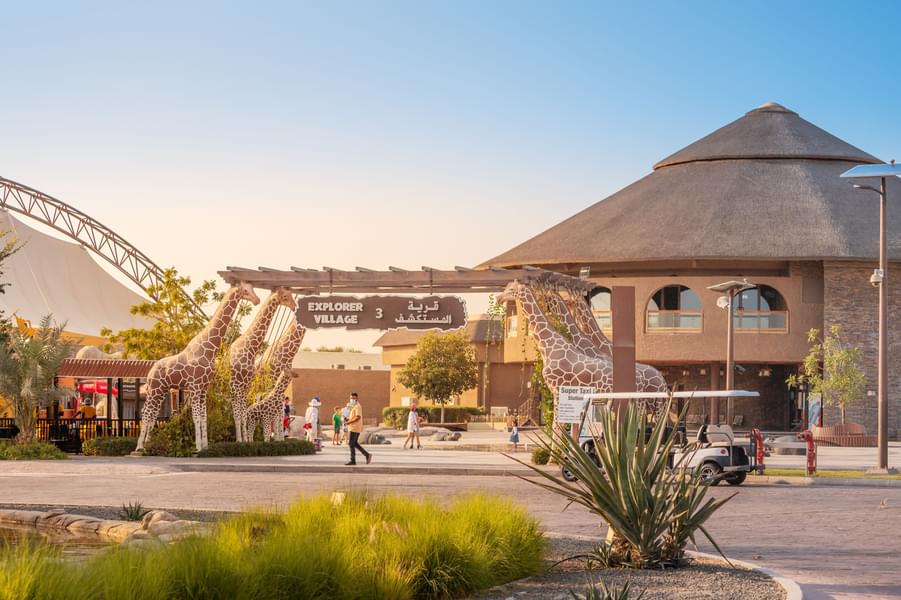
Embark on a veritable world tour right here with your Dubai Safari Park tickets that will take you deep within the African rainforests. Find some of the most exotic animals here like white lions, Chimpanzees, giant tortoises, and more. There are other creatures as well that represent the African continent like the Hippo, Okapi, Gorilla, African Lion, Lemur, Pygmy, Flamingo, and Bongo.
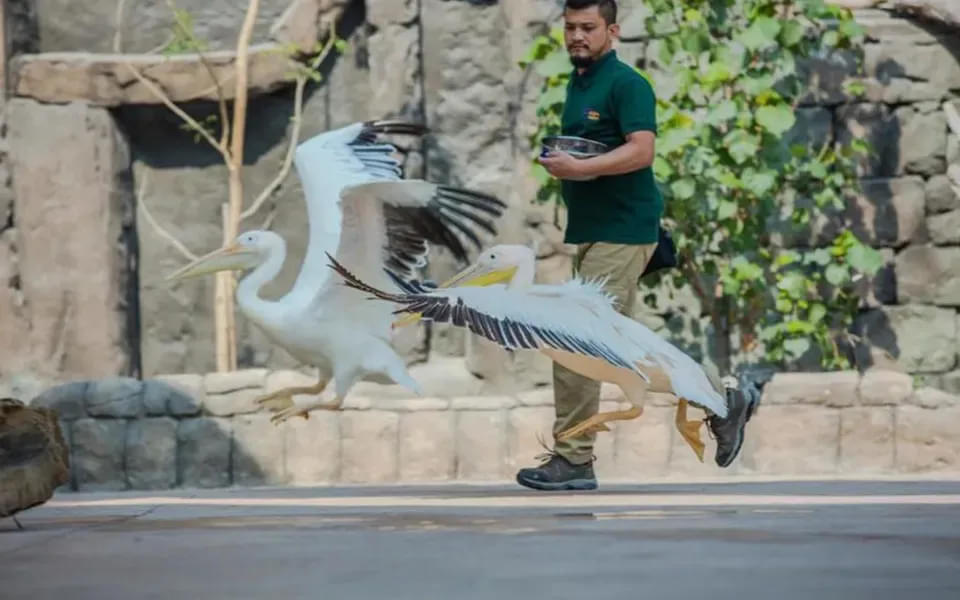
Book your Dubai Safari Park tickets today and head to its main attraction, the Explorer Village which showcases the best that the park has to offer. It represents the dense forests of Asia in conjunction with the African grasslands and houses majestic lions, tigers, antelopes, striped hyena, cape buffalo, Nile crocodile, and much more.
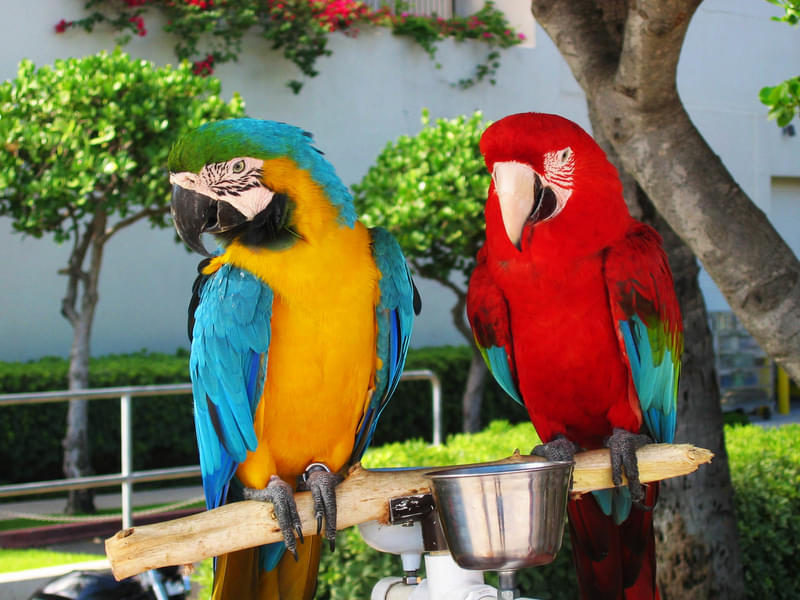
This is a veritable edutainment section where kids not only have fun but learn in a fun way about wildlife as well as engage in first-hand interactions with farm animals. While playing at the children’s playground featured in this facility, they can also enjoy the farm-like environment with ducks, chickens, sheep, ponies, and parrots.
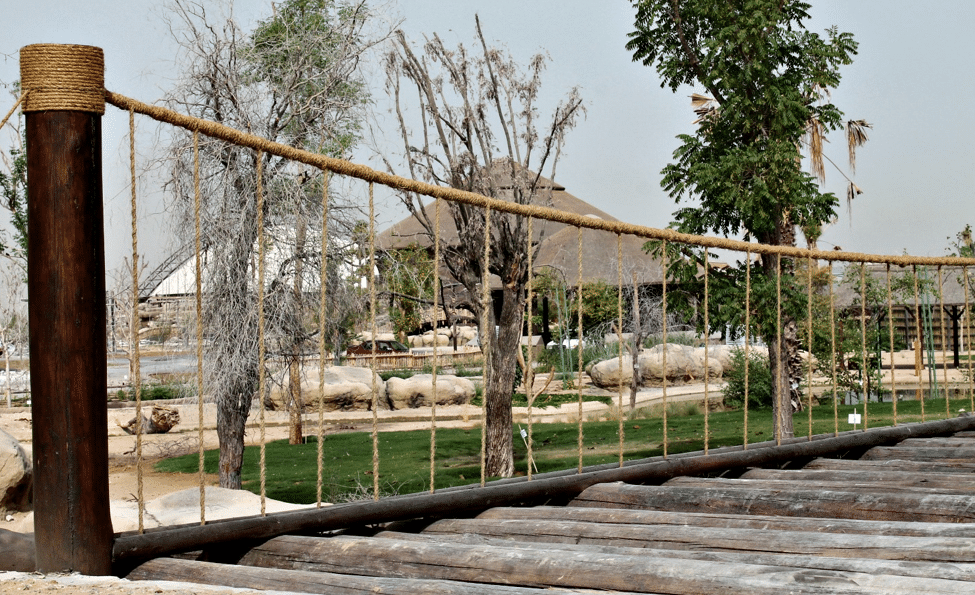
One of the most picturesque sections of the park, this is a location you can enjoy with friends and family by using your Dubai Safari Park tickets. From man-made streams and lush greenery, everything is beautifully maintained by the Dubai municipality. Known primarily for its scenic beauty, this zone replicates the beautiful Wadis or valleys of this region.
Discover Dubai Safari Park
Dubai Safari Park, located in the heart of Dubai, is a sprawling wildlife sanctuary that offers an immersive and educational experience for nature enthusiasts and families alike. Spanning over 119 hectares, it's a remarkable showcase of the world's diverse ecosystems and a hub for conservation and environmental education.
Dubai Safari Park emphasizes education and conservation, with informative exhibits and interactive programs that raise awareness about wildlife preservation. It's not just a recreational attraction but a place where visitors can connect with the natural world and appreciate the importance of protecting our planet's biodiversity.
Experiences at Dubai Safari Park
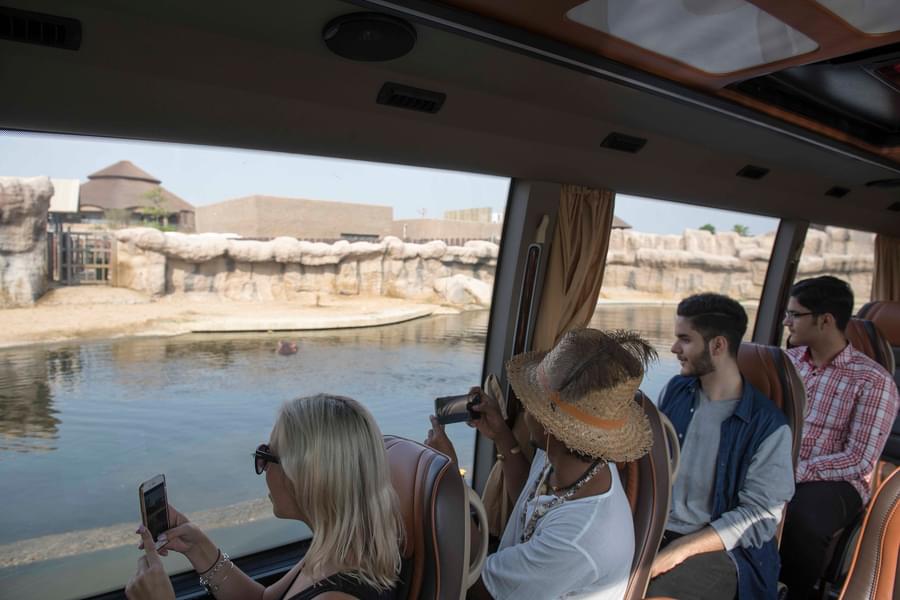
Embark on a drive-through adventure on one of the park’s Safari buses as you get the opportunity to spot exotic animals from Asia and Africa at close quarters. The knowledgeable park guides will make the experience more interesting with fascinating stories and fun facts. You can see animals like tigers, hippos, crocodiles, rhinos, lions, zebras, antelopes, baboons, hyenas, giraffes, and much more.
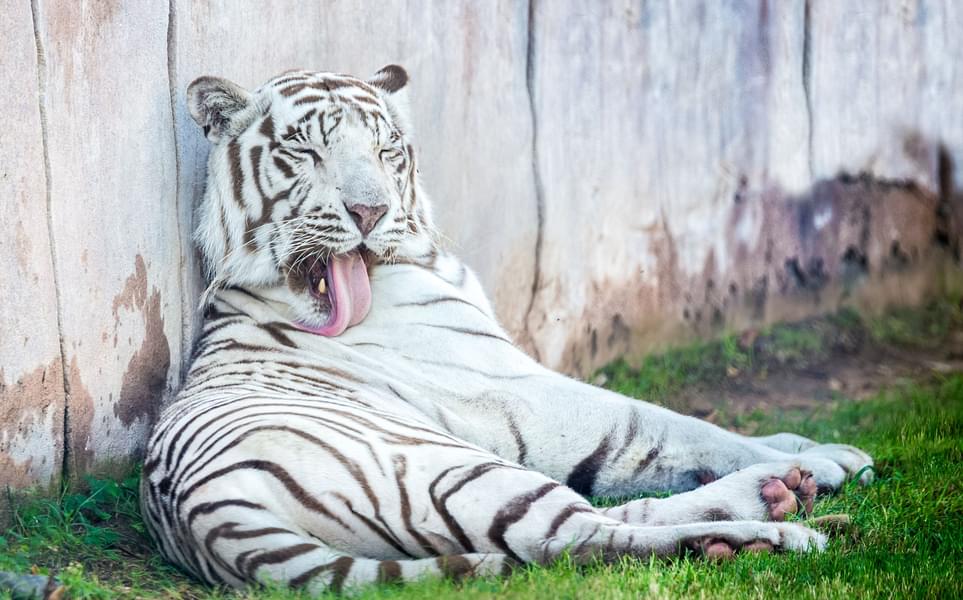
If you are looking for a special experience at the Dubai Safari Park, go for this luxurious package where you receive a ‘king-like treatment. Get driven around the park in a chauffeured car along with a personal guide who will provide you with all the interesting stories and fun facts about the park and its inhabitants. This package will also give you priority access to all the park’s facilities, exhibits, and reserved seats at bird shows.
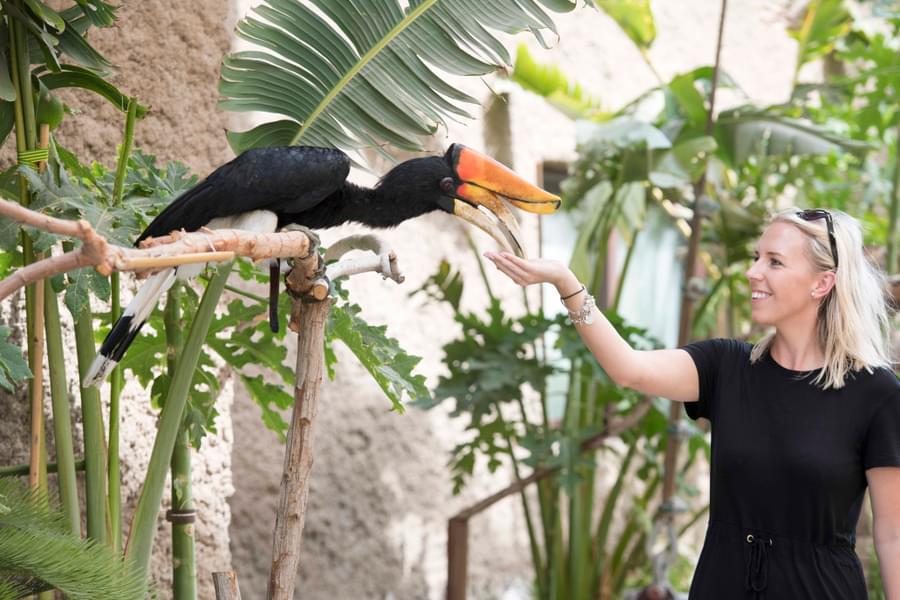
This is a popular Dubai Safari Park activity that is well-liked by families and people of all age groups looking for a unique breakfast experience. So start your morning on a distinct and positive note while enjoying a scrumptious breakfast with the feathered inhabitants here. Feed the birds and get clicked with them all the while under the keen guidance of a park animal caretaker.
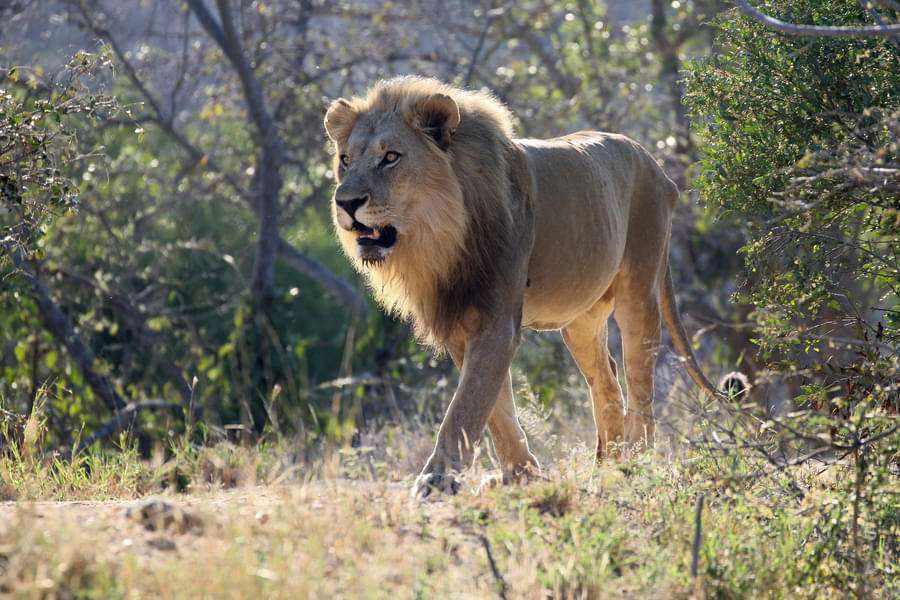
This is a unique and very exclusive Dubai Safari Park experience, especially for photography fans. Embark on a three hours long journey on the Safari Journey private bus that will cruise you around the park for that perfect animal shot you have always wanted to take. You will be accompanied by a guide who will help you in your endeavor to capture your once-in-a-lifetime shot.
Know Before You Go Dubai Safari Park
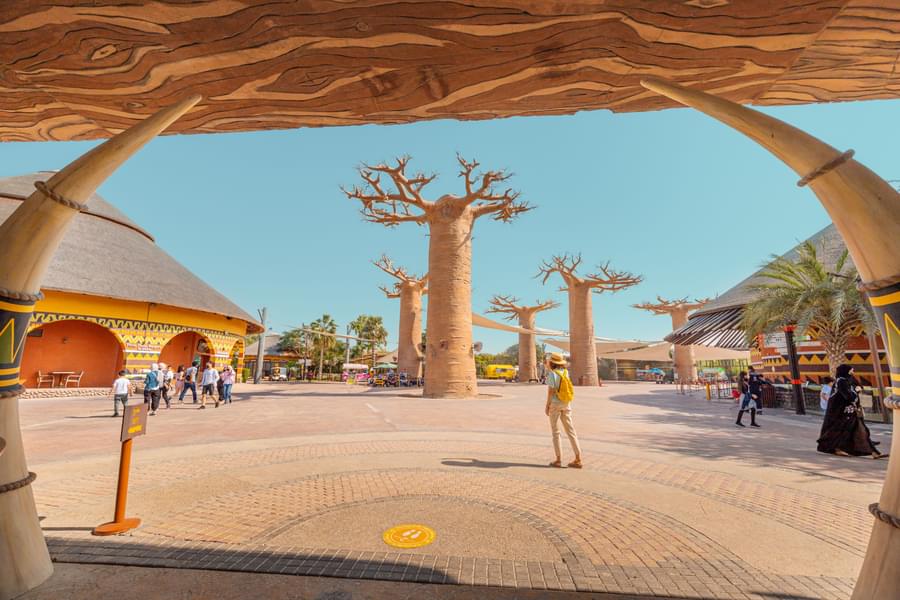
Opening Hours :
The Dubai Safari Park is open from 9 AM to 5 PM every day. The timings may however vary during the month of Ramadan.
How to Reach :
- Dubai Metro: The nearest metro station to Dubai Safari Park is Rashidiya. From here you can take a taxi to your destination.
- Bus: The nearest bus stop to Dubai Safari Park is Rashidiya. From here you can take a taxi to your destination.
- By Taxi: You can take a taxi from different parts of the city like Downtown Dubai or Dubai Marina to Dubai Safari Park that will cost your AED 55 and AED 90 respectively
- By Car: If you are visiting by car, you can access Gate 1 of Dubai Safari Park through Ras Al Khor Road (opposite side of Dragon Mart) and Gate 2 through Sheikh Zayed Bin Hamdan Al Nahyan Street.
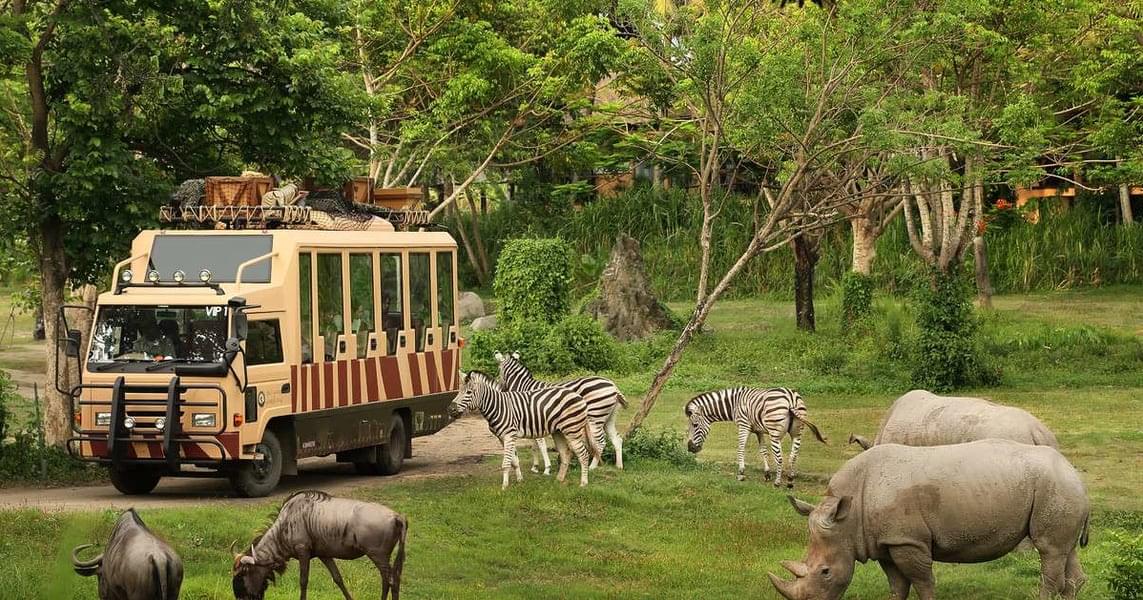
- Littering inside the park or feeding/teasing the animals is strictly prohibited.
- Bicycles, skateboards, scooters, and roller skates are also prohibited within the park premises.
- You are also not allowed to use balloons, balls, toy guns, drones, or flash photography as these may scare the animals.
- Smoking is restricted other than in designated smoking areas around the park.
- Consumption of alcoholic drinks is also prohibited here.
- Outside food, beverages, and pets are not allowed as this may affect the park animals’ safety.
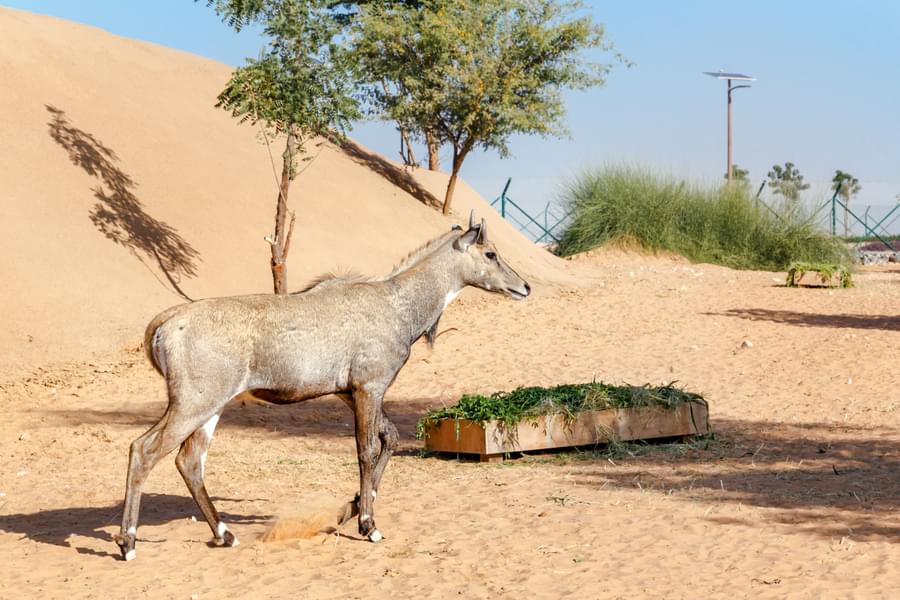
- All guests are subjected to screening by the park’s security team at the entrance for the health and security of the animals.
- Guests should be appropriately attired wherein their knees and shoulders should be covered keeping in mind the culture and sentiments of the country.
- Minors should be accompanied by a responsible adult at all times and all guests should pay attention to staff instructions at all times.
- The park has created a perfectly safe environment for visitors and does not take any responsibility for loss of goods or personal injuries whatsoever.
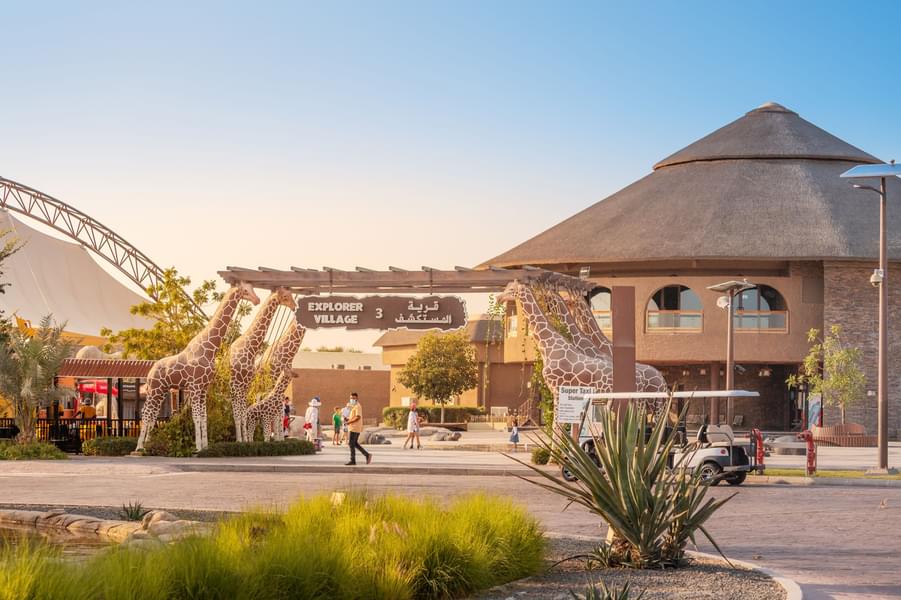
- The various facilities that Dubai Safari Park offers include toilets with bathrooms in each toilet block along with the ability to accommodate people of determination (POD).
- There is a facility for getting souvenir photos clicked during animal feeding sessions by the park’s photographers.
- Other facilities include wheelchairs, baby changing rooms in the villages of the park, prayer rooms at four different locations of the park, and first-aid with an in-house paramedic to attend to guest emergencies.
- You can access the Dubai Safari Park map and share photos on social media by using the park’s free Wi-Fi connection, and enjoy kids’ rides on mini cars that can be rented at the African Village and Explorer Village.
- There is a customer service desk, an information center, and lost and found assistance in case you misplace a belonging during your visit.
- Food and Beverages:There are 4 main restaurants located in different sections of the Dubai Safari Park. These are La Marquise, Bait Al Qadeem, Oregano, and Local House.
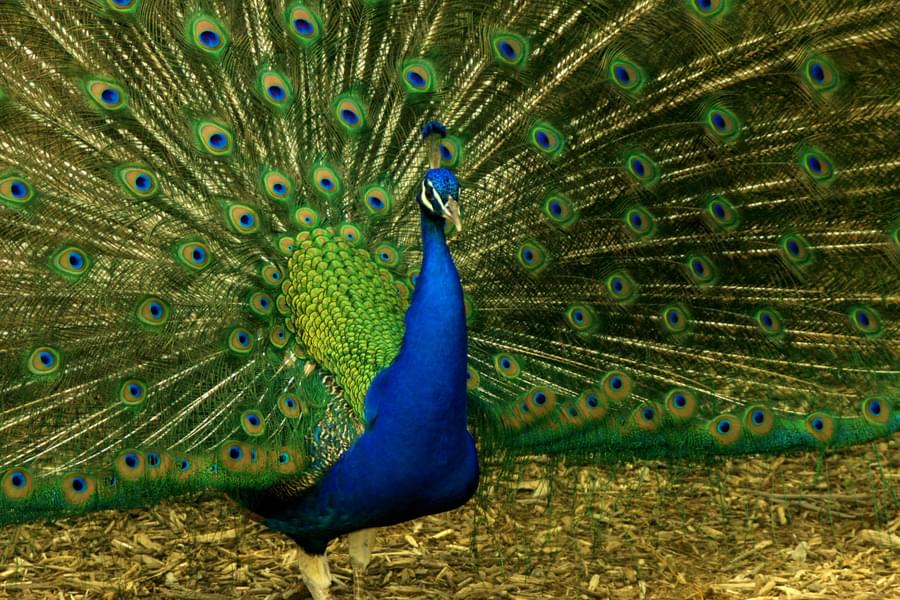
Dubai Safari Park organizes a variety of entertaining live shows like bird shows, birds of prey shows, goat feeding, bird feeding, etc. While you enjoy reserved seats with your Dubai Safari Park tickets for live shows, seating is available on a first-come-first-serve basis. Moreover, as all shows have limited seating capacity, the park has the right to withhold admission once seating is filled. The park also holds the right to delay or cancel live shows based on weather uncertainties, etc. without being liable to give refunds or adjust dates. They can also alter the content of live shows for animal welfare steps and their health, and security.
FAQ's of Dubai Safari Park
How long does it take to visit the whole park.
It usually takes about four to five hours to tour the whole park and see everything that the Dubai Safari Park offers. However, this duration varies from guest to guest and the activities selected by them for the tour.
Is there a specific dress code to enter the park?
Although it is recommended you wear comfortable clothing and shoes, all guests are to be appropriately dressed to enter the park failing which they will be restricted entry at the gate. Shoulders and knees should be covered at all times and dressing should be keeping the culture and sentiments of the country in mind.
Also Checkout: Dubai Dolphinarium
What’s the best time to visit Dubai Safari Park?
The best time to visit Dubai Safari Park is in the early mornings and early evenings. This is when the weather is the best for trekking through the park and enjoying all its activities.
What are the different types of animals at Dubai Safari Villages?
- Arabian Desert Safari: Mountain gazelle, Scimitar-horned Oryx, Addax, Arabian Oryx, Arabian gazelle, Sand gazelle, and Arabian Wolf
- Explorer Village: Cheetah, Baboon, Zebra, African buffalo, Ostrich, Blackbuck, Nilgai, Hippo, South Africa Giraffe, Giraffe, Sarus cranes, Guineafowl, and Sambar Deer
- African Village: Chimpanzee, Peacock, Gorilla, Afro Asian Sand Snake, Carpet Python, Patas monkey, Vervet monkey, Ruffed lemur black & white, African Elephant, and more
- Asian Village: Black bear, Orangutans, Komodo dragons, Gibbon, Southern Cassowary, and Mandarin Duck
- Al Wadi: Duck, Peacocks, Swans, and Pelicans
- Kids Farm: Local duck, Love bird, Najdi sheep, Pony, Amazon parrot, Donkey, Eurasian bullfinch, Cockatiel, and more
Do Checkout: Dubai Garden Glow
Explore Dubai
- Attraction Tickets
- Amusement Parks
- Dubai Restaurants
- Combo Tickets
- Monthwise Guide

The content and images used on this site are copyright protected and copyrights vests with the respective owners.

Welcome to a sun-soaked metropolis like no other
Plan your dream wedding in an unforgettable destination
Discover the city's insiders, influencers and innovators
Every district in Dubai tells its own unique story
Admire the city's traditional arts, crafts and cultural gems
Get more out of your holiday with these guides
Escape to the hills and explore nature
Answer the call of the wild and experience desert thrills

Uncover the city’s rich heritage and vibrant arts scene
Embark on thrilling new adventures for all ages
Taste award-winning world flavours and local cuisine
Visit the latest hotspots, openings and attractions
Find new surprises at modern malls and traditional souks
Marvel at record-breaking venues and iconic landmarks
Unwind at Dubai's luxury spas and wellbeing havens
What do you travel for? Find inspiration with our itineraries

Book a table at these fresh hotspots
Taste a deliciously different side of Dubai
Discover our homegrown culinary heroes
See all the restaurants unveiled in the Dubai selection
Weekends in Dubai are for feasting
Explore Dubai's plant-based concepts that impress
Reserve a table at top restaurants for incredible prices
Browse through our listing of restaurants

Don't miss a beat – live concerts, festivals, activities and more
Follow the flavours to the city's most-awaited feast, featuring your foodie favourites
Gear up for 10 days of non-stop laughter
Keep your controllers ready for the ultimate gaming festival

Plan ahead for a hassle-free travel experience
From etiquette to currency, we answer all your questions
Use our tool to book flight tickets to Dubai and plan your trip to the city
Dubai has an incredible range of stay options for every budget
From take-off to touchdown, navigating Dubai is a breeze
Your complete guide to enjoying one of the world's safest cities to the fullest
Find out all about Dubai’s climate throughout the year with our weather guide
All you need to know about the dirham, from exchange rates to helpful tips
Helpful information for travellers with special needs
Unlock huge savings with pre-paid access to top spots
Get our apps for the latest attractions, events & itineraries

Save big with great offers on Dubai's top sights and activities
Indulge in retail therapy for less with big discounts
Enjoy a trip to Dubai with incredible accommodation offers
Sign up for kid-friendly activities or attend a live show with the entire family
Get tickets to the best concerts featuring A-list artists at world-class venues
Join Dubai's community sporting activities and race to the finish line
See the maestro perform his hits live at the Coca-Cola Arena
Make way for the region's largest affordable retail art fair
Related Sites
Add items to your Top Picks by clicking the heart icon as you navigate through the website
This is now in your Top Picks!
Login or create an account to save your favourites and receive personalised recommendations.
Login to like
Sign in or register to like this content
- Visit Dubai
Discover the best of Dubai Safari Park
Tue, February 14, 2023
Enjoy a thrilling day of animal spotting at Dubai's family-friendly wild attraction.
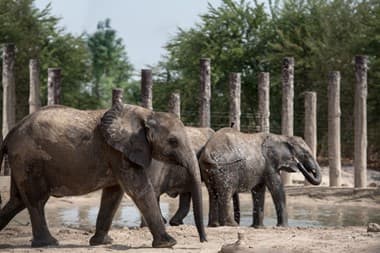
Elephants at Dubai Safari Park
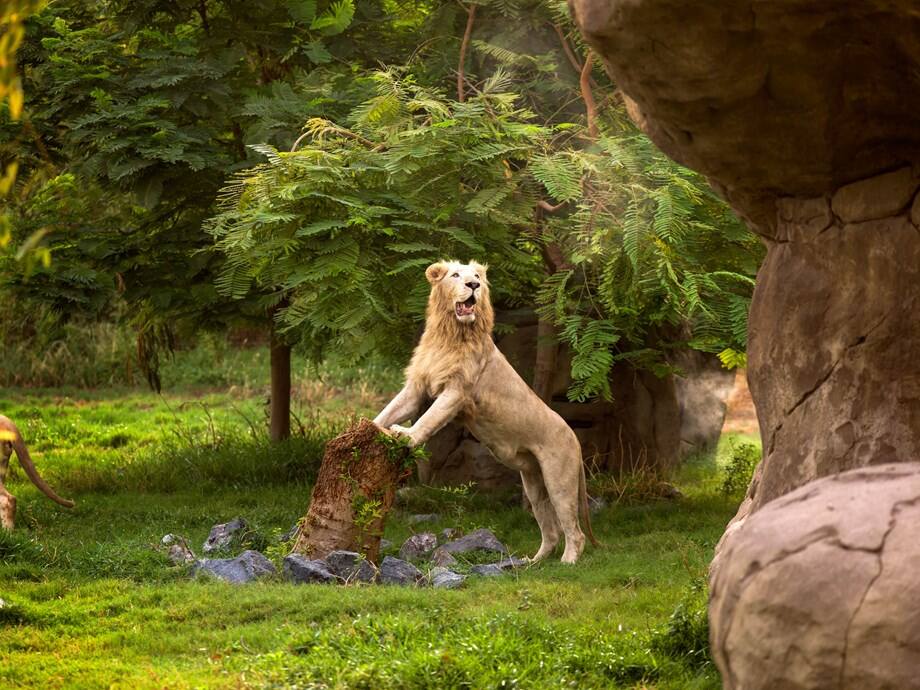
The white lion
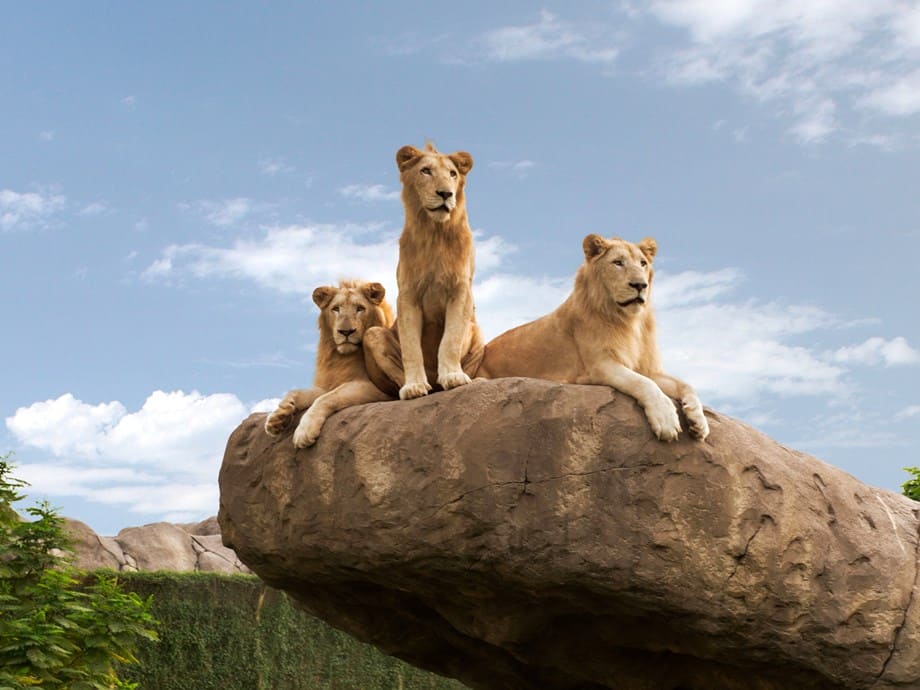
A pride of lions
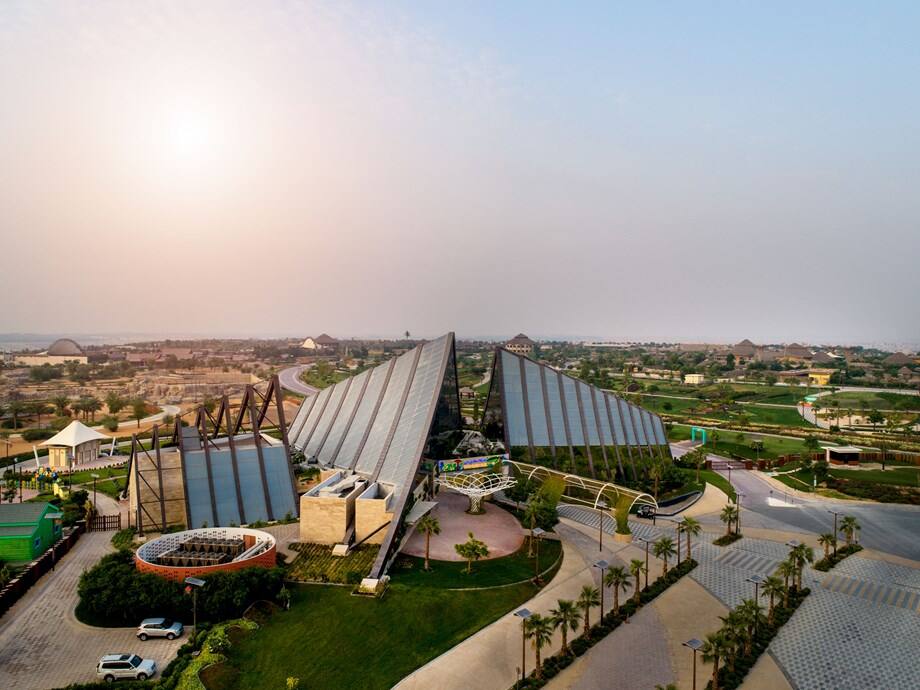
A view of Dubai Safari Park
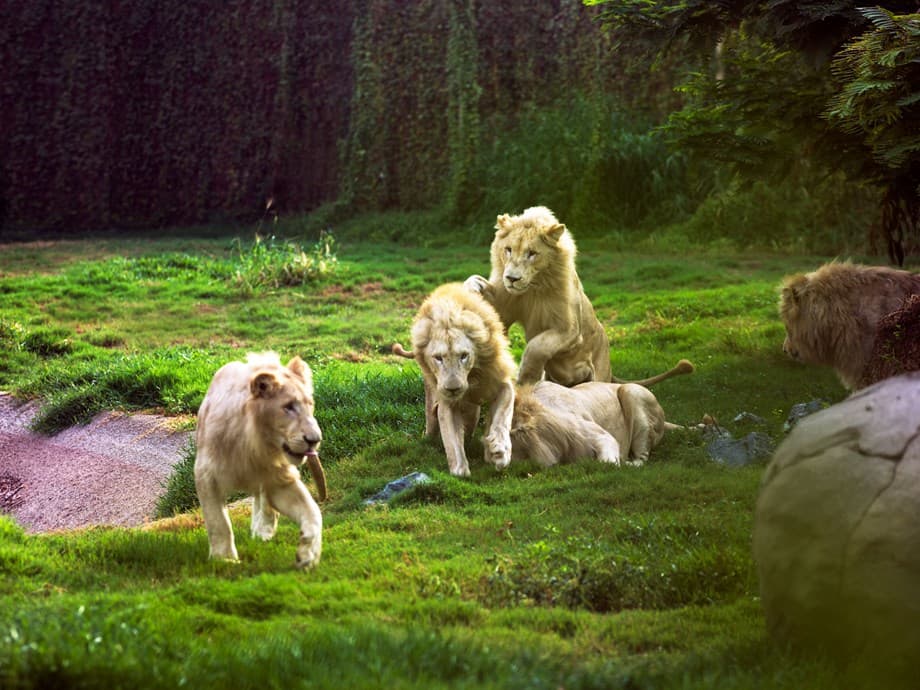
The lions lounge at Dubai Safari Park
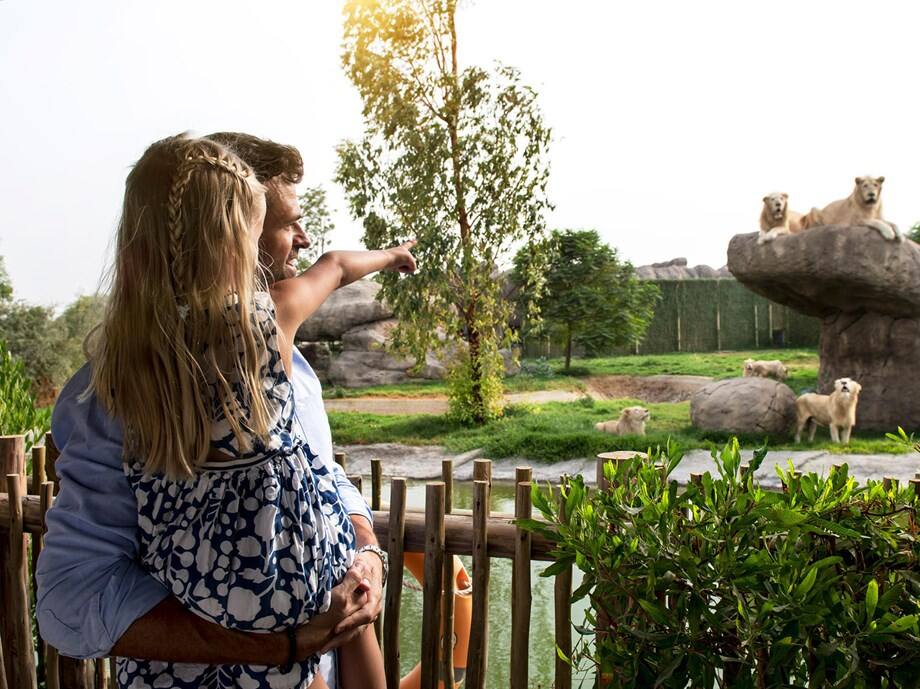
The little ones will be entertained by all the magnificent creatures
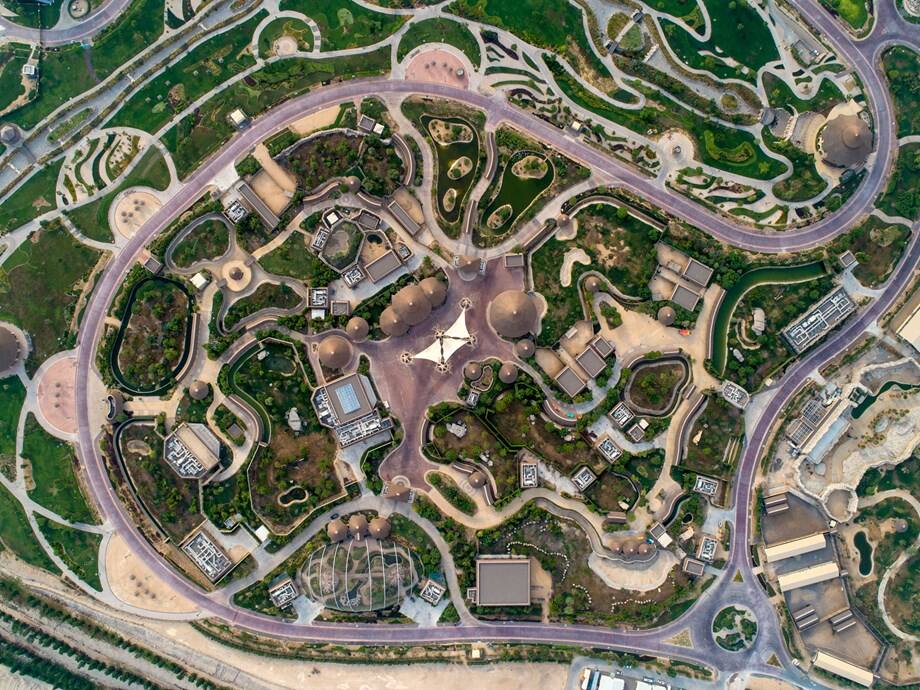
Dubai Safari Park aerial view
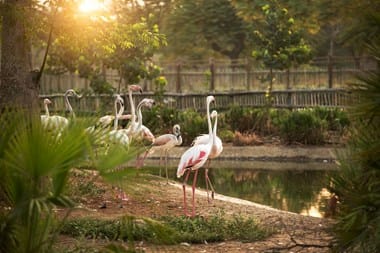
See the Flamingos in the African Village
Do you like it? Share it
Recommended reads.

- City Sightseeing
- Dinner Cruise
- Luxury Yachts
- Things to do in Dubai
Dubai Safari Park
Dubai is considered to advance its frontiers with upcoming projects and unforgettable attractions in real estate developments. One such project is the Dubai Safari Park, which animal lovers would undoubtedly enjoy. Over 119 ha, more than 2,500 animals are housed in the Dubai Safari Park. You will find them here: tigers, elephants, giraffes, moon bears, and camels. The Park consists of Explorer Village, African Village, Safari Arab Desert, and Asian Village. Animals originating in these regions are found in each field. You will be brought to the Asian jungles, Arab deserts, African rainforests, and more. Safari Park Dubai is a lot more than a zoo. It’s a nature park, animal refuge & college, all wrapped in one location. Book a desert safari Dubai trip to explore the Dubai desert and many thrilling activities.
About Safari Park Dubai
In the Dubai Safari Park, you will discover the various zones and habitats of the animals and watch animal displays in two different theaters. It is time to take part in an experience with wildlife at the new Dubai attraction. Children can communicate with and understand more about animals in a particular field. The Park takes about 8 hours, and the interest is more than enough for your entire day. Choose between your general ticket and the Safari Journey Kit Travel in the various areas on an eco-friendly solar-powered vehicle and spend the day taking advantage of the exclusive Safari Park experience in Dubai. The Park is enjoyable for children in Dubai with special events, families, and new visitors. Dubai offers many other things to do in Dubai and unfilled tourist activities.
The Park utilizes new immersive approaches to ensure guests a unique and distinctive experience in its monitoring and activity. Dubai Safari Park is a complete interactive wildlife experience that starts at the gate with animals such as lions, tigers, cheetahs, elephants and bears, and many more. Step into the Dubai Safari and see for yourself the enchanted world. See the numerous ecosystems, villages, and varied flora and fauna surrounding you when visiting the areas of the site. You will also take part in immersive exhibits besides seeing the animals.
Safari Park Layout
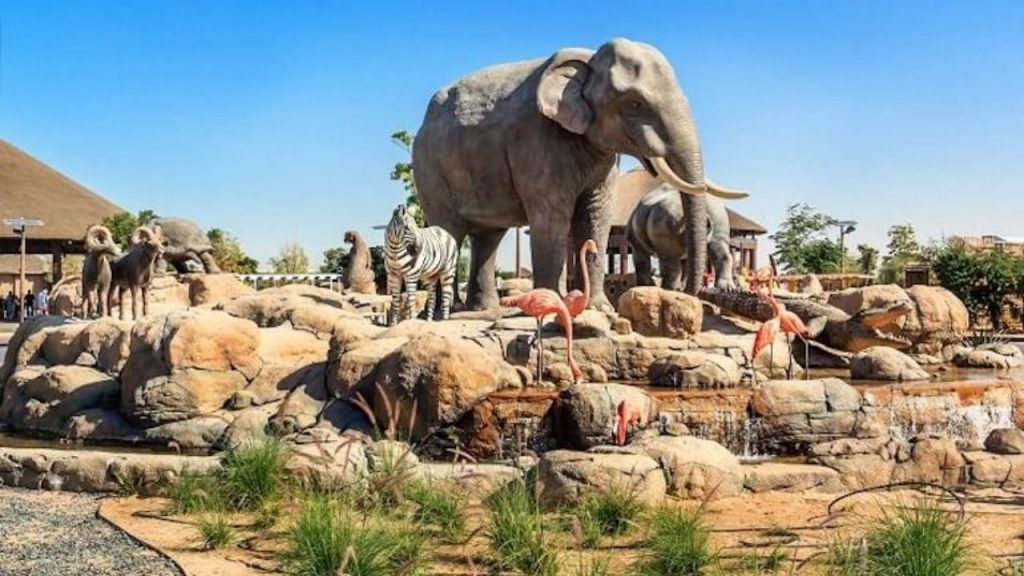
The Dubai Safari park spans 119 hectares and is vast. There is a whole fleet of ecological vehicles to ease transportation, including trains, buses, and cars in the Park. Solar energy is the Park’s primary source of energy. Strong structures are also used to recycle water for drainage and waste management in the Park. This new safari park is a replacement for the half-century-old Dubai Zoo. In all the villages of Safari Park, there are rare and essential species. The Park is built on a vast 119-hectare field. The fence is 3.5 kilometers long from Dubai Safari Park. If your encounters need to be improved, go to the Safari Journey Kit, which provides access to all the items in the entrance ticket and an exclusive safari show to explore African and Asian animals in Dubai Safa.
Safari Park Opening
The Dubai Safari Park opened to the general public for the first time on 12 December 2017. The Park was opened for a limited day and had free admission to the public. This free entry was for two weeks in Dubai Safari Park. Due to its redesign and upgrade on 15 May 2018, the Park was reopened. The scheduled reopening schedule for parks was 1 October 2018. The animals have also been imported from Asia, the USA, Africa, etc. With 119 hectares and more than 2500 species, the Park was built for approximately $270 million. Dubai Safari Park is closed and only sheltered after five months of upkeep. When the Dubai Safari Park invites visitors, there is no set date.
Safari Park Reopening
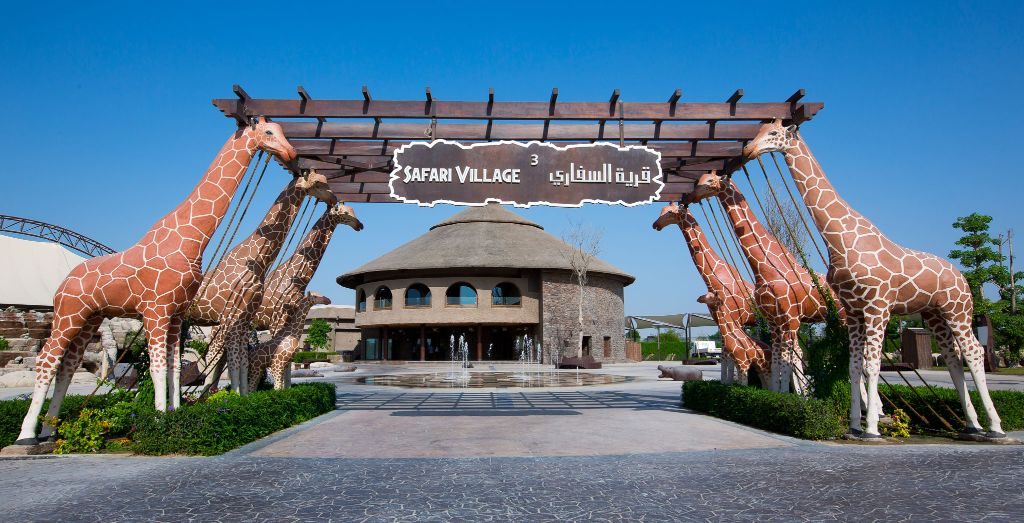
The Dubai Municipality announced a reopening of the Dubai Safari park on 5 October with new actions aimed at safeguarding visitors from coronavirus attacks. The reopening of the Park, a crucial component of the Emirate’s tourist attractions list, said Dawoud Al Hajri, the general manager of the municipality of Dubai. The reopening of the Park illustrates how easy it is to rebound on the tourist market. The social intervals of 2 meters, with stickers on the floors to direct guests, are strictly applied. Sale devices in the Park also sell masks and gloves while every tourist gets hand sanitized. The opening is accompanied by an ambitious redesign and expansion process intended to extend the Park’s infrastructure and improve the visitor experience.
New Addition in Safari Park Dubai
New programs have been added to improve the tourist experience, such as animal food, cultural awareness, and seasonal events. The latest Dubai Safari also has a group of new species in wildlife and educational reserves, including African elephants and giraffes. The Park has unusual animals like the Komodo dragon, antelope with a spiral tail, Arab oryx, gorilla, bongo, and lemur, a spotted African wild dog. On air-conditioned S trains, tourists can travel across the Park. A bus tour in the Village Explorer also offers tourists an opportunity to experience animals from Africa and Asia.
Park Location and Features
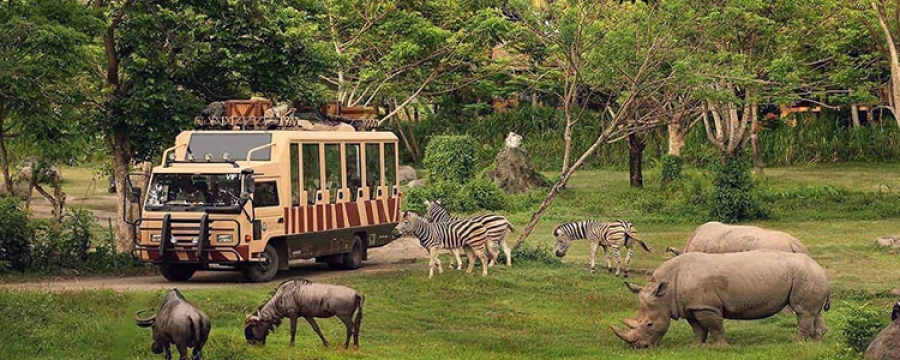
It’s situated in Dubai’s Al Warqa 5. The location of Safari Park is deliberately selected to suit the temperament of the animals so that they can readily adapt. You can get there by metro or bus from the Park near Al Warsan 1, Eppco 2 bus station, and metro line 1. Dubai Safari’s address is straightforward; you should take the metro or bus. This famous Park delivers all the facilities you want to make it more fun and memorable with this beautiful experience. The Park is fully featured with restaurants, Children changing rooms, Toilets, Kiosks, Prayer rooms, Souvenir shops, and First aid.
Safety Measures in Covid-19
At the Safari park in Dubai, for protection, all tourists are asked to keep their social distance from other guests at least 2 meters. Before reaching the Safari Park, thermal cameras were mounted with compulsory temperature controls. In different locations inside the building, signage and floor marks give visitors helpful safety guidance. From 5 October, the Park’s sales equipment will now supply visitors with goggles and gloves. Each visitor is supplied with hand sanitizers, on the other hand.
A complete experience has been implemented for the tourists in activities such as animal feed, educational projects, awareness programs, and seasonal events. Since its reopening, the Safari Park in Dubai has had a group of new species, including African elephants, giraffes, an animal reserve, and a training center. The Komodo dragon, Arab Oryx, Gibbon, bongo, and lemur are some of the few. Climate trains would help visitors quickly transport the Park. Bus rides are also provided under the latest protection rules, allowing guests to experience African and Asian animals.
Safari Park Dubai Timings
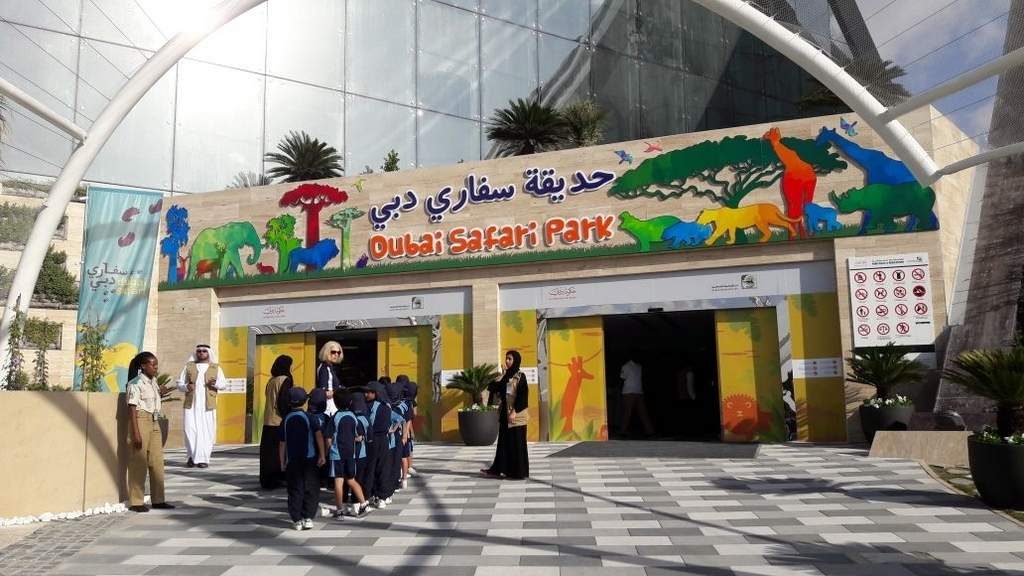
Many people want to know about Dubai Safari park’s timings for a visit there. The Dubai Safari is open from 9 am to 9 pm except for the safari village. The time is from 9 am to 7 pm for the Safari village. The visitors’ entrance closes two hours before each section closes. After 5:00 pm, the tourists cannot reach the safari or enter other areas of the Park after 7:00 pm. It took about five hours to look around the Park. When entering Dubai Safari Park, tourists must keep the timings in mind. The time for the village of Safari is 9 am to 7 pm.
Safari Park Tickets
From various choices between Dubai Safari park tickets, visitors can select Dubai Safari Park tickets, such as entry tickets and all-access tickets. These tickets guarantee that visitors receive these tickets immediately in the Park. You have to display the ticket at the e-ticket desk on your cell phone. Four areas with a wide variety of animals are available to select from. It is possible to access all areas of Dubai Safari Park and have an age identity for children younger than three and older people older than 60.
Safari Park Ticket Prices
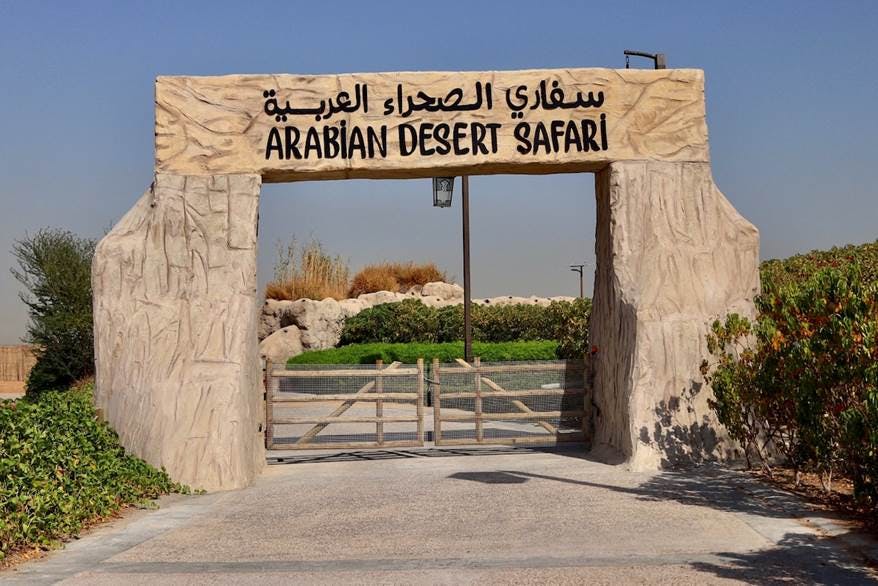
In the case of Dubai Safari park ticket price, the tickets at the launch of the Park were free of charge, but now the tickets are just AED 50 for entire tours, including safari village. Children’s tickets cost AED 30 for full tours like Safari Village, and AED 20 is only available if you exclude the Safari Village. However, the timings of Safari Park Dubai during this corona time are from 9 to 5 for both families and kids.
Safari Park Parking Area
There are two styles of parking at Safari park Dubai. There are 3500 free parking spaces around Safari Park in Dubai. VIP parking is charged for the other form of parking. AED 50 per car is the parking ticket. The Dubai Safari Park area is 119 ha, or 12,8 million square feet or 1.2 km2, or 12,8 million square feet. This location is around 223 soccer fields comparable. The field is twice as wide as the Vatican City.
Safari Park Management
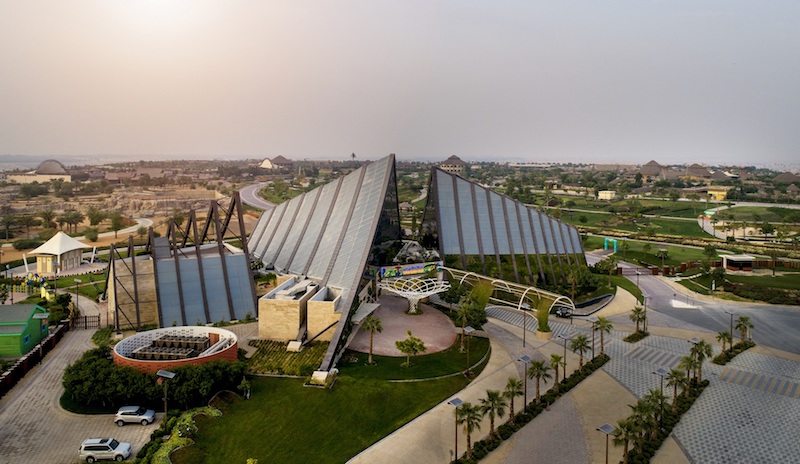
Regarding its management, In 2018, the municipality of Dubai took on the responsibility of contracting a business known as Meraas for the management and operation of Dubai Safari Park. The firm changed its operating workforce and appointed Mr. Parques Reunidos, one of the most popular animal park operators. In Dubai desert Safari his nomination is seen as a significant change in the future.
Animals at Safari Park
The safari park in Dubai is unbelievable, as it’s a sophisticated wilderness park plus an animal retreat center and education center. All about you are such natural beauty that you are more than confident to visit.
Global Fauna at Safari Park
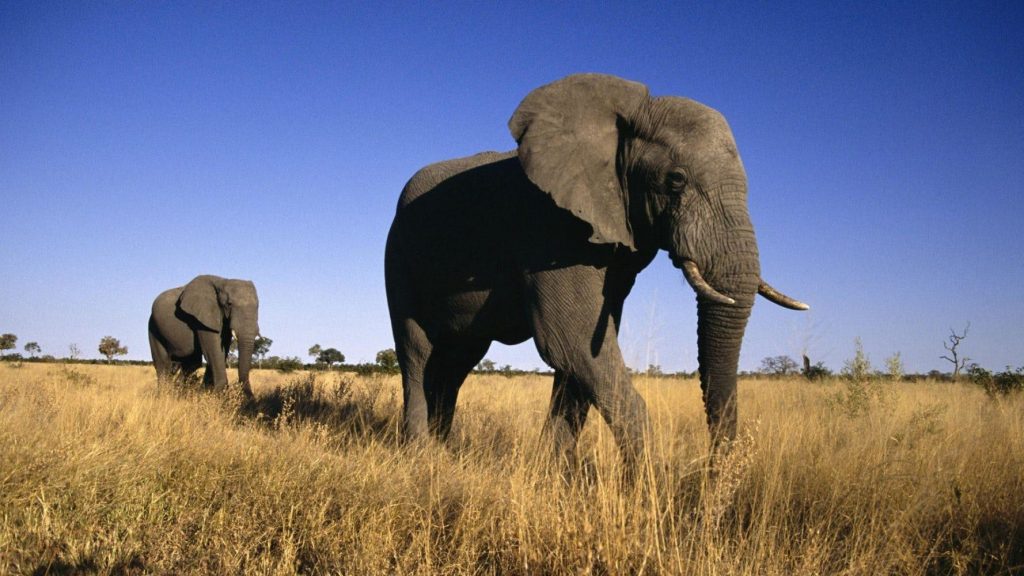
It has more than 2 500 species worldwide. The expansive sanctuary shows magnificent lions, tigers, giraffes, moon bears, camels, and more. The Park has been smartly broken into four regions – Explorer Village, African Village, and Asian Village. Animals that originate in these regions can be found in each field. Children and adults are frightened as they are taken to the Asian jungles, the African rainforests, the Arab deserts, etc.
Wildlife Animals at Safari Park
One of Dubai Safari Park’s most remarkable features is its interaction programming collection. It gives adults and children chances to encounter a wide range of exotic animals close by and individually. Join the Dubai Safari Resort and learn about animal welfare and safety through an all-inclusive nature experience. True to its name, you will go straight into the enclosures with this ticket.
Plants and Animals at Safari Park
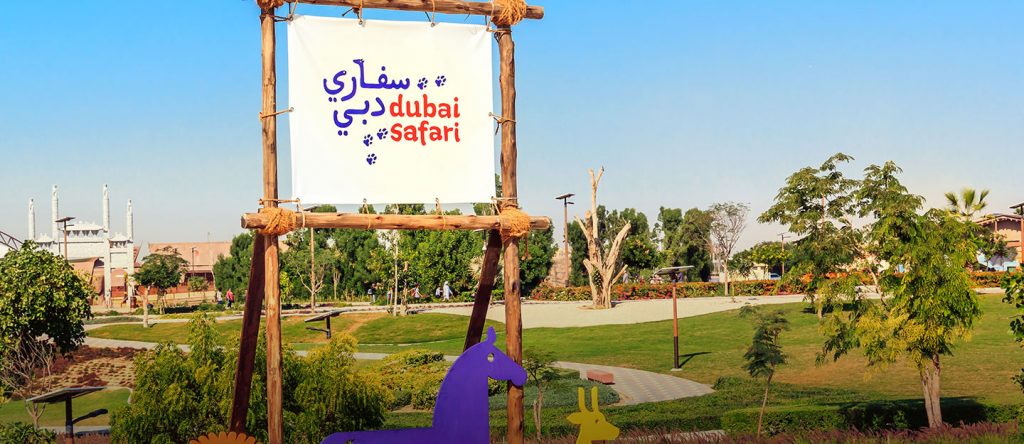
In the center of the animals and plants natural environment, the whole experience is even more true. The Dubai Safari Park is spread over 119 hectares, with a wide variety of animal species around the globe and over 2.500 birds. Gazelles, Arab wolves, tigers, flamingos, komodo dragons, baboons, and Nile crocodiles. You will need wavelengths to wave into gazelles. Tell the children to sense and detect which animal the excursion takes inside the enclosure.
Things to do at Safari Park
Visitors can take a special bus tour in Explorer village and take around the attraction with state-of-the-art air-conditioned trains. The Park utilizes renewable infrastructure and policies that encourage eco-friendly electricity with solar panels. In the background of the COVID-19 crisis, robust initiatives such as infrared cameras, remote social control, and hand sanitization will be introduced.
Dubai Safari Park Villages
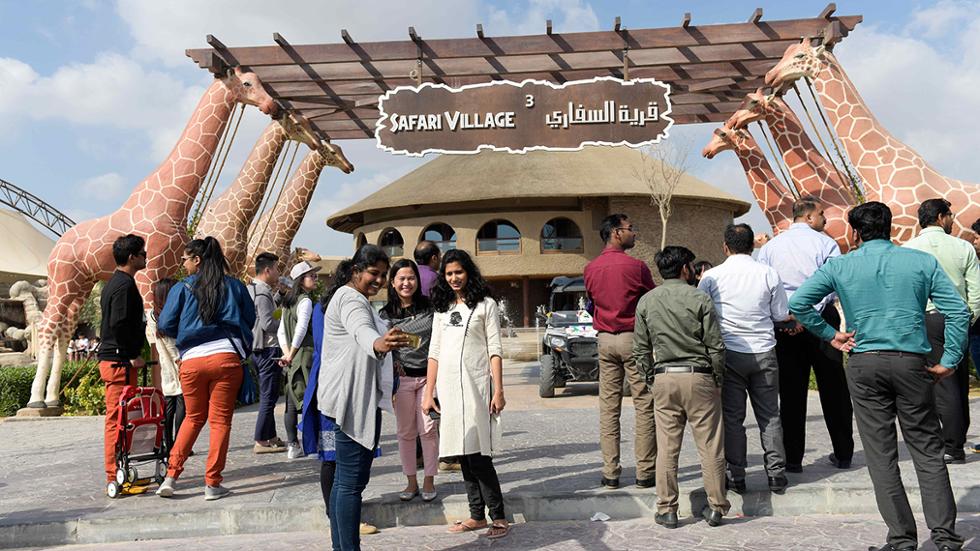
The Dubai Safari Park gives its stunning lakes and green scenery the first glimpse. The safari is 119 hectares in four villages, with a special topping and animal population. The Gargantuan property is one of the places to hang out with your children in Dubai, with a stream of environmentally friendly cars. The 119-acre Dubai Safari Park now houses an increased population of 3,000 birds, reptiles, invertebrates, and amphibians. Various changes were made to boost the tourist experience in the renovated facility.
Arabian Village
You will be delighted with the overwhelming assortment of flora and fauna on view if you move through this village’s sandy deserts, rocky mountains, and lush wild pasture. Take care of the cats, antelopes, and nilgais that live here. Important species like bears, nylghais, and antelopes live here in Arabia. It is inspiring to see this village. You will be surprised by scenes when you drive through the green regions of the mountains and the desert with a wide variety of fauna and flora.
African Village
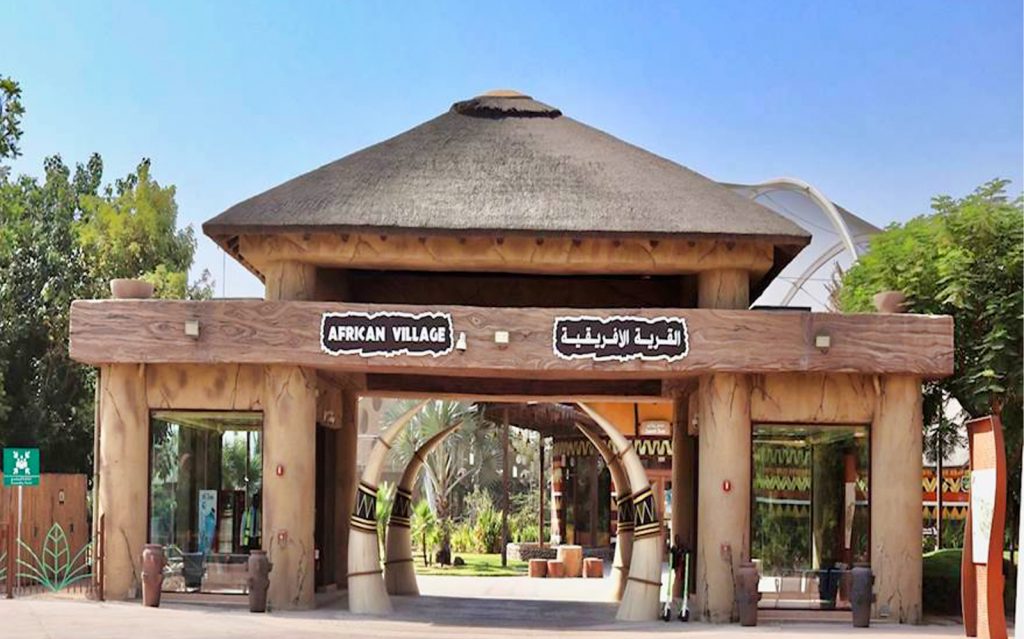
The African Village provides an authentic experience of the African landscape accompanied by baobab trees and the conventional constructs of mouth. Here, you will encounter several African-born snakes, chimpanzees, monkeys, and elephants. A large selection of snacks and other reptiles from all over Africa is displayed in the reptile building. The African Village also has the most prominent aviary display in the UAE. The African Village, the home of many exotic animal species, such as magnificent white lions and African giraffes, is also an outstanding destination in Safari park! Attraction in the Park is the pachyderms. The guides point the animals out as you walk through the village, making the trip more enjoyable. Don’t miss your first visit to the reptile building.
The African Village, one of the most exotic animals on the continent, is unsurprisingly one of the points of interest in the Dubai Safari Park. African wild dogs, giant tortoises, chimpanzees, and royal white lions have been discovered in the village separated into African Savannah and Rainforest.
Asian Village
This is the Dubai Safari Park tree-based segment. Komodo dragons remain in this village forever. In this area of the Park, there are a variety of birds and reptiles. The Asian Village houses common native species of Eastern Europe, ranging from tigers to gibbons and moon bears. Visitors from the manuals and specialist guides of the Park will learn fascinating things about animals. It would help if you walked through the thick trees of the enclosures, leaving the wheels in the Asian Village. Along with several birds and reptile animals, gibbons, luna bars, and komodos are endemic to lush Asian forests.
In this place, an Asian village testifies to Asian fauna and flora. They host a variety of exciting species, such as moon bears and dragons. Here you will also find Orangutan, an endangered species in Asian countries. A significant theater with various shows every day is one of the highlights of the Asian town. These displays include shows by monkeys, raptors, and several animal performances.
Explorer Village
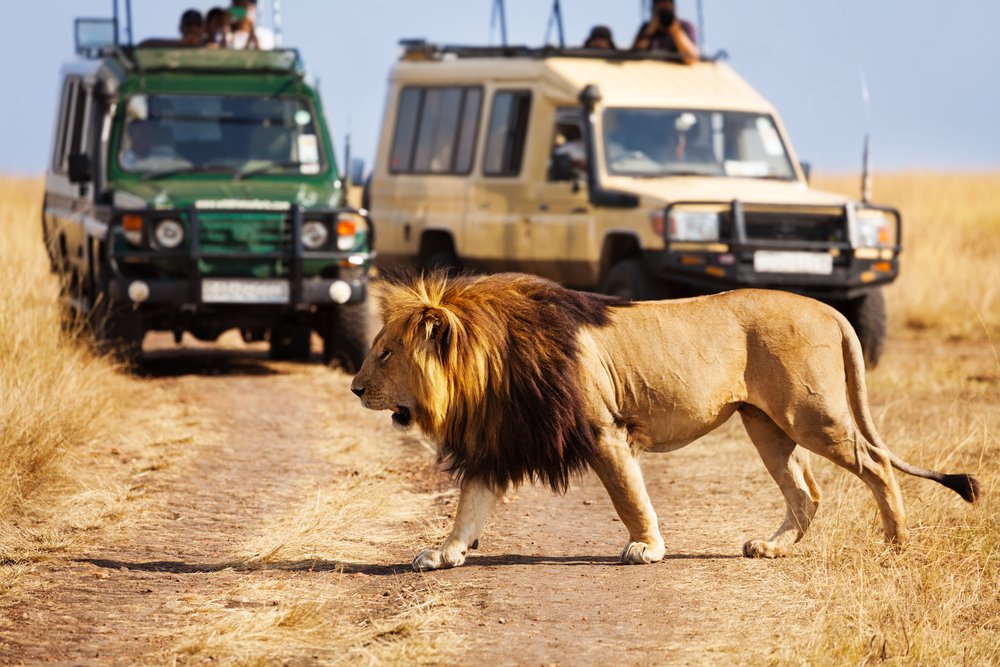
The key attraction in the Dubai Safari Park is the Safari tour in the Explorer Village. The standard open safari takes you to the jungles of Asia and Africa to greet their animal inhabitants. Tourists can tour the village in specially built cars to discern many animal species, such as zebras and water buffalos. Families enjoy the ghetto and can see the frizzy beasts in play. There is also a hippo aquarium, a giraffe platform, and a bird’s showroom.
Safari Park Journey Package
The Safari Journey Kit provides access to all areas specified in admission tickets. The Asian Village, African Village, Arab Desert Safari, Kids Farm, Wadi region, and Explorer Village are all about. You will also engage in immersive activities such as bird displays and giraffe feeding. Furthermore, a 45-minute safari ride can take you from the Park on the Safari Bus, where animals from Asia and Africa can be seen.
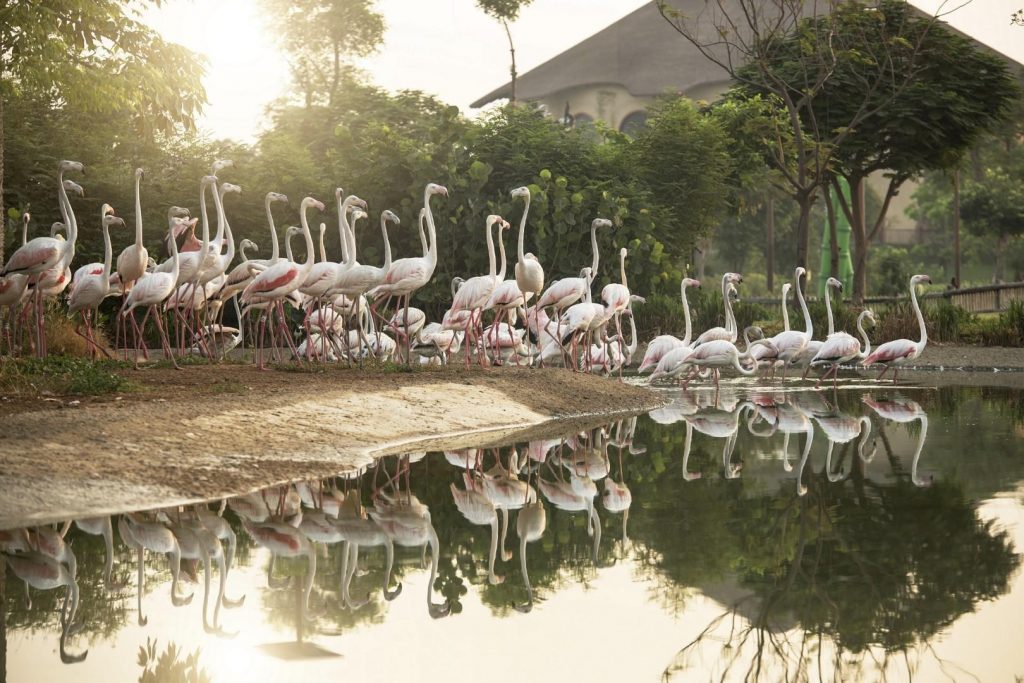
A specially-cured Children’s Farm is another draw in the Dubai Safari Park, where young children can learn about traditional farms such as chickens, goats, and sheep. We are sure your children will love learning to know nature and how to ride the pony and meet the animals. In addition to the farm, the giraffe feeding, Grand Vary, and Kids play games are other child-friendly attractions on the safari park.
Safari Village
This is Dubai Safari Park’s most popular and famous village. It’s also Dubai Safari Park’s most famous section. Visiting the Dubai Safari Park without looking at Safari Village is pointless. Safari’s beauty means bringing people to African and Asian wildlife as near as possible. The bus helps to take tourists to the animal-filled forest. These cars are designed primarily for comfort and safety purposes. You will find Zebras, Cheetas, Water Buffalo, or Deer on your bus ride.
Safari Village offers the chance to see tigers which is inappropriate if a tourist is on a safari trip and does not see any lions. The waterfalls running on solar energy can be seen in this section. These are falls of water artificially formed. Following this segment, the live view of crocodiles is to be viewed. It is the most deadly predator on earth to push through the crocodile. Crossing the display, Crocodile is one of the safari village’s most loved items.
Wadi Village
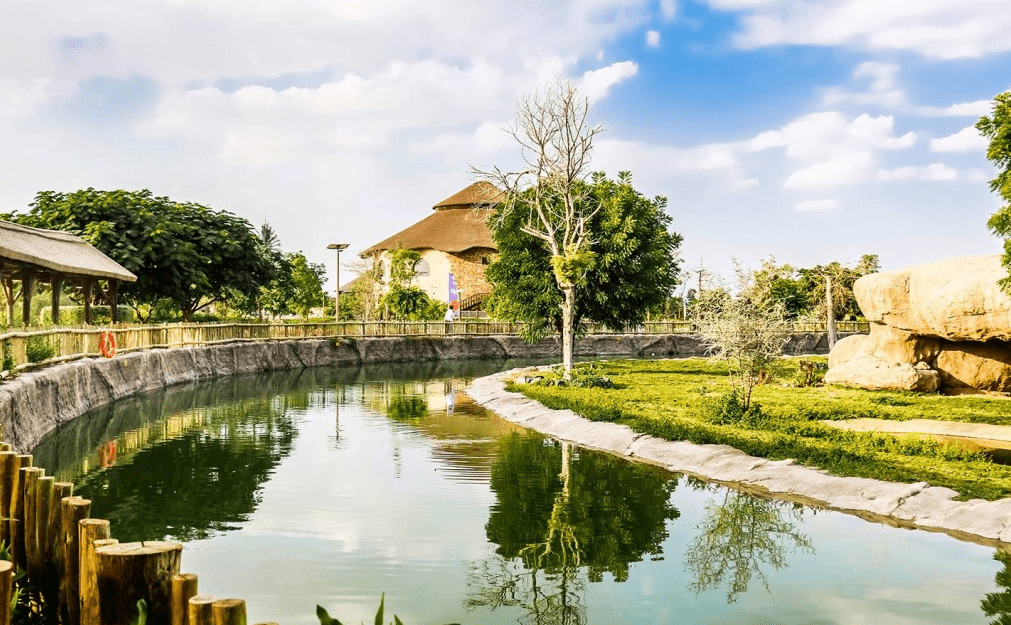
Wadi village is a vast leisure place. After a long safari, tourist needs are considered in the region. You can sit and relax in this area. The world is luxuriantly green with fish ponds where fish or waterfalls can be watched. The Wadi Village is a vast leisure area where you can relax after the safari trip and enjoy your family and friends. In this valley, which was built to create a network of water streams and fishing ponds, the Municipality of Dubai successfully introduced its green initiatives. Al Wadi has many cafes and cafés for a tireless day. The Wadi area includes restaurants and food you feel a little picky about.
Dubai Park and Zoo
Dubai Safari Park is a substitute for the Dubai Zoo in Jumeirah (50.05 years old) which shut its doors a month away. In the past, wild species were kept like animals. Some have been caught or injured by poachers. This wildlife park’s most significant draw was preserved for the last time. The first crocodile show and the exhibit took us on an air-conditioned bus to tour around the country. We saw wolves, tigers, and a baboon troop on our journey.
- Area Guides
- Building Guides
- School Guides
- Floor plans
- Market Trends
- Life at Bayut

Into the wild! Your complete guide to Dubai Safari Park
- Attractions
- Timings and Location
Dubai Safari Park has reopened for a new season with plenty of new animals to see, restaurants to munch in and interactive edutainment shows to enjoy. Let’s find out all about Safari Park Dubai attractions, timings and ticket prices.
About Dubai Safari Park
The Dubai Safari Park location is Al Warqaa . This wildlife facility houses almost 3,000 animal species, including birds, carnivores, reptiles, primates, invertebrates and amphibians. The venue is also home to the African elephants, the world’s largest land mammal.
Visitors can enjoy various interactive activities, awareness programmes, and the opportunity to feed the animals by hand. Also, various park facilities are designed to make your visit more convenient and fun. Furthermore, visitors have access to these facilities.
- Restaurants and kiosks
- Baby changing rooms
- First aid facility
- Separate prayer areas for male and female visitors

Must-visit Attractions
Safari Park in Dubai makes an eye-catching first impression with its beautiful lakes and verdant landscaping. You can spot a fleet of eco-friendly vehicles to take you around the massive park.
The 119-hectare safari is divided into different zones, each featuring distinctive topography and animal population. Let’s learn more about the zones and the kind of animals they have.
Arabian Desert Safari
Want to see an Arabian Oryx in all its glory? This drive-through attraction is the place to be. A marshall greets visitors before they begin the trip. During the short journey, visitors encounter some of the best-known animals in the Arabian Peninsula, from the Arabian Oryx to gazelles and camels. However, the hero animal of this zone is the Arabian Wolf!
- Hero animal: Arabian Wolf
- Native animals: Arabian Oryx, Addax, Arabian gazelle, Sand gazelle, Mountain gazelle and Scimitar-horned Oryx.

Explorer Village
The Safari Journey at the Explorer Village is the main zone attraction. The traditional open safari transports you to the jungles of Asia and Africa for close encounters with the resident animal population. Visitors can explore the village in specially designed vehicles and spot species like zebra, water buffalo and cheetah (the village’s Hero Animal).

Families love the cheetah-run area, where they can see the frisky beasts in action. The place also offers giraffe feeding activities and a bird show.
- Hero animal: Cheetah
- Native animals: Hippo, South African Giraffe, Sarus cranes, Nile Crocodile, Guineafowl, Baboon, Scimitar-horned Oryx, Greater Kudu, Striped Hyena, Impala, Zebra and many more
- Must-visit places: Giraffe Feeding, Birds Show and Safari Journey
African Village
Another go-to area is the African Village Dubai Safari Park, home to a range of exotic animal species like majestic white lions, giraffes, and the hero of this zone, the African elephants! The pachyderms are the star attraction at the park.
The Grand Aviary is the highlight of this attraction and the best place for keen birdwatchers. Making the experience more interesting are the guides who help you spot various rare birds during the journey. Don’t forget to drop by the reptile house the next time you get the chance to visit the park.
- Hero animal: African Elephant
- Native animals: White Lion, Antelope, Meerkat, Gorilla, Lemur, Chimpanzee, Cheetah, Hyenas, Carpet Viper, Greater Flamingo and more.
- Must-visit places: Gorilla House, Reptile House, Chimpanzee House and The Grand Aviary
Asian Village Theatre
From tigers to gibbons, the Asian Village is home to popular native species from the Asian continent. Visitors learn exciting things about the animals from the park’s expert keepers and guides. The hero animal of this attraction is the Moon Bear, also known as the Asiatic black bear.
- Hero animal: Moon Bear
- Native animals: Gibbon, Southern Cassowary and Mandarin Duck.
View this post on Instagram A post shared by Dubai Safari Park (@dubaisafari)
Another attraction in Dubai Safari Park Al Warqa is the specially curated Kids Farm, a fun-filled combination of a farm and a petting zoo. In the Kids Farm – Dubai Safari Park, the little ones learn about traditional farm animals like chickens, goats and sheep. Kids can connect with nature, learn how to ride ponies and visit the bird aviary.

Wadi, or the Valley area, is where you can host a picnic or grab a quick bite from the restaurants inside Dubai Safari Park. Both restaurants overlook the river. So, you can watch ducks, peacocks, swans and even pelicans while enjoying your food!
Please note that outside food cannot be consumed within the park premises.
Dubai Safari Park Timings and Location
Dubai safari park timings.
The Dubai Safari Park opening hours are daily from 09:00 am to 05:00 pm. A tour of the whole park easily takes over 5 hours, so ensure you have enough time to explore everything when you plan your visit.
Other Information
There are over 3,500 free parking spots in the park, with transport to and from the main gate.
Dubai Safari Park Contact Number
For any queries regarding Dubai Safari Park ticket price and timings, use the park’s toll-free number: +971-800-900. The official website also has a handy feedback form if you wish to leave any comments after a visit.
Sustainability and Conservation Efforts
There is more to the ambitious attraction than just entertainment. The park is built on a landfill site and, in doing so, has transformed the area into a reusable space. Furthermore, the park has adopted several eco-friendly and sustainable technologies, like harnessing solar energy to power its facilities and electric vehicles.
Other efforts include repurposing food and animal waste for use as fertiliser. Several recycling bins are placed throughout the facility for visitors to use. The park also makes efforts to protect endangered species through extensive scientific research.

The facility offers an immersive wildlife experience unlike any other in the UAE. A lot of work has gone into ensuring the animals here are comfortable. We recommend it as a fun day for all Dubai and UAE animal lovers!
FAQs ABOUT DUBAI SAFARI PARK
What is the dubai safari park tickets price.
The standard Dubai Safari Park ticket price (Day Pass) is AED 50 for adults and AED 20 for children. Ensure you take advantage of the Dubai Safari Park tickets and offers mentioned below if you plan to visit with family!
- Entry is free for kids under three and People of Determination.
- Differently-abled guests are expected to present their SANAD Cards upon entry and are allowed to bring two companions.
- Those looking to book Dubai Safari Park tickets online can do so via the park’s official website.
What are different tickets available?
The ticket price depends on the type you choose. Here’s an overview of the different choices to give you a good idea.
- A walking tour covering Al Wadi to African, Asian, and Explorer Villages
- Arabian Desert Safari (a 10-minute shuttle tour)
- Price: AED 50 for adults and AED 20 for child
- A transported tour to African, Asian, and Explorer Villages
- Arabian Desert Safari (a 10-minute electrical vehicle tour)
- Unlimited train rides
- Live shows reserved seats
- Price: AED 75 for adults and AED 45 for child
- Train service
- Guided Safari (a 35-minute bus tour)
- Price: AED 90 for adults and AED 35 for child
- Price: AED 110 for adults and AED 55 for child
Please note that you can upgrade your standard day pass ticket to a safari journey for an additional fee of AED 50 per adult and AED 20 per child. This, however, is subject to availability.
Book Dubai Safari Park tickets online well in advance to avoid inconveniences. E-tickets can be used for admission; printed tickets are NOT mandatory.
Can I use Dubai Safari Park packages?
Yes, visitors looking for a special experience can book any Safari Park Dubai packages. Each Dubai Safari Park package includes exciting perks.
- Chauffer-driven vehicle
- Personal guide
- Priority access to all facilities, exhibits
- Reserved seats for all bird shows
- Price (for 10 persons) – AED 2,500
- BTS – witness all the action
- Meet the animal caretakers
- Feed elephants and giraffes and brush White Rhinoceros
- Price (for 10 persons) – AED 1,450
- Ideal for groups
- Enjoy breakfast with giraffes or lions
- Price – AED 2,000
- Perfect for photographers
- Enjoy a 3-hour Safari Journey in a private bus to click pictures
- Price (for 3 persons) – AED 1,275
How to go to Dubai Safari Park by metro
For those who don’t have a car, the easiest way to get to Safari Park by public transportation is to take the Dubai Metro to the Creek Metro Station on the Green Line. From there you would need to take a taxi. The taxi ride from the Creek Metro to Dubai Safari Park is about 16 minutes.
Where is Dubai Safari Park located ?
It is located in Al Warqa’a 5 and is approximately a 12-minute drive from International City . You can easily access the park via Al Awir/ Ras Al Khor Road or Sheikh Zayed Bin Hamdan Al Nahyan Street (D54). The park isn’t far for those living in villas for rent in Mirdif or flats for rent in Al Warqaa .
What should I wear during the visit?
Guests must dress respectfully. Comfortable clothing should cover your shoulders and knees.
What are prohibited items?
Pets, bicycles, scooters, skateboards and roller skates are not allowed. Also, avoid bringing balloons, balls or toy guns as they cause stress to animals.
What happened to the Dubai Zoo?
Many visitors ask what happened to the original Dubai Zoo in Jumeirah. The Dubai Zoo officially closed in 2018, and the animals were moved to the new Safari Park. If you are a frequent visitor to the zoo in Dubai, you will certainly enjoy this park.
What are the best family attractions in Dubai?
Looking for other leisurely pursuits in the city? Plan your next trip to Green Planet , which will be fun for the whole family. For more options, visit any of the popular theme parks in Dubai .
This brings us to the end of our review. You can also visit the various nature reserves in the UAE for a fun learning experience. For more updates on the city’s hottest tourist attractions, subscribe to MyBayut.
Leave a Reply Cancel Reply
Very useful article thank you.
How much the ticket
Hi Ferose, is there any particular ticket you are looking for? There is a combo ticket allowing you access to the whole park for AED 85 (AED30 for children) and a Dubai Safari Park ticket for AED 50 (AED 20 for children) which allows you entry to all the villages excluding the Safari Village. We would recommend that you look at the Dubai Safari Park website for the latest information and choose the ticket that best suits you.
Dubai safari park online link is not working. How to buy the ticket ahead of my trip. Kindly advise.
Hi Muneer, The park is actually closed for renovation at the moment, but please do check the Dubai Safari website frequently for any updates on when will the park reopen. Best of luck!
When will the park reopen?
Hi Sab, There has not been a date announced for the reopening but we’re keeping our fingers crossed for anytime soon! Thank you for checking in!
Is the park open today
Hello Amar,
Thank you for getting in touch with us. Unfortunately, the Dubai Safari Park is still closed.
Is safari Park is open
The Dubai Safari Park is currently closed. We will be updating the article once the official reopening date is announced.
Is safari park open today?
Unfortunately, the park is closed until further notice.
Is the wild Safari park open now. And what is the timing. Either when it will open
Unfortunately, the Safari Park is currently closed. Opening dates for the park have not yet been announced by the management. We will be updating the post when this is communicated. Thank you!
Dubai safari park now open ? Today I can visit there ?
Unfortunately, Dubai Safari Park is currently closed. We will be updating the post with the updated opening dates for the park as soon as there is some official communication.
When is the opening of Dubai Sapari park? It’s was in the post that it’s already opened..would you please tell us when is the opening..thank you have a have a nice weekend.
The Safari Park is currently closed for renovation. It was open in 2018, till summer and has since then been closed for upgrades. We will be updating the post as soon as the authorities reveal the dates for the re-opening of Dubai Safari Park.
Hope this helps and have a great day!
Hello, Is the safari park open these days? If yes how much are the entry tickets?
Unfortunately, Dubai Safari Park is still closed for renovations. We will be updating the post once the official re-opening dates have been communicated.
Thank you and hope you have a great day!
Hi Friday Dubai Safari is open. From where to buy Tickets. Is there any tie with up with Banks Credit Cards to avail the discount. Thanks
As of now, the Safari Park is closed for renovations.
Is dubai safari park open?
Unfortunately, the park is still closed for renovation. We will be uploading the post as soon as the Safari Park authorities reveal the new opening dates.
Hi.dubai safari park is open tomorrow
The Dubai Safari Park is currently closed.
Thank you and have a great day!
What opening time ? Ticket rate detail? currently open?
Thank you for contacting us. The Safari Park is currently closed for renovation. We will be updating the post with all the latest details as soon as the official authorities confirm the reopening dates.
Still it is closed or open for visitors today I m planning to come over there
The Safari Park is still closed for renovations.
Thank you for reaching out to us and have a great day!
Hello, Dubai safari park is still open or closed.I am planning to come over there
The park is still closed. We will be updating the post when it is open.
Hello, is the park still closed?
Yes Maria, the park is still closed.
is Dubai Safari park open?
The Safari Park is not yet open. Thanks for writing to us!
Is it open now?
Thank you for writing to us. the Dubai Safari Park re-opening date has not yet been announced. We will update the post as soon as it is confirmed. If you are interested in something similar, the Al Ain zoo has just recently reopened.
Hope this helps!
Very nice article . How much is ticket with incudding bird show and all. Please
Hi Mohsin, Thank you for reaching out to us. We are very glad you liked the post. As for information on the price of shows at the park, please contact Dubai Safari Park at +971-800-900. Hope this helps. Have a great day!
Hi, in fact, I have several small cockatibirds that are family and very interdependent. I prefer to go back to nature and fly freely. Can I deliver to the Dubai Zoo? It is very important to me that it is safe. And very nice thank you
Hi Hanna, Thank you for reaching out to us. In answer to your query, we recommend contacting the Dubai Safari Park for more details regarding adoptions of pets:
Dubai Safari Park Contact: +971-800-900
We hope this helps. Have a great day!
Yes, it is! It reopened in October 2020 and is now open to visitors!
Does combo ticket mean entry of 2 adults?
Thanks for writing to us. The combo ticket refers to the combination of the entry ticket and the safari.
can you please send me the number as i have some questions
Hi Hanya, Thank you for getting in touch with us. You can contact the Dubai Safari Park at the following number:
– Dubai Safari Park (toll-free number): +971-800-900
Hope this helps. Have a great day!
Please I need to book tickets for today but I am not able to do it online, can I buy them at the door before entering please..thank you so much
Hi Dina, Thank you for getting in touch with us. We are very sorry that you are not able to get the tickets online. We recommend contacting Dubai Safari Park to determine whether they are offering tickets at the gate:
– Dubai Safari Park contact: +971-800-900
Hope this helps. Enjoy your trip!
Is the park still free for Over 65 ‘s
Hi Jo, Thank you for getting in touch with us. As per the Dubai Safari Park website, entry to the park is free for children under the age of three, people of determination (with SANAD card) plus two companions. Please contact the park to find out of the same applies to senior visitors over 65:
Dubai Safari Park contact: +971-800-900
Is safari park is open now ?
Hi Faiyaz, Thank you for getting in touch with us. The Dubai Safari Park is currently open. You can book online tickets for the day you plan to visit via the park’s official website. For further assistance, you can contact the park at the following number:
It’s a really helpful article . Planning to go here , can’t wait !
Hi, Thank you! We are glad that our blog on Dubai Safari Park was helpful. Enjoy your trip!
Will Dubai safari park open in April 2021?
Hi Eduard, thank you for writing to us.
Currently, Dubai Safari Park plans to continue operating as normal in April. Stay tuned to MyBayut for updates on any changes in the park’s operating hours!

Popular areas to find chiller free apartments in Sharjah

Abu Dhabi Agency and Agent of the Month – Congratulations District Real Estate and Baha Usmanov!

How to get and check your credit score in Dubai online
- Residential Plot
Sliding Sidebar
Due to weather conditions live presentations might be delayed or cancelled.
نظرًا لظروف الطقس، قد يتم تأجيل العروض الحية او الغائها., plan your visit.

Online Bookings
We recommend booking all tickets and packages online to guarantee your spot, whilst avoiding queues at the park.
Our Packages and Plus Tickets can be booked online and are not available for purchase at the tickets counter in the park.
Public Transportation

RTA Bus no. F10, from Rashidiya Bus Station.
Station Name: Dubai Safari Park
Find out more on the RTA website

By Dubai Metro
The nearest metro station to Dubai Safari Park is Centerpoint and that connected to Dubai Safari Park by RTA bus no. F10. Find out more in RTA website

Dubai Safari Park has three parking areas : Parking 1 (VIP), Parking 2 (P2) and Parking 3 (P3) and they are free of charge.
Getting Around Dubai Safari Park

You are welcome to walk around the park or use train (plus ticket holders) or Eco taxi services (chargeable) to reach the villages.
Our Eco Taxi team will transport guests to any location of your preference at a rate of 10 AED per adult and 5 AED per child (per pickup and drop off). You can pay for the service at the spot.

Train services are available for Park Entrance Plus and Safari Journey Plus tickets, which can be purchased online only. Additionally, POD guests can have access to trains by presenting the POD tickets at each station
Train route: (Summer Route)
- Wadi Station (nearest to the main entrance)
- African Village – Chimpanzee Station (drop-off only)
- African Village – Flamingo Station (pick-up only)
- Explorer Village – Giraffe station
- Asian Village – Dragon Station
- Exit station

Accessibility
Dubai Safari Park is fully equiped to accommodate People of Determination. Wheelchair services and electrical mobility vehicles available around the park for additional charges. Park transportation; buses and trains, and park attractions are wheelchair accessible.

Time to Spend
With so many animals, shows, activities and areas to explore, we recommend you to dedicate at least half a day to enjoy your time at Dubai Safari Park. Guests normally take 4-5 hours visiting the entire park.

Best Air Conditioner in U.A.E (Year 2024 Reviewed)

O General Air Conditioners Dealers in the UAE (Year 2024 Reviewed)

Best Window AC’s To Buy In the UAE (2024)

Discover Dubai Safari Park: A Wild Journey into Nature’s Heart
Unlocking Dubai’s Entrepreneurial Potential: Thriving Business Opportunities in the UAE
Dubai, a city known for its towering skyscrapers and opulent lifestyle, also offers a remarkable contrast – explore Dubai Safari Park, a remarkable wildlife sanctuary in the heart of the city. Join us on an unforgettable journey through diverse ecosystems and up-close encounters with animals. Perfect for family adventures and nature enthusiasts!
Dubai Safari Park: A Thrilling Journey into the Wild
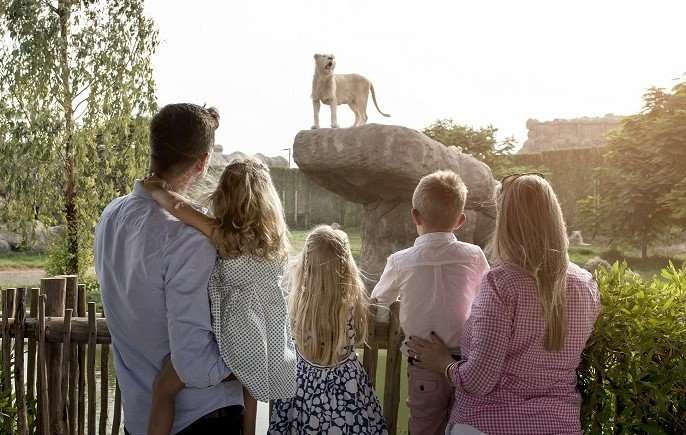
Step away from the urban jungle and embark on a journey that takes you into the heart of the animal kingdom. The Park, situated in the heart of the city, offers a unique and unforgettable experience for wildlife enthusiasts and families alike.
Here, wildlife roams in habitats mirroring their natural environments, creating an authentic connection that’s as educational as it is thrilling. So, whether you’re fascinated by the animal kingdom’s diversity or looking to create lasting memories with your loved ones, the Dubai Safari Park promises a world of wonder, right at the heart of Dubai.
A World of Biodiversity
Dubai Safari Park is home to over 3,000 animals from over 78 species of mammals, 50 species of reptiles, 111 species of birds, and amphibians and invertebrates. The park is divided into five villages, each of which represents a different biome:
African Village
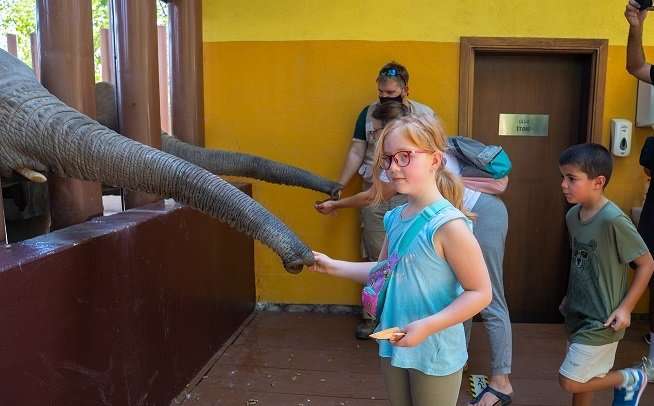
The African Village is home to a variety of animals from Africa, including lions, elephants, giraffes, rhinos, zebras, cheetahs, gorillas, chimpanzees, baboons, monkeys, and meerkats. Moreover, the village is designed to replicate the natural habitats of these animals, with a variety of trees, shrubs, and rocks.
One of the most popular attractions in the African Village is the lion enclosure. Visitors can watch the lions up close from a viewing platform, or they can take a guided tour of the enclosure to learn more about these majestic creatures.
Another popular attraction is the elephant enclosure. Visitors can feed the elephants by hand, or they can watch them bathe in the pool.
The African Village also has a number of other exhibits, including a gorilla enclosure, a chimpanzee enclosure, and a baboon enclosure. Visitors can also learn about the African culture and way of life at the village’s cultural center.
Asian Village
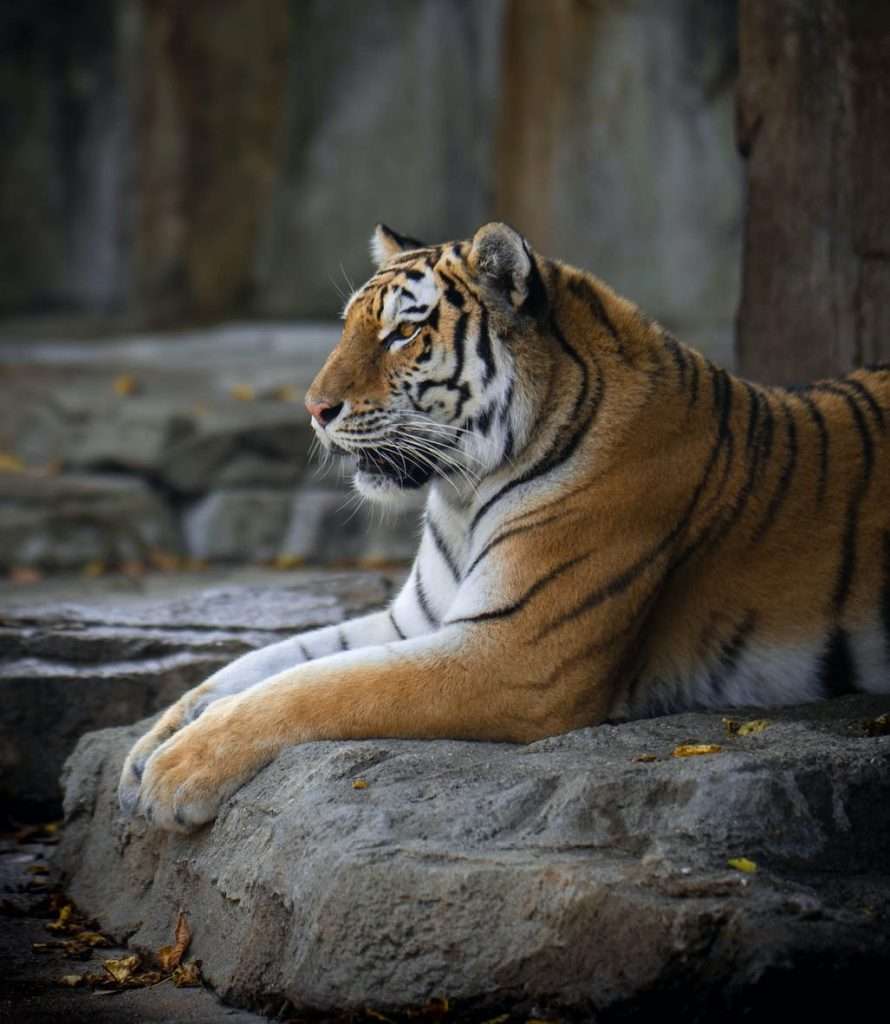
The Asian Village is home to a variety of animals from Asia, including tigers, leopards, orangutans, gorillas, komodo dragons, and gibbons. The village is designed to replicate the natural habitats of these animals, with a variety of trees, shrubs, and rocks.
One of the most popular attractions in the Asian Village is the tiger enclosure. Moreover, visitors can watch the tigers up close from a viewing platform, or they can take a guided tour of the enclosure to learn more about these big cats.
Another popular attraction is the orangutan enclosure. Visitors can watch the orangutans swing through the trees and play with each other.
The Asian Village also has a number of other exhibits, including a leopard enclosure, a gorilla enclosure, and a Komodo dragon enclosure. Visitors can also learn about the Asian culture and way of life at the village’s cultural center.
Arabian Desert Safari
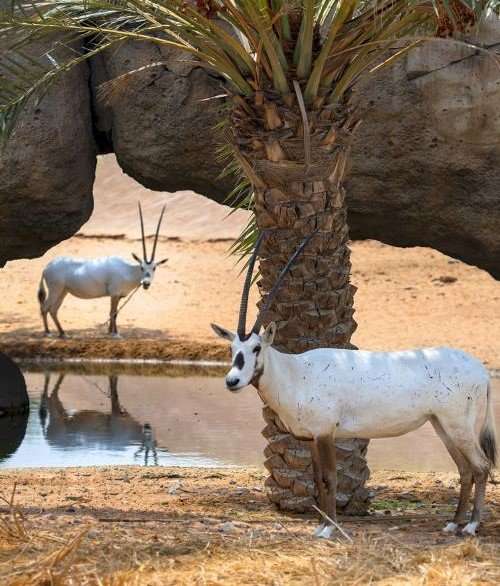
The Arabian Desert Safari is home to a variety of animals from the Arabian Desert, including Arabian leopards, Arabian oryxes, camels, sand cats, and dromedaries. The village is designed to replicate the natural habitats of these animals, with a variety of sand dunes and rocks.
One of the most popular attractions in the Arabian Desert Safari is the Arabian leopard enclosure. Visitors can watch the leopards up close from a viewing platform, or they can take a guided tour of the enclosure to learn more about these endangered animals.
Another popular attraction is the Arabian oryx enclosure. Visitors can watch the oryxes graze on the desert plants, or they can take a camel ride to get a closer look.
The Arabian Desert Safari also has a number of other exhibits, including a camel enclosure, a sand cat enclosure, and a dromedary enclosure. Visitors can also learn about the Arabian culture and way of life at the village’s cultural center.
Explorer Village
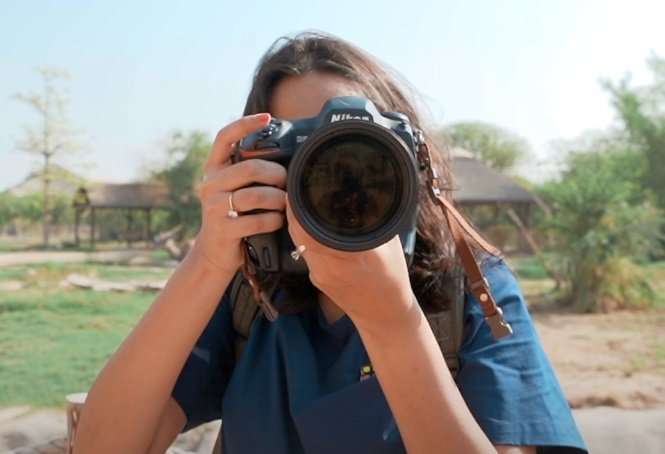
The Explorer Village is dedicated to education and conservation, with a variety of interactive exhibits and educational programs. Visitors can learn about the importance of biodiversity and conservation, and they can meet some of the animals up close.
Visitors can explore the interactive exhibit on the food chain. Furthermore, they can learn about how different animals in the food chain interact with each other, and they can even try to build their own food chain.
Another popular attraction is the educational program on animal conservation. Visitors can learn about the different threats that animals face, and they can find out what they can do to help protect animals and their habitats.
The Explorer Village also has a number of other exhibits and programs, including a live animal show, a behind-the-scenes tour, and a wildlife conservation workshop.
Adventure Valley
Adventure Valley is home to a variety of thrilling activities, such as a zipline, a rope course, and a climbing wall. Visitors can also challenge themselves to the park’s two mazes: the Animal Maze and the Adventure Maze.
The zipline takes visitors over a crocodile enclosure, and the rope course takes visitors through a variety of obstacles, such as rope bridges and climbing walls. The climbing wall is a challenging activity for visitors of all ages.
The Animal Maze and the Adventure Maze are both challenging mazes that are sure to keep visitors entertained. Furthermore, the Animal Maze is designed to look like an animal, and the Adventure Maze is designed to look like a desert landscape.
This Park is a great place to learn about wildlife, conservation, and the natural world. It is also a fun and exciting place to visit with family and friends.
Here are some specific examples of the biodiversity that can be found at Dubai Safari Park:
- Mammals: The park is home to a wide variety of mammals, including lions, tigers, leopards, elephants, giraffes, rhinos, zebras, cheetahs, gorillas, orangutans, chimpanzees, baboons, monkeys, lemurs, and meerkats.
- Reptiles: The park is also home to a variety of reptiles, including snakes, lizards, crocodiles, and turtles. Some of the most notable reptile species include the komodo dragon, the reticulated python, and the Nile crocodile.
- Birds: The park is home to a wide variety of birds, including eagles, hawks, owls, parrots, flamingos, and peacocks. Additionally, some of the most notable bird species include the African grey parrot, the golden eagle, and the Indian peafowl.
- Other animals: The park is also home to a variety of other animals, such as amphibians, invertebrates, and fish. Some of the most notable other animal species include the leopard tortoise, the Arabian camel, and the clownfish.
This Park is committed to biodiversity conservation and works with a number of organizations to protect wildlife and their habitats. The park also offers a variety of educational programs and workshops for children and adults of all ages, to teach them about the importance of biodiversity and conservation.
The Best of Dubai Safari Park
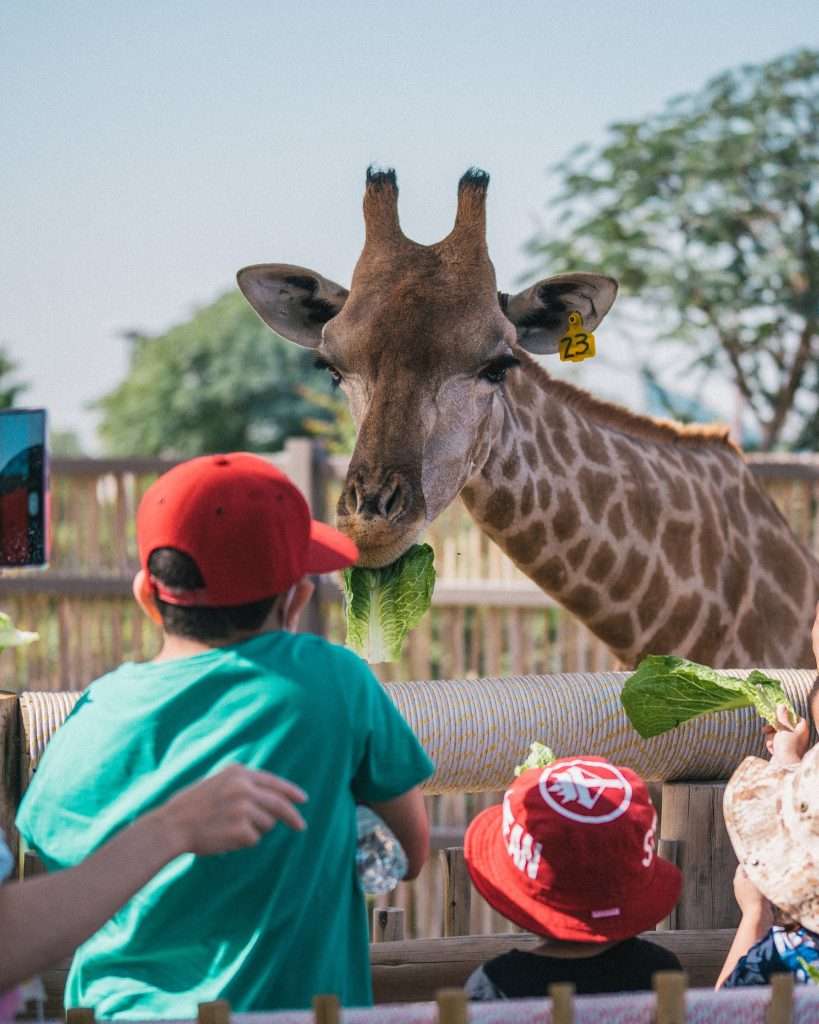
The Kids Farm is a delightful petting zoo designed to introduce children to the wonders of farm life. It’s an educational yet fun environment where youngsters can interact with a variety of friendly farm animals.
Kids can feed, pet, and learn about animals like goats, sheep, chickens, and ducks. In addition, it’s an excellent opportunity for them to understand the basics of animal care and develop a sense of responsibility.
Safari Journey
The Safari Journey is a guided bus tour that provides visitors with an exciting adventure through the park’s diverse villages.
Hop on a comfortable safari bus and embark on a journey through various animal habitats. Furthermore, you’ll witness animals in settings that closely resemble their natural environments. Thereafter, a knowledgeable guide narrates fascinating insights about each species, making this an educational and thrilling experience for all ages.
Wildlife Walk
The Wildlife Walk offers a self-guided walking tour, allowing visitors to explore the park on foot and get up close to the animals.
Stroll along well-designed pathways that wind through the park’s natural landscapes. As you walk, you’ll have the chance to observe animals such as big cats, primates, and birds in enclosures that mimic their native habitats. It’s an opportunity to connect with wildlife at your own pace.
Animal Encounters
Animal Encounters provide unique opportunities for visitors to feed and interact with specific animals, including giraffes, elephants, and rhinos.
This attraction allows you to get remarkably close to some of the planet’s most magnificent creatures. You can feed a giraffe, witness the gentle nature of elephants, and even observe the majestic rhinos up close. Furthermore, these experiences create lasting memories and foster a deeper appreciation for these remarkable animals.
Winter Camp in Dubai Safari Park
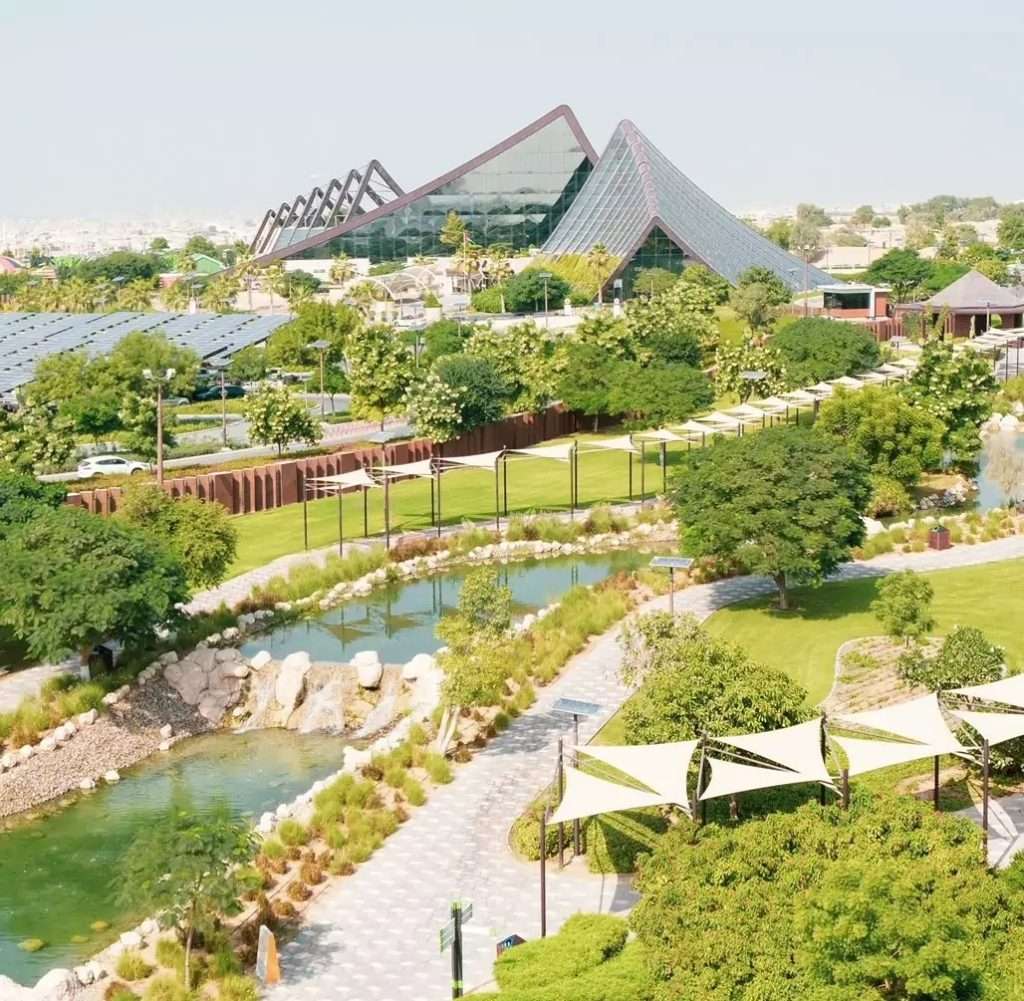
Dubai Safari Park is offering a winter camp for children in 2023. The camp will run from December 18 to 22, 2023 , and is designed for children ages 6 to 12.
The winter camp will focus on teaching children about the importance of wildlife conservation and the natural world. Children will participate in a variety of activities, including:
- Learning about different animal species and their habitats
- Going on safari tours to see animals up close
- Participating in hands-on activities, such as feeding animals and making animal crafts
- Learning about the park’s conservation efforts
The winter camp will also include a number of fun and educational activities, such as:
- Arts and crafts
- Games and sports
- Nature walks
The winter camp will be led by experienced and qualified instructors. Additionally, the staff will supervise children at all times, and the cost of the winter camp is AED 500 per child.
This includes all activities, materials, and meals.
To register for the winter camp, please visit the Dubai Safari Park website.
Here is a more detailed breakdown of the daily activities that children can expect at the winter camp:
- Introduction to the winter camp and its activities
- Tour of the park and its animals
- Animal feeding activity
Second Day:
- Safari tour to see animals up close
- Hands-on activity: making animal crafts
- Nature walk
Fourth Day:
- Arts and crafts activity
- Games and sports tournament
- Animal Encounter program
- Closing ceremony of the winter camp
- Certificate distribution
- Farewell lunch
The winter camp at Dubai Safari Park is a great opportunity for children to learn about wildlife, conservation, and the natural world in a fun and engaging way. Therefore, if you are looking for an educational and enjoyable activity for your child, the winter camp at Dubai Safari Park is a great option.
Essential Information
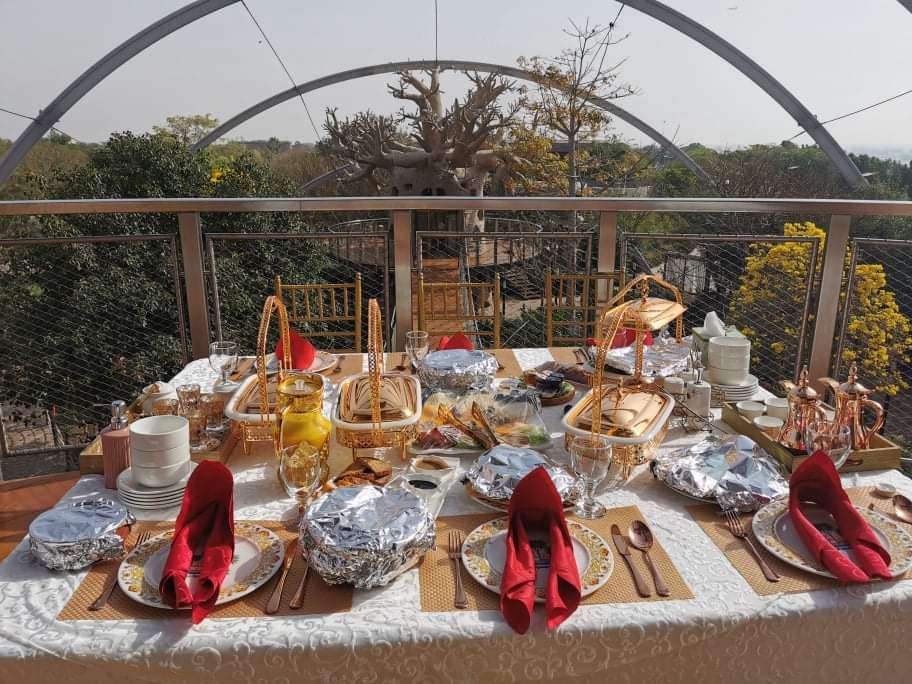
Embarking on an exciting journey to Dubai Safari Park? Before you set off on your wildlife adventure, it’s crucial to have all the essential information at your fingertips. From the park’s convenient location and accessible transportation options to ticket prices and dining choices, we’ve got you covered.
Dubai Safari Park is located in Al Warqa, near Dragon Mart. It is approximately 15 kilometers from Dubai International Airport and 20 kilometers from downtown Dubai. The park is easily accessible by car, taxi, or public transportation. The following RTA buses can take you to Dubai Safari Park:

Public transportation
- F10 from Rashidiya Bus Station
- F14 from Business Bay Metro Bus Stop Landside
- 7 from Al Quoz, J Mart Supermarket
- 29 from Business Bay Metro Bus Stop Landside
- F20 from Business Bay Seaside Metro Bus Stop
You can also take the Dubai Metro to Rashidiya Metro Station and then transfer to the F10 bus. The F10 bus is the most direct route to Dubai Safari Park from Rashidiya Metro Station. The bus journey takes approximately 30 minutes.
Please note that the bus schedules may vary, so it is always best to check the RTA website or app for the latest information.
The park is open throughout the year, but the timings may vary depending on the season. During the summer months (June-August), the park is open from 9:00 AM to 5:00 PM. During the winter months (September-May), the park is open from 9:00 AM to 6:00 PM. The park is closed on Tuesdays.
Ticket Prices
Admission costs differ for adults, children, and infants. Children under three and older citizens over 65 are eligible for free entry. People of Determination with one carer can also enter free of charge.
- Infants (under 3 years): Free
- Children (3-12 years): AED 20
- Adults (13+ years): AED 50
Family and group packages are also available. Please check the Dubai Safari Park website for up-to-date ticket information.
Accessibility
The park is wheelchair-friendly and provides strollers for families with young children. There are also designated parking areas for people with disabilities.
Dubai Safari Park offers a variety of dining options within the park, including restaurants, cafes , and snack bars. Visitors can enjoy a meal while overlooking the stunning animal habitats.
Fun Facts that Will Amaze You

Here are some fun facts about Dubai Safari Park:
- It is the largest zoological park in Dubai.
- It is home to over 3,000 animals from over 78 species of mammals, 50 species of reptiles, 111 species of birds, and amphibians and invertebrates.
- It is divided into five villages: African Village, Asian Village, Arabian Desert Safari, Explorer Village, and Adventure Valley.
- It is an eco-friendly park, with a major source of energy being solar power.
- It is the only park in the UAE to display three types of lemur.
- It is the UAE’s only drive-through lion and hippo exhibits.
- It has the first moon bear exhibit in the UAE.
- It has the first orangutan exhibit in the UAE.
- It has the only Komodo dragon exhibit in the UAE.
- It has the first white lion pride on exhibit to the public in the UAE.
- It has the largest group of baboons in the UAE.
- It has the only cheetah race in the UAE.
- The park has a dedicated wildlife hospital with a team of experienced veterinarians and animal care professionals.
- The park offers a variety of educational programs and workshops for children and adults of all ages.
- The park is home to a number of endangered species, including the Arabian leopard, the black rhinoceros, and the Sumatran orangutan.
- The park conserves and researches wildlife and habitats, working with a number of organizations to protect them.
Dubai Safari Park is a great place to learn about wildlife, conservation, and the natural world. It is also a fun and exciting place to visit with family and friends.
Frequently Asked Questions
The entrance fee for the Park is AED 55 for adults and AED 20 for children (aged 3-12 years). Children under the age of 3 are admitted free of charge.
Dubai Safari Park is open from 9:00 am to 5:00 pm, daily.
It is recommended to wear comfortable clothing and shoes to the Park. The park can be hot and dusty, so it is important to wear sunscreen and a hat.
No, outside food and drinks are not allowed inside the Park. However, there are a number of restaurants and cafes inside the park where you can purchase food and drinks.
Smoking is only permitted in designated smoking areas inside Dubai Safari Park.
No, pets are not allowed inside Dubai Safari Park.
If you have any questions about Dubai Safari Park, you can visit the park’s website or contact the park’s customer service team.
The duration of your visit to Dubai Safari Park can vary depending on your preferred pace and the activities you choose to engage in. However, on average, most visitors spend around 4 to 5 hours exploring the various attractions and enjoying the animal encounters.
If you opt for PLUS tickets at Dubai Safari Park, you’ll enjoy a range of added benefits. These tickets grant you access to the park’s train services, making it even easier to get around. Additionally, PLUS ticket holders can secure reserved seats for the park’s live shows, ensuring you get the best view. You should book these tickets online as they are limited.
Yes, you’re welcome to bring your own stroller or wheelchair into the park, which can be especially helpful for families or those with mobility needs. You must fold your stroller before boarding any of the park’s vehicles if you plan to use the park’s transportation services.
There are many different activities that you can do at Dubai Safari Park, including: Going on a safari drive Visiting the animal exhibits Watching the bird show Feeding the animals Playing at the children’s zoo Visiting the marine park
Dubai Safari Park is divided into eight different zones: African Village Arabian Desert Asian Village Safari Village Wadi Al Khadeja Children’s Zoo Bird Show Marine Park
As you wander through the Dubai Safari Park, you’ll feel a deep connection to the animal kingdom. It’s a place where you can witness nature’s most incredible creations living in harmony. Dubai’s remarkable ability to blend modernity with nature is on full display here. It’s not just a park; it’s a sanctuary, a testament to the importance of preserving our planet’s diverse and beautiful wildlife.
This article provides general information about Dubai Safari Park. Please verify the latest details through official channels before planning your visit. Enjoy your journey into the wild!
A Review of Lockable Storage

Best Nihari in Dubai: Your Guide to the Top 5 Restaurants

The Great Online Sale: A Shopping Festivity in Dubai (March 29-31, 2024)
The Great Online Sale. Organized by the Dubai Festivals and Retail Establishment, this three-day shopping bonanza is scheduled to take place from 29th to 31st March. The Great Online Sale of 2024 have rounded up all the best deals—from clothing to luxury beauty products to popular tech, electronics and more—available only online

Food Transport Dubai (The Best Refrigerated Transport Companies of 2024 in Dubai)
- Hi, My Account Subscriptions --> My KT Trading Contact Us Privacy Notice Sign Out
Thu, Apr 18, 2024 | Shawwal 9, 1445
Dubai 20°C
- Expo City Dubai
- Emergencies
- Ras Al Khaimah
- Umm Al Quwain
Life and Living
- Visa & Immigration in UAE
- Banking in UAE
- Schooling in UAE
- Housing in UAE
- Ramadan 2024
- Saudi Arabia
- Philippines
- Cryptocurrency
- Infrastructure
- Currency Exchange
- Horse Racing
- Local Sports
Entertainment
- Local Events
Dubai World Cup
- Track Notes
- Big Numbers
- Daily Updates
- Arts & Culture
- Mental Health
- Relationships
- Staycations
- UAE Attractions
- Tech Reviews
- Motoring Reviews
- Movie Reviews
- Book reviews
- Restaurant Reviews
- Young Times
Supplements
- Back To School
- Eid-Al-Adha
- It’s Summer Time
- Leading Universities
- Higher Education
- India Real Estate Show
- Future Of Insurance
- KT Desert Drive
- New Age Finance & Accounting Summit
- Digital Health Forum
- Subscriptions
- UAE Holidays
- Year of the 50th
- Latest News
- Prayer Timings
- Cinema Listings
- Inspired Living
- Advertise With Us
- Privacy Notice
KT APPDOWNLOAD
Dubai safari park announces opening date of new season, this season will feature an exciting line up of new shows, talks, events, and workshops.

A Staff Reporter
- Follow us on

Top Stories

Embracing the bright side: A guide on how to cultivate optimism

The power of solitude: Why you should go on a solo trip

How to get your kids to read: Essential tips for parents

Published: Tue 3 Oct 2023, 5:29 PM
Last updated: Wed 4 Oct 2023, 12:10 AM
The Dubai Safari Park will bring back its wildlife experience as it reopens for the 2023-24 season on October 5. Bookings to the attraction are now open on its website.
Among the highlights this season are the ‘bird kingdom’ show; Asian Village's showcase that introduces visitors to some of the world's most captivating creatures; and a bird of prey show.
The 119-hectare park is home to 3,000 animals, with 78 species of mammals – including 10 carnivores and 17 primates – 50 types of reptiles, 111 kinds of birds, and amphibians and invertebrates. The park, which remains shut during peak summer, offers visitors the chance to observe animals and birds in their natural habitats.

Overseen by the Dubai Municipality, the park attracted more than half a million visitors last year.
The park has five sections: African Village, Asian Village, Arabian Desert Safari, Explorer Village and the Valley. Ticket options include a day pass and a safari journey, with rates ranging between Dh50 and Dh110 per adult.

Special packages include:
- King of safari: Led by an expert guide, who will share insights about the park's diverse animal species.
- Behind the scenes: It offers a 90-minute behind-the-scenes experience to learn about the daily care services provided to the animals.
- Jungle capture: It will provide three exclusive hours for visitors to take photos of animals from unique locations within the park.
- Dine in the wild: It offers visitors the opportunity to savour their favourite meal in the heart of the park.

Visitors can also opt for special sessions to feed giraffes and rhinos.

Ahmed Al Zarooni, director of the Department of Public Parks and Recreational Facilities at Dubai Municipality, said: “In the upcoming 2023-24 season, Dubai Safari Park will offer a multitude of engaging activities that seamlessly blend entertainment and education while introducing a diverse array of animals and birds that inhabit the park."

"Visitors will have the unique opportunity to learn about the park's distinctive ecosystem and its commitment to maintaining the ideal living conditions for its resident species, ensuring their well-being in accordance with the highest health standards.”
- Expo City Dubai announces temporary closure of 6 pavilions, attractions
- Dubai: Global Village VIP packs sold out within 'record time'
- Look: From tunnels of love to water wheels, Dubai Miracle Garden reopens with brand-new attractions
- Newsletters
- [email protected]
More news from Travel
Uae travel trends: long-haul destinations back in demand in 2024.
Survey reveals names of top cities residents want to visit this year, with 97% keen to explore new places
travel 3 months ago -->
Eid Al Fitr, summer holidays in UAE: Book Schengen visa appointments in advance, residents told
Entry permit applications for the 27 EU countries can be submitted up to 180 days before the intended travel date
List of countries granting visa-free entry or visa on arrival to Indians, Pakistanis in 2024
Both the South Asian passports have weakened in the past ten years, dropping from respective positions
An architectural feast in Tbilisi
Tbilisi’s babel of building styles is a product of its complicated past
Dubai: Can you get paid to travel? Influencers spill secrets of monetising content
Creating content constantly is often challenging, especially for their mental health, said one speaker at 1 Billion Followers Summit
UAE announces visa-free travel to Mongolia, allowing up to 30 days per visit
Mongolians who hold diplomatic, official, and regular passports are also exempted from a visa to enter the Emirates
Dubai ranked top global destination for third year in a row
Other cities on the list include Bali, London, and Hanoi
Phu Quoc island in South Vietnam: A traveller’s dream destination?
With plenty of luxurious resorts, chic bars, and quaint cafés to cater to even the most pernickety punter, here's why you should give this place a go in 2024
Type your keywords
Dubai Safari Park Opens For 2023-2024 Season – Over 3,000 Animal & Bird Species To Enjoy
Grab your hats and especially some sunscreen, kids, because your new favourite place opens up again today! That’s right, Dubai Safari Park has once again returned for the eagerly awaited 2023-2024 season. So, starting today, Thursday, October 5th, everyone in Dubai will have the chance to embark on a captivating journey into the world of diverse wildlife, intricate fungal patterns, and rich biodiversity, all under one mesmerising roof . Let me tell you all the details you need to know about what’s in store for you before you buy those fantastic tickets!
Also read: 11 Zoos To Take Your Kids To For A Family Day Out In The UAE
A Glimpse Into The Wild
What makes Dubai Safari Park truly exceptional is its commitment to preserving the natural habitats of the estimated 3,000 animals and bird species they have, allowing visitors to witness these magnificent creatures thriving in their native environments. Dubai Municipality’s vision of creating world-class recreational destinations has certainly come to life in this incredible park.
Also read: Have You Visited These 13 Stunning Mangroves Around UAE
What’s In Store?
Prepare to be captivated by daily recreational and educational performances throughout the day. Among the highlights this season is the Bird Kingdom Show , where the skies come alive with enchanting avian displays from 11 am to 2 pm at the Explorer Village Theatre. The Asian Village will also host a showcase from 1 pm to 3 pm, unveiling some of the world’s most fascinating creatures. Don’t miss the thrilling Birds of Prey Show at 4 pm. The park will also host engaging workshops that cover a range of themes, including Teacher’s Day, World Animal Days, Climate Change, and more. Plus, get up close and personal with giraffes, birds, and goats during interactive animal feeding activities.

Exploring The Park
Dubai Safari Park offers a variety of ticket categories and packages to suit every adventurer. Discover distinct sections like the African Village, Asian Village, Arabian Desert Safari, Explorer Village, and Valley Area. Choose from options like the Day Pass Ticket, Day Pass Plus Ticket, Safari Journey Ticket, and Safari Journey Plus Ticket.
Also read: Kayak Or Paddle Board Alongside Dolphins At The Atlantis
Special Packages For Extra Adventure
For those seeking a personalised experience, the King of Safari package offers a guided tour by an expert who will share insights about the park’s diverse animal species. Animal enthusiasts will adore the Behind the Scenes package, which grants a 90-minute peek into the daily care services provided to the animals. Photography enthusiasts can opt for the Jungle Capture package, offering exclusive hours to capture stunning animal shots. Finally, the Dine in the Wild package lets you savour your favourite meal amidst the park’s heart, creating unforgettable dining memories.

Opening Hours & Planning Your Visit
Dubai Safari Park opens its gates daily on weekdays from 9 am to 5 pm. To make the most of your visit, explore the park’s garden attractions and pre-purchase tickets via their official website .
Dubai Safari Park
Location : Al Warqa 5 – Dubai Timings : Open daily from 9 AM–5 PM Contact : 800 900
You may also like: These Seasonal Attractions Are Reopening In Dubai – Find Out Which Ones Inside

Here Is How To Instantly Obtain Your Driving Permit In Dubai
Dubai design week returns this november for its 10th anniversary - here's what's to expect.

Leave a Reply Cancel reply
Your email address will not be published. Required fields are marked *
Get Social with Gulfbuzz
Travel & visa.

Visa-Free Eid Al Fitr 2024 Holiday Ideas For UAE Residents

IndiGo Launches New Daily Direct Flights Between Abu Dhabi And This South Indian City
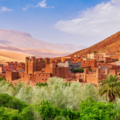
UAE Residents Can Now Get A Moroccan E-Visa In Just 3 Days

GIVEAWAY ALERT: Win A 3-Night 4-Day Stay For 2 People At An Adults-Only Resort In The Maldives

Air India Express Announces Cheaper Travel To India With 4 New Fare Categories

- Food & Drink
- Travel & Visa
- Entertainment

Ultimate Guide to Dubai Desert Safaris: All You Need to Know (2023)
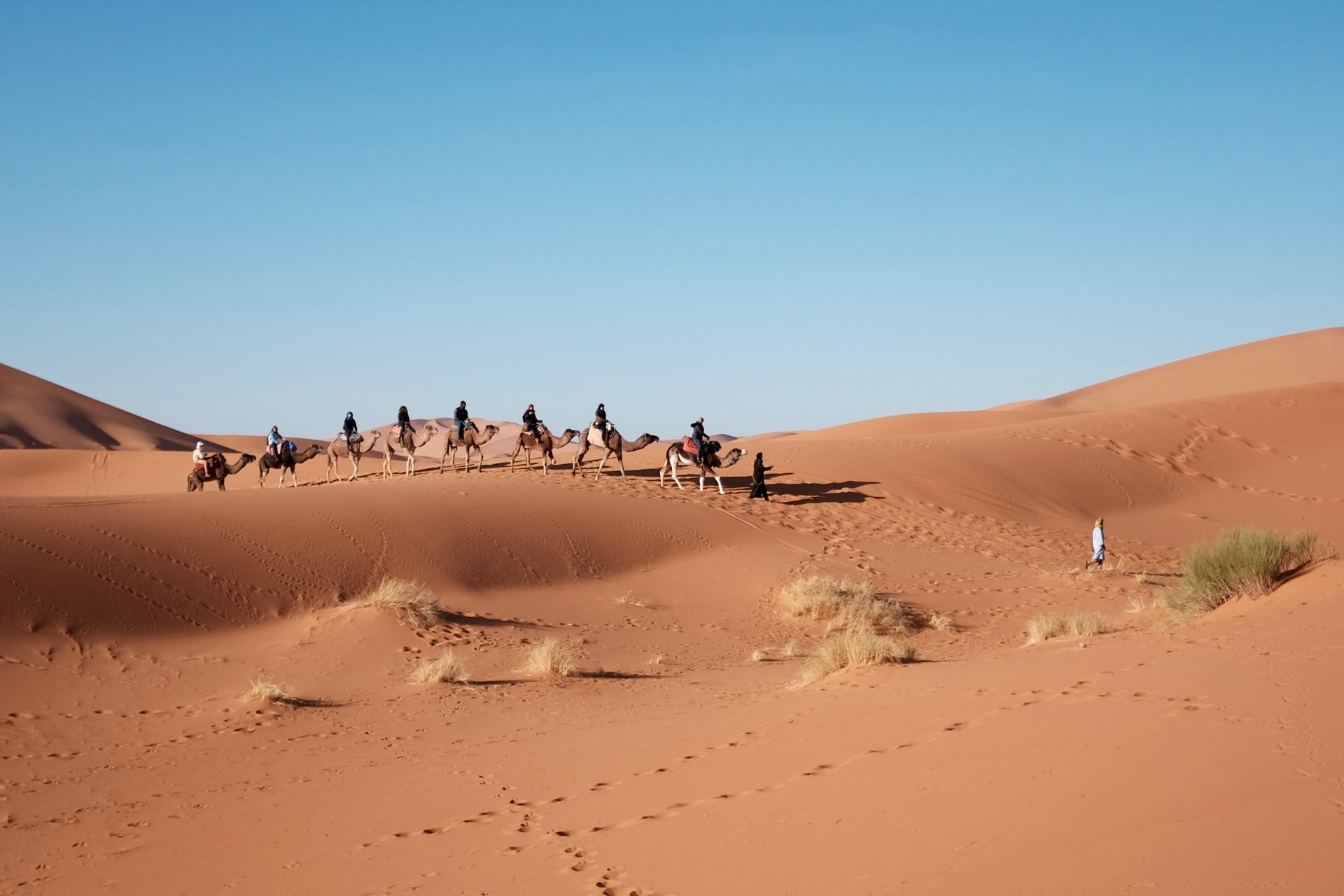
The major draw for most people visiting Dubai is its towering skyscrapers and tons of leisure choices, but this fabulous Arabian city is not all about that. Roughly 30 to 40 minutes’ drive out of the city limit, Dubai’s blissfully unblemished desert land is well worth a visit for one of the Dubai Desert Safaris.
Rightly so, it caters to a variety of preferences and experiences. If you’re confused about making the right choice of a desert trip, this guide by Neha Singh on different types of desert journeys will help you select the best Dubai desert safaris.

Contents hide What are Dubai Desert Safaris What to Expect in Dubai Desert Safaris Types of Dubai Desert Safaris Top Desert Safari in Dubai Tips for Choosing the Top Desert Safari in Dubai Final Thoughts on the Best Dubai Desert Safaris
What are Dubai Desert Safaris
Dubai desert safaris are guided excursions into the vast swathe of desert sands that is isolated and located away from the city centre. It’s a complete contrast to what Dubai’s glitzy part appears to be.
Devoid of any noise and crowd, this distinct off-road trip effortlessly disconnects you from the chaos of the city life for a few hours. So all you’ll get to experience here is the unequaled allure of the dune scenery accompanied by sheer silence and absolute tranquility.
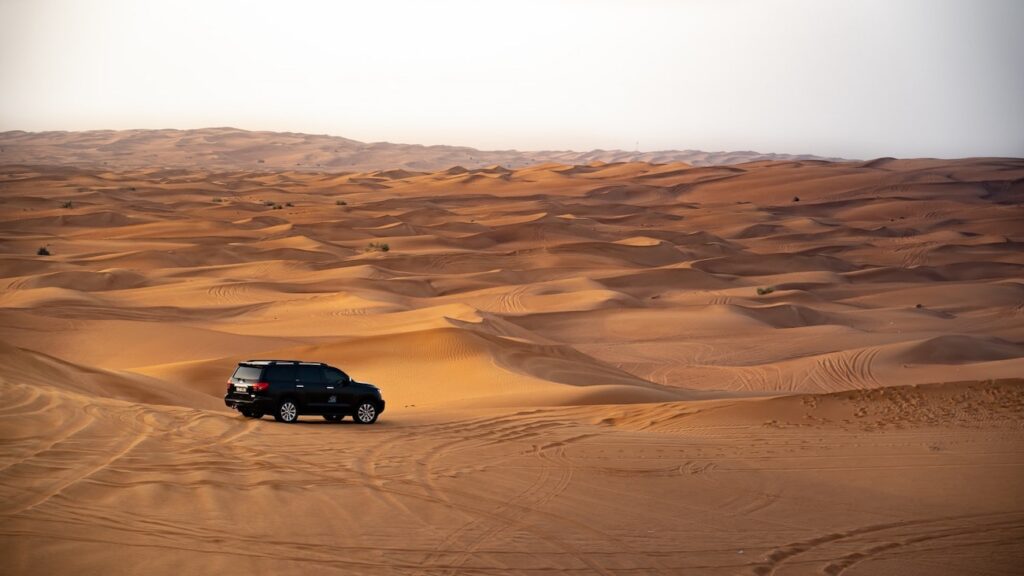
What to Expect in Dubai Desert Safaris
A typical desert safari in Dubai is an immaculate sum up of nature, adventure and most amazing cultural and traditional experiences . In fact, you can look forward to enjoy the following on your desert safari. That said, there will be variations in inclusions, dependent on your chosen Dubai desert safaris.
- Dune Bash A dune bash includes the use of a powerful 4X4 vehicle which is maneuvered by an expert driver. Sure enough, this will navigate you through the seas of low and high sand dunes in the most pulse-racing way. For adventurists , it goes without saying that this is one of the highpoints of the Dubai desert safaris.
Sunset or Sunrise Views Witnessing sunrise or sunset views or both is one of the specialties of most Dubai desert safaris . Whether you’re passionate about photography or not, you can’t help but capturing a few images of this phenomenal sight of sun coming out or descending amidst the raw desert beauty.
Experience the traditional Arabian Hospitality Following dune bash and brief stops along the way, you’ll be taken to the Bedouin style campsite . It’s where you’ll spend the rest of the time before your Dubai desert safari culminates. Your experience here starts with a warm welcome with Arabic coffee and fresh dates . And this would charge you up for the next set of adventures.
Camel Ride Take in the changing colors of the breathtaking desert dunes as you hop on to the camel back and enjoy a cool wobbly ride. Fun and thrill apart, it gives you an insight into the humble lifestyle of the ancient Emiratis as this friendly creature was the only means of transport and food in the pre-oil phase.
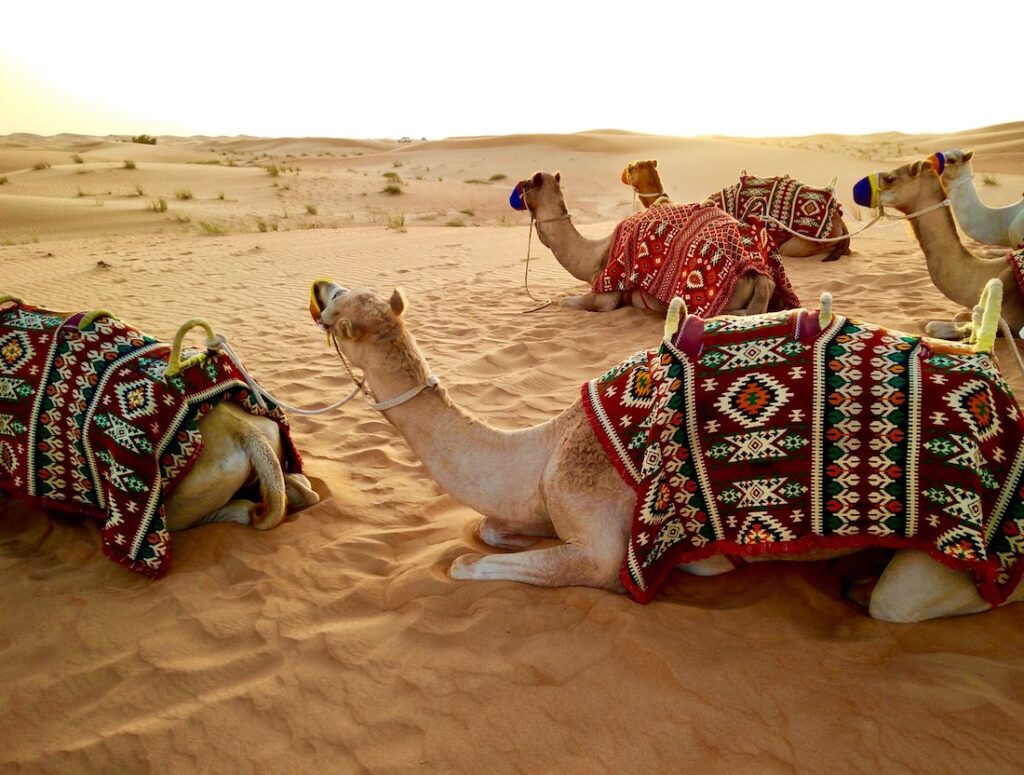
- Quad Biking There is quite nothing as exhilarating as riding a quad bike across the infinite expanse of the Arabian Desert. The best thing is that you don’t need to have any prior experience or specific license to try this . Just a brief orientation from experts will get you ready for this adventure-of-a-lifetime, the Dubai desert safaris.
Cultural Activities A desert safari is not all about adrenaline-pumping experiences; many activities included in it let you dig a little deeper into the intriguing traditions and cultural heritage. Have your hands tattooed with striking henna designs, try Shisha smoking, enjoy falconry , and be sure to capture some pictures wearing customary attire as a keepsake of the Dubai desert safaris.
BBQ Dinner This forms one of the main highlights of the evening or overnight Dubai desert safaris. The taste and quality of cuisines largely depends on the service provider you choose. For instance, Rayna Tours has one of the most lavish BBQ fares, enriched by live cooking stations and dedicated counters for fresh fruits, scrumptious ever traditional desserts etc.
Traditional shows From the sensuous belly dance show to the fabulously dervish Tanura and cool fire shows , there is a spectrum of amazing traditional entertainment, which makes your evening or overnight Dubai desert safari unforgettable.
Camping All Dubai desert safaris are more or less the same, but this is one thing that makes an overnight desert safari unique . All camping facilities are arranged in the midst of the desert means all left for you is to sit back and enjoy the nighttime glory of Dubai’s desert.
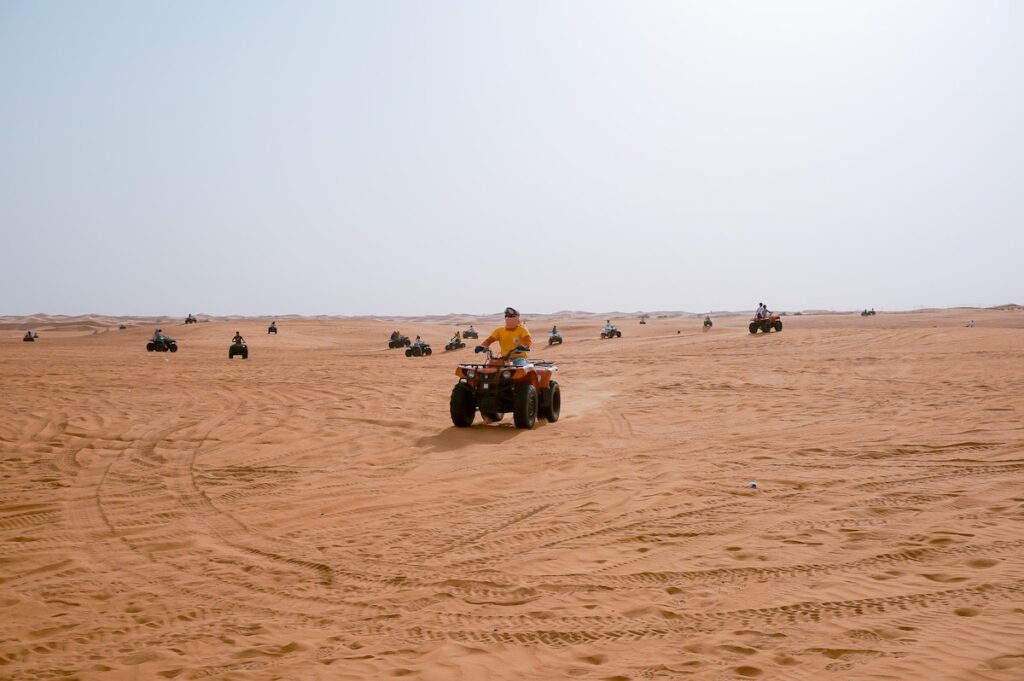
Types of Dubai Desert Safaris
There are many different types of Dubai Desert Safaris, let’s look into each of them below.
Morning Desert Safari Whether you’re short on time or just want to catch up with the inspiring desert flora and fauna, this is the best desert safari for you. And not forgetting the many adventure activities that fill up this desert safari, such as dune bash, camel ride, sandboarding, quad biking etc.
Sunrise Desert Safari See the desert awakening to life in its entire majesty and splendor! Kicking off before the dawn, this Dubai desert safari allows you to get the first-hand view of the sun gradually lighting up the sand dunes . Apart from these, it offers all other inclusions of a standard morning Dubai desert safari.
Hot Air Balloon Ride This is not a regular inclusion of the Dubai desert safaris. In fact, this is a premium experience reserved for those who wish to appreciate the natural grandeur of the magnificently preserved region of Dubai Desert Conservation Reserve (DDCR) .
Needless to say, this allows you to immerse yourself into the vastness and compelling exquisiteness of the desert landscape and its indigenous wildlife.
So be sure to sign up for this desert adventure if you wish to carelessly float in the air and sink into the majesty and tranquility of the surroundings . It also comes with traditional breakfast plus flight certificate and photographs of this experience.
Red Dune Safari Dubai desert safaris can’t get any better than a trip to the mysterious red dunes of Al Lahbab region . Whether you wish to go on a morning or evening desert safari, you can be rest assured of a fantastic desert trip augmented by enigmatic fun and thrill.

- Evening Desert Safari Kicking off in the late afternoon and extending well into the dusk, this is ideal for anyone looking for an epic desert safari experience in Dubai. This offers all inclusions of a morning desert safari , along with the perks of BBQ dining plus cultural experiences and traditional entertainment such as belly dance, Tanura show and more.
- Dinner in Desert Most people skip the desert safari during their Dubai trip, considering it as an adventure trip. But, in real, this is for every taste and ability. So if you want to forego all high-octane desert activities or experiences, simply opt for Dinner in Desert package . Yes, this Dubai desert safari is all about best dining options and super relaxed moments amidst the unparalleled desert sands.
- Overnight Desert Safari No matter you’re up for some distinct desert adventure or planning a romantic trip, this desert safari should be top on your Dubai bucketlist. It’s a perfect blend of all desert safaris as you get to participate in dune bash and cultural activities , together with the chance to dine and camp under the desert stars . That’s not all, witness the first rays of sun illuminating the desert land and complement this safari with a scrumptious traditional breakfast.

Top Desert Safari in Dubai
If you’re looking for the top desert safari in Dubai in advance, there are many options to find online. Below, you can find a list of Dubai desert safaris and bestsellers at an affordable price.
- Morning Desert Safari: Rates starting at $45.
- Sunrise Desert Safari : Rates starting at $95.
- Hot Air Balloon Desert Safari : Rates starting at $340 during sunrise.
- Red Dune Safari : Rates starting at $30.
- Evening Desert Safari : Rates starting at $80 for 6 hours.
- Dinner in Desert : Rates starting at $90 for a sunset dinner.
- Overnight Desert Safari: Rates starting at $100 with camping and dinner.
Tips for Choosing the Top Desert Safari in Dubai
- Now that you’ve this guide, the first step is to zero in on inclusions or experiences you would like to have in your Dubai desert safari.
- Pre-book it to avoid any last-minute confusions. But make sure that you get this part done through an experienced desert safari provider.
- Always choose a direct desert safari service provider ; the benefit is that there are no middlemen involved in this case, so you can expect maximum savings with utmost quality in every aspect of your Dubai desert safari.
- You can choose Dubai desert safaris with or without transfers . But our suggestion is to book it with roundtrip transfers , so that you can make the most of your desert safari without worrying about late night drive or losing the way to your Dubai accommodation.
- When it comes to transfers, you can opt for shared or private transfers . Shared transfer is cost-effective , while private transfer is exclusively arranged for you and your group . But it’s not just transfers; every aspect of your desert trip can be customized as per your group’s unique preferences.
- Wear comfortable modest clothes for your desert trip. Complete your look with right accessories like sunglasses, hats and more for that picture worthy moment.
- Don’t forget to apply sunscreen lotion or cream .
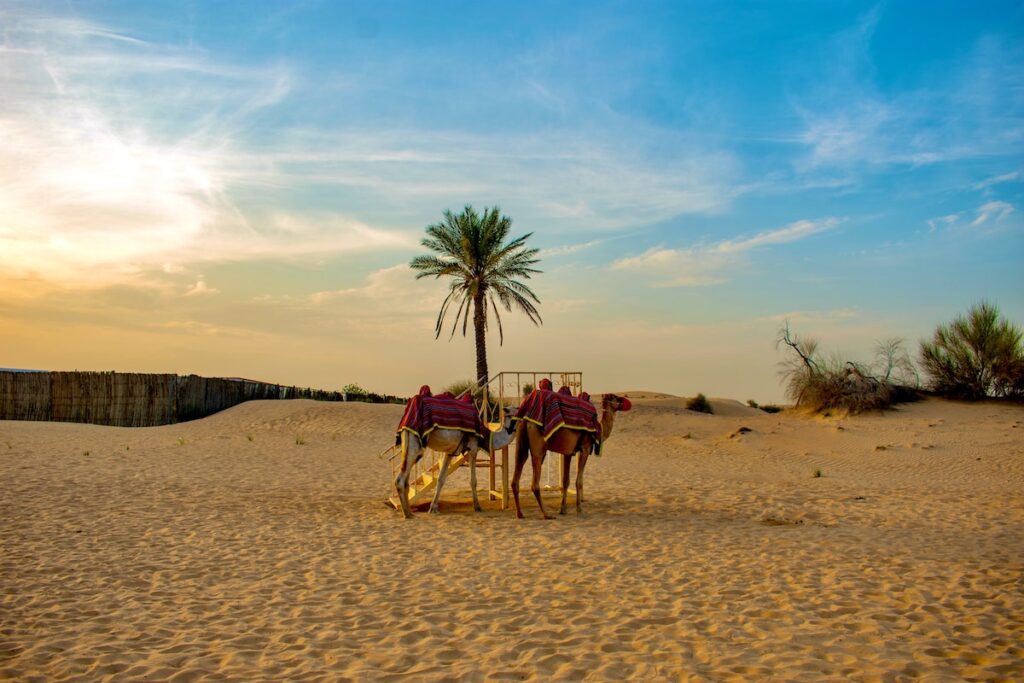
Final Thoughts on the Best Dubai Desert Safaris
So go forth and take your pick from the above list of desert safaris! Right from the moment you land in the desert, you’ll realize that there is nothing exaggerating about this trip as every cliché revolved around it turns out to be an unforgettable reality.
Have you ever been to a Dubai Desert Safari? What are some of the best Dubai Desert Safaris you have experienced? We’d love to hear your questions or travel stories in the comments below!

Neha is a travel blogger who enjoys traveling, meeting new people, and learning about the local culture and food. She is always looking forward to visiting new places and likes to play tennis in her spare time.

Best of Singapore on a Budget – Ultimate Guide You Need (2023)
Best place to see wat arun at night, sunset and sunrise (+ free map), lion’s pavilion hong kong: free alternative to the peak tower, 21 thoughts on “ultimate guide to dubai desert safaris: all you need to know (2023)”.
Wow great read! Thanks for sharing, this is definitely one of those bucket list things for me now!
Adding Safari to my bucketlist! Thanks for sharing this.
Great information! Pinned to refer to later as we hope to travel to Dubai one day.
Great post! Like everyone else it’s also on my bucket list to visit Dubai and if I have the time, I want to visit the Dubai desert too.
This truly sounds like an amazing adventure! I never even thought of going to the desert while in Dubai!
Dubai is on my bucket list for next year. Thank you for this guide, it’s been very helpful! 🙂
I have always seen photos of desert safaris but never looked into it, so this was extremely helpful! An African Safari has been at the top of my bucket list for so long, but now this might be too. I have always wanted to see those desert views in person, will definitely be saving this blog!
I never looked into a desert safari but would seriously consider doing this. I only done a one day/night trip into the desert but it wasnt an safari in Tunisia. However I loved the short experience and I would consider doing this in Dubai. I would love to check out these views and say I have done something away from the city. I am more at home with nature and natural landscapes.
Hi there, We did this a few years ago and did the combo. We did dune riding in the jeeps, then went to dinner with a show. It was a great afternoon/evening out that I would recommend to anyone. Nikki
If I ever brave the insanely long fight to Dubai, a desert safari is a high priority! I love the idea of spending the day on the sand dunes before returning to the camp for BBQ, belly dancing and a fire show. I’m shocked by how affordable an overnight safari is!
This is really helpful. A trip to the desert safari has been part of our bucket list. I look forward to the camel ride and enjoy fresh dates. Saving this post for future reference once we have the chance to visit Dubai again.
I’d love a chance to visit the incredible Dubai Desert, as you pointed out it’s such a unique dichotemy compared to the glitz and glam of Dubai itself. The different styles were interesting to consider and I’d never heard of a dune bash before, but I think for my style of travel the Bedouin experience or the sunrise views are some of my favourites. There are a lot of things here to consider before booking so thanks for sharing all these thoughtful details.
Wow, such an extensive list for safaris. I wish I had known before I visited Dubai. I have done only the jeep safari in the desert when I visited Dubai the last time. It was during sunset and it was an amazing experience.
If I go to Dubai, this would be high on my list. I’ve done a camel safari in India, but for some reason, a desert safari in Dubai sounds more appealing, because… it’s the Middle East. I don’t know, it just sounds more authentic to me. I’d love to try dune bashing in the desert.
Whenever I think of Dubai the first thing that comes to mind is the Safari in the desert. So this was such an interesting article and so much of relevance to me. Makes my desire to be there increase many fold. It was nice to imagine being there through your post till we are actually there. Hopefully soon.
Dubai has always been on my travel list! I want to go even more now.
Dubai is on my place to see lost. Will be adding safari it as well. Thanks for sharing
This post brought back all those sweet memories from my UAE trip. I had been to this Arabian country 4 years ago. Needless to say, I love every single day spent in the city. From the towering buildings ready to touch the sky, the food, endless indoor and outdoor adventure, Dubai is the most-loved city for tourist from around the world. Among all the adventures that I experienced in Dubai, Desert Safari has been my favorite. The while-knuckle ride in a powerful 4×4 SUV is unforgettable, the camel ride amazing, the quad-biking thrilling, and the food and entertainment activities in the camp right in the middle of the desert are awesome. Thanks for tips on how to book Desert Safari.
I am planning to visit next to Dubai I will add desert safari in my tour sure thanks for sharing
Hi there, great article! I really enjoyed reading about the different experiences and activities one can expect when going on a Dubai desert safari. It’s fascinating to see how one can disconnect from the hustle and bustle of the city and immerse themselves in nature and culture. I particularly liked how you highlighted the different types of desert safaris available, such as the Hot Air Balloon Ride and the Red Dune Safari, which cater to different preferences and interests. It’s amazing how much there is to see and do in the desert beyond just dune bashing! Thanks for sharing this informative and exciting piece.
great knowledge very informative blog
Leave a Comment Cancel Reply
Your email address will not be published. Required fields are marked *
Save my name, email, and website in this browser for the next time I comment.
Copy short link
- Environment
- Road to Net Zero
- Art & Design
- Film & TV
- Music & On-stage
- Pop Culture
- Fashion & Beauty
- Home & Garden
- Things to do
- Combat Sports
- Horse Racing
- Beyond the Headlines
- Trending Middle East
- Business Extra
- Culture Bites
- Year of Elections
- Pocketful of Dirhams
- Books of My Life
- Iraq: 20 Years On
Top five places to see wildlife in the UAE, from Sharjah Safari to Dubai Safari Park
Now, you can see and even interact with wild animals at a number of places in the emirates, sharjah safari opens its doors.
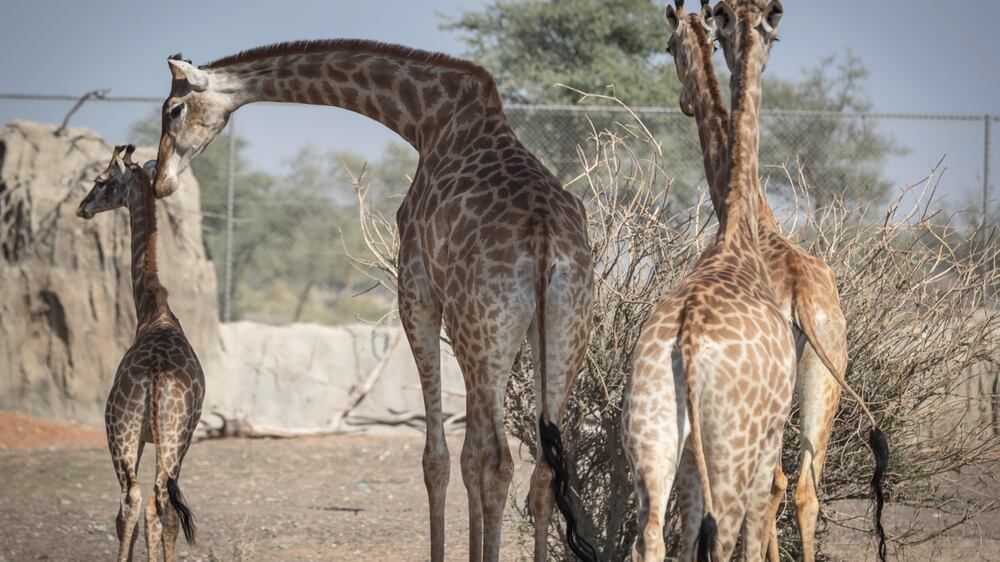
This week, the sprawling Sharjah Safari joined the UAE's growing list of attractions where visitors can get up close and personal with wildlife, including some rare and endangered species.
The 800-hectare park in Al Dhaid, about 49 kilometres from the Sharjah city, has been seven years in the making.
“This safari is authentic. When you drive around early morning or late in the afternoon, you forget you are in the UAE — it feels as if you are in Africa," Kevin Budd, the operations manager for animals at Sharjah Safari told The National , on its opening day.
Here are the top places to see wildlife in the UAE:
Sharjah Safari
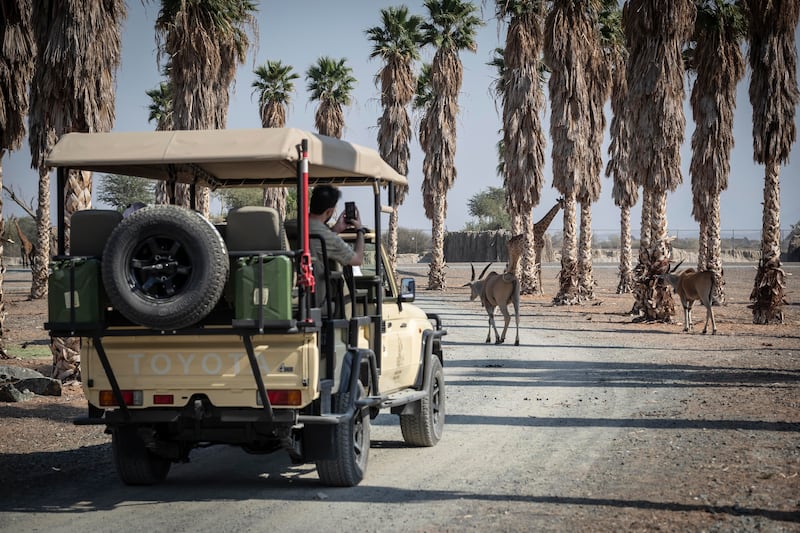
Sharjah Safari covers an area of eight square kilometres. All photos: Antonie Robertson / The National
The UAE's latest wildlife attraction was designed to replicate a real African safari. Across 12 environments, each representing a region in Africa, visitors will be able to experience the life and terrain of the animals and birds that live in them.
Currently, about 600 animals including lions, giraffes and rhinos call the Sharjah Safari home, with about 300 more expected to arrive later this month and in March. One of the star attractions is Wuhaida, the first female southern white rhino born in Sharjah Safari in August last year. Wuhaida's birth is the result of the safari's breeding programme, supported by the UN, that focuses on African native species.
Visitors will also be able to meet Bridi, the first African female giraffe born in Sharjah Safari. Both Wuhaida and Bridi's parents arrived at the Sharjah Safari in May 2017.
Conservation is also an important aspect of Sharjah Safari's operations. Through the emirate's Environment and Protected Areas Authority, which help develop the park, the attraction will become a centre for international captive breeding programmes for key species, and will partner with the European Association of Zoos and Aquaria.
Open daily, 8.30am-6.30pm; tickets are from Dh15 for children and Dh40 for adults for a guided Bronze walking tour and go all the way up to Dh3,500 for a group of 12 people in a luxury car in the Gold category; 06 803 7666
Dubai Safari Park
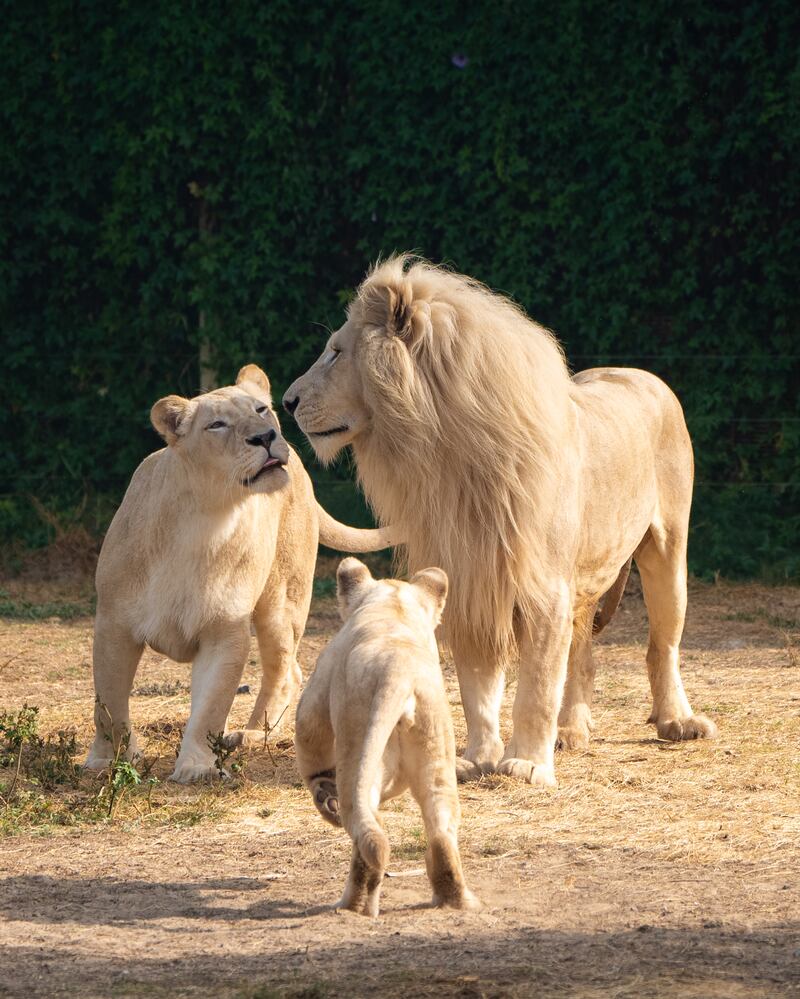
Dubai Safari is poised to welcome visitors back on September 27. All photos: Dubai Safari Park
Home to more than 3,000 animals, the 119-hectare attraction in Al Warqa first opened its doors in 2017, but closed six months later to “enhance the visitor experience”. If finally reopened in 2020 under a new management with a focus on conservation, education and sustainability.
Spread across five different zones — Africa, Asia, Arabian Desert Safari, Explorer and Adventure Village — Dubai Safari Park is made up of vast green spaces surrounded by waterfalls and artificial rock faces, and plenty of spaces for its main inhabitants. A drive-through safari, with a bus carrying guests through a series of gated enclosures, is also available.
Open daily, 9am-5pm; tickets are priced at Dh50 for adults and Dh20 for children; 800 900, www.dubaisafari.ae
The National Aquarium, Abu Dhabi

The National Aquarium Abu Dhabi opened to the public in November. All photos by Ruel Pableo for The National
Located in Al Qana , a new waterfront destination in the capital, The National Aquarium Abu Dhabi is the largest aquarium in the Middle East, spanning more than 9,000 square metres, and home to 46,000 creatures and 300 species.
Opened in November last year, the attraction is divided into 10 zones: the UAE’s Natural Treasures, Red Sea Wreck, Atlantic Cave, The Sub, Ring of Fire, Ocean Magic, Frozen Ocean, Flooded Forest, Bu Tinah Island and Back of House.
One of the most popular zones is the Flooded Forest where visitors can find the super snake, a female reticulated python aged 14 that weighs 115 kilograms. The area also has more than 8,000 rainforest creatures, including free-roaming birds that fly around and yet don't go near guests.
Super Snake: The UAE is now home to the largest living snake on display in the world

Rehabilitation and conservation is also a priority. In July 2020, the aquarium signed a five-year partnership with The Environment Agency – Abu Dhabi, “with the aim to help create the largest and most innovative rehabilitation schemes of its kind to protect and rehabilitate wildlife in the emirate of Abu Dhabi".
"The partnership has resulted in a large number of animals saved, including 200 turtles being successfully rescued and released until today," said Paul Hamilton, general manager of The National Aquarium.
Open daily, 10am-10pm; 02 418 6666 , www.thenationalaquarium.ae
Emirates Park Zoo & Resort
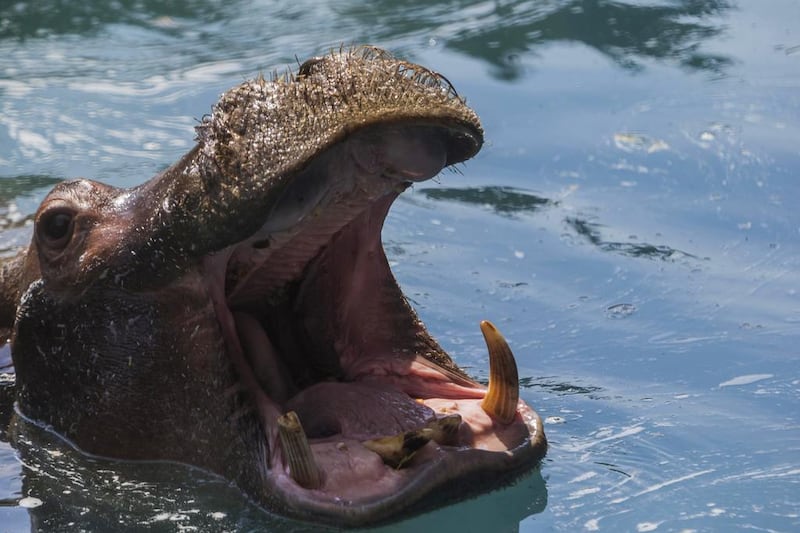
This private zoo on the outskirts of Abu Dhabi opened in 2008 and is home to more than 1,400 animals including mammals, reptiles, fish and birds. The zoo not only lets visitors interact with many of its inhabitants, but also offers luxury chalet-style overnight stays.
Tours on offer include giraffe feeding , monkey feeding and hippo feeding, while Keeper's Talk, meant as an educational experience, gives guests the lowdown on about the zoo's wildlife.
Open daily, 9am-8pm; tickets start at Dh40; 02 501 0000, www.emiratesparkzooandresort.com
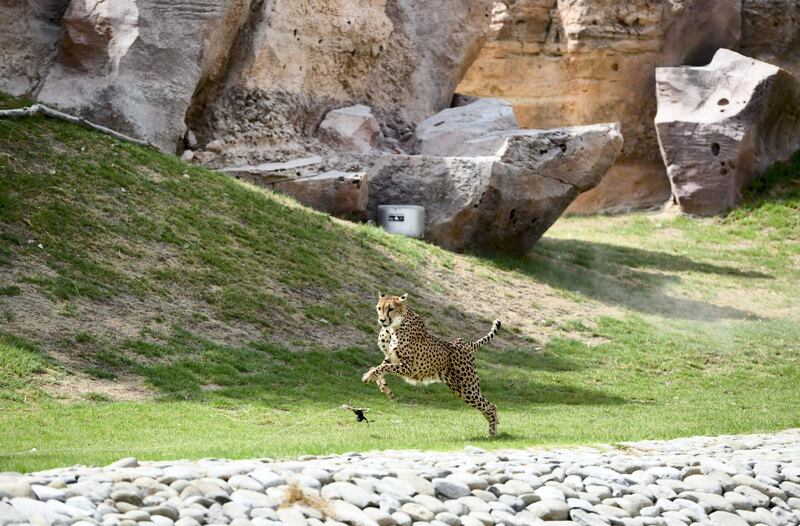
Cheetahs are encouraged to exercise in Al Ain Zoo through a process of positive reinforcement. Khushnum Bhandari for The National
More than 4,000 animals and creatures live on this 900-hectare parkland in the foothills of Jebel Hafeet . Founded in 1968 by Sheikh Zayed, the Founding Father, the zoo is home to oryx, giraffe, Barbary sheep, rhinos, hippos, tigers, lions and more. Kids will enjoy the petting zoo and there’s also a well-respected conservation and breeding programme.
Visitors can choose from various activities including The Cheetah Journey, The Rhino Journey and The Tortoise Journey.
An attraction called Al Ain Safari , which currently covers a 54-hectare section of the zoo, offers one of the world’s largest man-made safaris where you can encounter the Big Five (lion, leopard, rhino, elephant and buffalo) from the safety of an SUV or safari truck. Emirati safari guides will take the lead, giving you more information about the animals and the surrounding landscape as you drive.
Open daily, 9am-6pm; tickets start at Dh9.45 for children and Dh28.35 for adults; 800 966, www.alainzoo.ae


Dubai Zoo Safari Park Tickets
Experience the Wonders of Dubai Zoo Safari Park: Secure Your Tickets Now for an Unforgettable Adventure!
Dubai Zoo Safari Park Visitor
3,000 animals, 78 species, all in a 119-hectare oasis. Meet rare creatures up close, enjoy spectacular shows, and savor delicious meals in the heart of Dubai’s wildlife paradise.
🦁 Exotic Encounters: Meet rare and exotic animals up close, from lions to giraffes, and engage in interactive encounters.
🎪 Spectacular Shows: Be amazed by thrilling animal shows featuring our talented stars, from birds to acrobats.
🍔 Delicious Dining: Savor delicious meals amidst lush greenery.
📅 Plan Your Visit: Dubai Safari Park, a grander vision since December 2017, promises unforgettable adventures. Book your tickets now and embrace the wild side of Dubai! 🎫🐾
There are currently two types of tickets to Dubai Zoo Safari Park: an Entry ticket and a ticket for Safari Journey:

Entry Ticket to Dubai Safari Park
- Entry to Dubai Safari Park
- Access to African Village & Asian Village
- Explorer Village (on your own/bus ride exclusive for Safari Journey Upgrade)
- Access to Al Wadi
- Access to Kids Farm
- Live animal & bird shows

Tickets to Dubai Safari Park with Safari Journey
- Admission to Dubai Safari Park
- 35-min guided Safari Journey
- 10-min Arabian Desert Safari
- Train service
- Walking tour through Al Wadi
- Access to the Explorer Village, African Village, & Asian Village
Currently, entry tickets aren’t available, but you can book a private Summer package for day or night. Check out the availability on the official website.
Dubai Zoo Safari Park Ticket Prices
The Entry ticket costs 45 AED or ~$12 USD. The upgraded ticket with the Safari Journey costs 80 AED or ~$22 USD. However, the park has been closed for the summer and is set to reopen in September 2023.
During the previous season, the Dubai Zoo ticket prices were the following:
Dubai Safari Park Timings
Pick the best time to visit Dubai Zoo Safari Park
Last entry at the main gate:
- For ticket holders 4:00pm
- For non ticket holders 3:30pm
Unfortunately, Dubai Safari Park with Safari Journey is temporarily closed for the summer and set to reopen in September. Meanwhile, you can book a private Summer Package for morning or night.
The morning package gets you a private adventure for two hours between 8 AM and 10 AM.
With the night package you can visit Dubai Zoo Safari Park privately between 6 PM and 8 PM.
Unique Experiences in Dubai Safari Park
Get up close to your favorite animals, learn more about them, and even feed some of them!

Rhino Feeding

Bird Feeding

Safari Journey

Giraffe Feeding
Dubai safari park areas, african village.
African village is packed with African animals of all sizes. From a huge African elephant and giraffe to a small meerkat, you will find them all here. Enjoy the true taste of Africa at Dubai Safari Park Zoo.
Arabian Desert Safari
Arabian Desert Safari is a drive-through attraction that features iconic species of the Arabian peninsula, like Arabian wolf, oryx, gazelle, etc.
Asian Village
Get ready for a wild ride at the Amazing Creatures of the World show! You’ll get to hang out with all sorts of cool animals doing their thing – soaring through the air, splashing around in the water, and strutting their stuff on land.
Explorer Village
This is the main attraction at the Dubai Safari Park. Hop on a comfortable bus and enjoy the one-in-a-lifetime drive-through experience, watching countless animals from all over the world! Also, a bird show and giraffe feeding experiences are waiting for you.
Dubai Safari Park Location
Dubai Zoo or Dubai Safari Park is located at Al Warqa 5, on the highway to Al Aweer. It is 15 minutes away from Downtown Dubai and 30 minutes from the Dubai International Airport.
Dubai Zoo Safari Park Photos
Check out some photos from the Dubai Zoo Safari Park from the visitors!

Popular currencies
More currencies.

Tickets to Dubai Safari Park with Safari Journey
- Instant confirmation
- Mobile ticket
Embark on a 35-minute guided Safari Journey at the Dubai Safari Park. Discover the beauty and diversity of animals from all around the world.
Explore the Dubai Safari Park's expansive wildlife, home to over 2,500 animals.
Enjoy a comfortable and convenient 35-minute safari journey in an air-conditioned bus, guided by experienced safari guides.
Discover a vast array of majestic big cats, elephants, and more in the Park's four distinct zones - the African, Asian, Explorer villages, and the Arabian desert.
Watch mesmerizing shows at the amphitheater including the popular 'Birds of Prey' performance.
Did you know? The Dubai Safari Park is the largest animal park in the United Arab Emirates, covering 119 hectares of land.
Admission to Dubai Safari Park
35-min guided Safari Journey
10-min Arabian Desert Safari
Train service
Walking tour through Al Wadi
Access to the Explorer Village, African Village, & Asian Village
Live animal & bird shows
Cancellation policy
These tickets can't be cancelled. However, you can use them any time until 30 Jun, 2025.
Ratings & Reviews
Ticket validity.
These tickets are valid until 30 Jun, 2025.
Your Experience
Get closer to nature on the safari journey.
The Dubai Wildlife Safari Journey is a 35-minute guided tour that takes visitors on an exciting adventure through the park's natural habitats and animal enclosures. The tour begins at the park's main entrance, where visitors will meet their knowledgeable and experienced guide. From there, the group will embark on a safari-style journey through the park's vast landscapes, traveling by open-air vehicle. As you travel deeper into the park, your guide will provide informative and engaging commentary on the wildlife you encounter, sharing fascinating facts and stories about the animals and their natural habitats.
Spotting Exotic Wildlife from Around the World
Travel through the African, Asian, and Arabian habitats of the park, each offering a unique and immersive experience. In the African habitat, you will be able to see the majestic lions, chimpanzees, and elephants in their natural surroundings, while the Asian habitat is home to a variety of colorful and exotic birds and mammals. The Arabian desert showcases the beautiful and majestic Arabian oryx, as well as a variety of other native species.
The Kid's Farm, which houses a bird aviary and a petting area, is a must-visit place if you want to witness a variety of avian species and get up close and friendly with animals like camels, goats, and sheep.
Operating hours
Dubai Safari Park
Know Before You Go
Important information.
Click here for a detailed map route.
Facilities: Wheelchair Accessibility, Free Wi-Fi, Parking, Restaurants, Cafes, Baby Changing Rooms, Prayer Rooms, Souvenir Photos.
It's recommended to wear comfortable clothing and footwear.
Bring along your sunglasses, sunscreen, and hat.
Guests are required to collect their Safari Journey wristbands at the ticket counter prior to admission.
Restrictions
Guests are subject to screening by the Security Team upon entering the park.
Strict Dress Code : It's mandatory to wear clothes that cover shoulders and knees.
Note that the following are not allowed on this tour: drones, pets, flash photography, balloons, balls, toy guns, bicycles, scooters, skateboards, and roller skates.
Operating Hours
Daily from 9am to 5pm
Last entry at 3:30pm for guests without tickets & 4pm for online ticket holders.
Safari Journey
Daily: 9am to 4:30pm
Safari Bus departs every 30 mins
Show Timings
Daily: 12pm & 2pm
Duration: 25 min
Located in Bird Theatre, Explorer Village
Amazing Creatures of the World
Daily: 1pm & 3pm
Located in Asian Theater, Asian Village
Birds of Prey
Located in Birds of Prey Square, Explorer Village roundabout
Animal Interactions
Giraffe Feeding
Daily: 10:30am, 12:30pm, 2:30pm, & 4pm
Located in Explorer Village
Birds Feeding
Daily: 12pm & 3:45pm
Located in Kids Farm
Goat Feeding
Daily: 10am, 1pm & 3pm
Located in Wadi
Guinea Pigs Encounter
Daily: 10am - 2pm
Located in the main building
Your voucher will be emailed to you instantly.
Please proceed to the entrance line with the ‘e-ticket’ and a valid photo ID.
Ticket Redemption Point
Show your ticket at Dubai Safari Park .
Address: Al Warqa 5 at the Hatta road, Opposite Dragon Mart Dubai.
Get Directions to the Redemption Point
Getting There
The closest bus stop is Dubai Safari Park. It is a quick 11-minute walk to the attraction.
Board bus F10 to get you there.
Why Headout?
Similar experiences you'd love.

Top things to do in Dubai

Browse By Themes
Nearby cities to explore.

World at your tap.

We've served 25 million+ guests and we are here for you
25 million +
In the Media
24 x 7 Help Center
- Latest News
- Emergencies
- Ask the Law
- GN Fun Drive
- Visa+Immigration
- Phone+Internet
- Reader Queries
- Safety+Security
- Banking & Insurance
- Dubai Airshow
- Corporate Tax
- Top Destinations
- Corporate News
- Electronics
- Home and Kitchen
- Consumables
- Saving and Investment
- Budget Living
- Expert Columns
- Community Tips
- Cryptocurrency
- Cooking and Cuisines
- Guide to Cooking
- Art & People
- Friday Partner
- Daily Crossword
- Word Search
- Philippines
- Australia-New Zealand
- Corrections
- From the Editors
- Special Reports
- Pregnancy & Baby
- Learning & Play
- Child Health
- For Mums & Dads
- UAE Success Stories
- Live the Luxury
- Culture and History
- Staying Connected
- Entertainment
- Live Scores
- Point Table
- Top Scorers
- Photos & Videos
- Course Reviews
- Learn to Play
- South Indian
- Arab Celebs
- Health+Fitness
- Gitex Global 2023
- Best Of Bollywood
- Special Features
- Investing in the Future
- Know Plan Go
- Gratuity Calculator
- Notifications
- Prayer Times
Dubai Safari roars back to life on September 27 for new winter season
- Environment
New species, behind-the-scenes experiences offer close encounters and selfies galore
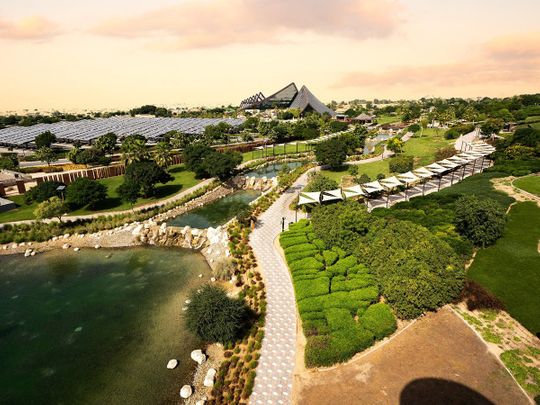
Also in this package
- LOOK! Ryder Cup 2021 - Team Europe size up Whistling Straits
- In photos: Country pavilions tackling climate change on Expo 2020’s ‘People for Planet’ journey
- From the Editors: Keeping Alzheimer’s at bay with new treatment in Dubai
- In photos: Emirates Pavilion wows with ultra-futuristic displays at Expo 2020 Dubai
- ‘Inside Burj Al Arab’, a unique guided tour of the iconic landmark
- In Pictures: After oil, gas and renewables head GCC’s energy agenda
Dubai: Dubai Safari Park will reopen on September 27 (Monday) for its new season while offering for the first time a behind the-scenes experience that allows visitors to get close to the animals.
The attraction offers experiences with its diverse community of animals from across the world that live in a climate-controlled environment close to their natural habitat. Each season, the Park revitalises its attractions.
This season, new species and 111 new-borns of different animals are among the additions. There will also be shows and activities for recreational and educational experiences.
Rare exhibits
Dubai Safari is home to the world’s first drive-through crocodile exhibit as well as the UAE’s largest group of baboons, the largest drive-through lion exhibit, and the country’s only drive-through hippo and tiger exhibits.
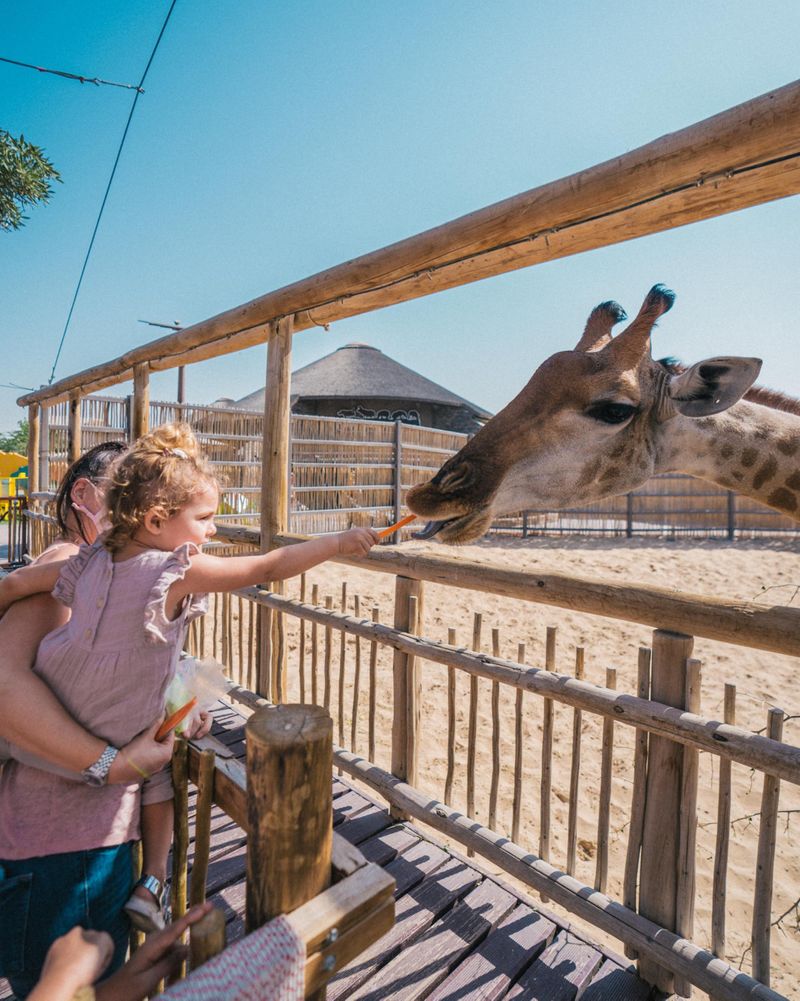
3,000 animals
The park’s walk-through aviary has birds from all around the world. The 116-hectare destination, which maintains “the highest global standards of animal welfare and conservation”, is currently home to around 3,000 animals, including 78 species of mammals – 10 different carnivores and 17 primates – 50 types of reptiles; 111 kinds of birds as well as amphibians and invertebrates.
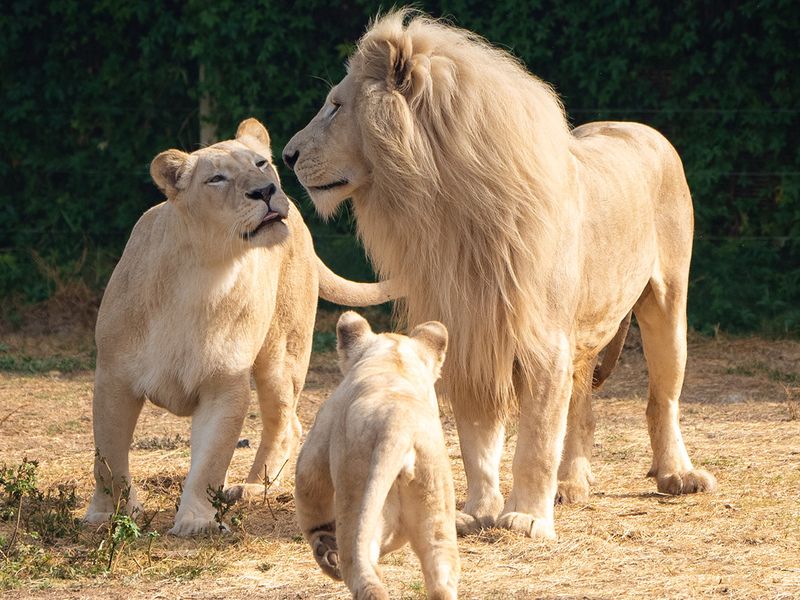
New offerings
In its new season, visitors can see new animals, such as the squirrel monkey, the Mona monkey, the Arabian wolf, and the northern white-cheeked gibbon. In addition, the park has 111 newborns of different animal species. Dubai Safari has been working with local and international programmes throughout the year to introduce, incubate and exchange new animals. Its animal breeding programme has also added new animals before the start of the new season.
The winter season of Dubai Safari will host various exhibitions such as the Leopard Exhibition and interactive shows such as the bird show, a display of ‘amazing creatures of the world’ and birds of prey. Various areas of the Park such as the Arabian Desert Safari have been redeveloped to be more engaging for visitors.
Wolves’ welfare
The area devoted to Arabian wolves has been expanded by 10,000 square meters. The area contains many local trees and plants, in addition to unique formations of sand dunes and water, which have been developed to create a suitable environment for these animals. This area is considered the largest island sheltering Arabian wolves. Dubai Safari features two groups of Arab wolves through which it aims to establish an animal welfare programme in cooperation with various institutions in the region.

Close encounters
The park offers experiences for all members of the family, which include feeding the animals and opportunities to take souvenir photos. The ‘Safari Journey Package’ enables visitors to enter the African Village, the Explorer Village, the Safari Journey, the Asian Village, the Arabian Desert Safari and the Kids Farm, in addition to having access to the train service and reserved seats in the live shows.
For the first time, the Safari Park is offering a behind the-scenes experience, which allows visitors to get close to the animals, learn about their habitat and ways of caring for them with the guidance of an animal shepherd. The park also has a Jungle Photographer’s package intended for photography enthusiasts.
Busy season
With Dubai hosting Expo 2020 Dubai and travel restrictions in the Gulf region and worldwide easing up further, the emirate is set to see a significant rise in regional and international tourism. Industry experts believe Dubai will be the world’s most sought-after tourism destination between October this year and March 2022.
Aligned with Dubai Municipality’s plan to create world-class recreational destinations, the Dubai Safari Park has played a major role in enriching Dubai’s value proposition for the global tourist.
Ahmed Al Zarooni, Director of Public Parks and Recreational Facilities Department, Dubai Municipality, said: “The Park offers an immersive animal safari experience that is among the best in the world. Not only can visitors come face-to-face with diverse animals, including ungulates, carnivores, birds, reptiles, primates and small mammals, including several endangered ones, they also have opportunities to learn about their nature and habitats in detail.”

UAE rains not due to cloud seeding, says NCM official

Distance learning extended till Friday in Abu Dhabi

Watch: Sharjah deploys 600 personnel, 670 water tankers

Presidents of UAE, Costa Rica witness signing of CEPA

UAE: Rough weather that brought heaviest rains ends

UAE: Private firms urged to adopt ‘flexible’ work
Raj kundra's assests and property seized by ed: reports, scottie scheffler back to work after masters triumph, korda chases fifth straight victory to tie lpga record, 1244 dxb flights cancelled over two days, uae mega-insurer buys majority stake in saudi entity.

Get Breaking News Alerts From Gulf News
We’ll send you latest news updates through the day. You can manage them any time by clicking on the notification icon.

‘This Will Finish Us’
How Gulf princes, the safari industry, and conservation groups are displacing the Maasai from the last of their Serengeti homeland

Listen to this article
Listen to more stories on curio
This article was featured in the One Story to Read Today newsletter. Sign up for it here .
I t was high safari season in Tanzania, the long rains over, the grasses yellowing and dry. Land Cruisers were speeding toward the Serengeti Plain. Billionaires were flying into private hunting concessions. And at a crowded and dusty livestock market far away from all that, a man named Songoyo had decided not to hang himself, not today, and was instead pinching the skin of a sheep.
“Please!” he was saying to a potential buyer with thousands of animals to choose from on this morning. “You can see, he is so fat!”

Explore the May 2024 Issue
Check out more from this issue and find your next story to read.
The buyer moved on. Songoyo rubbed his eyes. He was tired. He’d spent the whole night walking, herding another man’s sheep across miles of grass and scrub and pitted roads to reach this market by opening time. He hadn’t slept. He hadn’t eaten. He’d somehow fended off an elephant with a stick. What he needed to do was sell the sheep so their owner would pay him, so he could try to start a new life now that the old one was finished.
The old life: He’d had all the things that made a person such as him rich and respected. Three wives, 14 children, a large compound with 75 cows and enough land to graze them—“such sweet land,” he would say when he could bear to think of it—and that was how things had been going until recently.
The new life: no cows, because the Tanzanian government had seized every single one of them . No compound, because the government had bulldozed it, along with hundreds of others. No land, because more and more of the finest, lushest land in northern Tanzania was being set aside for conservation, which turned out to mean for trophy hunters, and tourists on “bespoke expeditions,” and cappuccino trucks in proximity to buffalo viewing—anything and anyone except the people who had lived there since the 17th century, the pastoralists known as the Maasai.
They were the ones tourists saw through their windshields selling beaded key chains at the gates of Serengeti National Park, or performing dances after dinner at safari lodges. They were famous for their red shawls and recycled-tire sandals. They grazed their cattle with zebras and giraffes, and built mud-and-dung houses encircled by stick fences barely distinguishable from the wild landscape. They were among the lightest-living people on the planet, and yet it was the Maasai who were being told that the biggest threat to conservation and national progress was them. Their whole way of life had to go.
From the April 2020 issue: Ed Yong on the last giraffes on Earth
And so Songoyo, after considering his alternatives, had devised a last-ditch plan for his own survival, one that had brought him to a town in Kenya called Aitong, where a cool wind was slapping sand and dung into his face as he scanned the market for buyers. He was far from home, roughly 65 miles north of the village in Tanzania where he had been tear-gassed and shot at for the first time in his life. He had seen elderly men beaten and guns fired at old women, and now it was down to this: He was a herder for hire, working for a distant relative, trying to make enough money to buy one single cow.
“Come!” he called to the buyers who kept passing his herd and weaving through the bleating mass. “You will not find any better!”
This was his plan: one cow, because that was the starting point of what it meant to be a Maasai man, which was what he still wanted to be.
The forces arrayed against Songoyo, whom I met in the course of two long trips to Tanzania late last year, include some of the world’s most powerful people and interests. (I have not used Songoyo’s last name out of concern for his safety.) What these people and interests want is what the Maasai are trying to keep: the land they live on.
Global leaders are seeking what they consider to be undeveloped land to meet a stated goal of conserving 30 percent of the planet’s surface by 2030 . Corporations want undisturbed forests in order to offset pollution. Western conservation groups, which refer to the Maasai as “stakeholders” on their own land, exert great influence, as does a booming safari industry that sells an old and destructive myth—casting the Serengeti as some primordial wilderness, with the Maasai as cultural relics obstructing a perfect view.
The reality is that the Maasai have been stewards, integral to creating that very ecosystem. The same can be said of Indigenous groups around the world, to whom conservation often feels like a land grab. In the past two decades, more than a quarter million Indigenous people have been evicted to make way for ecotourism, carbon-offset schemes, and other activities that fall under the banner of conservation. That figure is expected to soar.
For all its accomplishments, the cause of saving the planet has become a trillion-dollar business, a global scramble in which wealthy nations are looking to the developing world not just for natural resources, but for nature itself. The wealthy players include not only Europeans and Americans but Arabs and Chinese and others. On the African continent, political leaders are enthusiastic about what so-called green foreign investment might mean for their own economies (and, maybe, their bank accounts).
Such are the pressures being brought to bear on northern Tanzania, where the Maasai migrated with their cattle 400 years ago, settling in an area encompassing hundreds of thousands of square miles of grassy plains, acacia woodlands, rivers, lakes, snowcapped mountains, salt flats, forests, and some of the most spectacular wildlife on the planet. They called it Siringet, which in the Maa language means “the place where the land runs on forever.” The Maasai see their recent history as a struggle to save that land from those who claimed it needed saving.
First came the British colonial authorities, who established the 5,700-square-mile Serengeti National Park, pushing the Maasai to an adjacent zone called the Ngorongoro Conservation Area, with its famous crater, where they were promised they could live. Then came UNESCO. It declared both Serengeti and Ngorongoro to be World Heritage Sites, which came with new restrictions. Western tourists began arriving, seeking an experience of Africa that a thousand movies promised—one of pristine beauty and big game, not people grazing cattle. Tanzanian authorities began leasing blocks of land to foreign hunting and safari companies, many of which promoted themselves as conservationists—a word the Maasai have come to associate with their own doom. Spread among the villages that dot the northern tourist zone, the Maasai have meanwhile been growing in number—their population has doubled in recent decades, to about 200,000. Inevitably, the clash of interests has led to bitter and occasionally violent conflict.
Still, the threat unfolding now is of greater magnitude. It emerged soon after President Samia Suluhu Hassan took office, in 2021. “Tourism in Ngorongoro is disappearing,” she declared during one of her first major speeches. “We agreed that people and wildlife could cohabitate, but now people are overtaking the wildlife.” The Maasai listened with alarm, realizing that the people she was referring to were them.
Not long after Hassan’s speech, officials announced plans to resettle the roughly 100,000 Maasai who were living in and around Ngorongoro to “modern houses” in another part of the country. Meanwhile, in a region north of Ngorongoro, bordering Serengeti National Park, government security forces began rolling into Maasai villages. They were carrying out another part of the plan: annexing 580 square miles of prime grazing land to create an exclusive game reserve for the Dubai royal family, which had long hunted in the area. The government characterized the move as necessary for conservation. Traditional Maasai compounds, known as bomas , were burned. Park rangers began seizing cattle by the tens of thousands.

And more was coming: a $7.5 billion package with the United Arab Emirates , of which Dubai is a part, that included new plans for tourism and conservation. A $9.5 million deal with the Chinese for a geological park that overlapped with additional Maasai villages. An offer from Tanzania to make Donald Trump Jr.—an avid trophy hunter—an official “tourism ambassador.” New maps and proposals from the government indicated that further tracts could soon be placed off-limits, including a sacred site that the Maasai call the Mountain of God.
Read: What trophy hunting does to the elephants it leaves behind
“This is 80 percent of our land,” a Maasai elder told me one evening during a meeting with other leaders in northern Tanzania. “This will finish us.” They had tried protesting. They had filed lawsuits. They had appealed to the United Nations , the European Union , the East African Court of Justice, and Vice President Kamala Harris when she visited Tanzania in 2023. They’d unearthed old maps and village titles to prove that the land was theirs by law, not just by custom. They’d written a letter to John and Patrick McEnroe after hearing that the tennis stars were hosting a $25,000-a-person safari-and-tennis expedition in the Serengeti. People made supportive statements, but no one was coming to help.
This is what Songoyo understood as he paced the market in Aitong. It was closing soon. Buyers were filtering out through the wire fence, and he still had 12 sheep left to sell, one of which was lame. A man tapped it with a stick.
“A cow stepped on his leg; that’s why he walks like that,” Songoyo said, bracing the animal with his knees.
The man walked away. Another came and tapped his stick on the lame sheep, and then on the rest of them. They agreed on a price, and the buyer pulled out a roll of bills.
“Please, can you add 500?” Songoyo said, asking for the equivalent of an extra $3.60 in Kenyan shillings. “I need 500. Please.”
The man added 200, and Songoyo brought the day’s earnings to the relative who had hired him. They sat under a tree, and he counted out Songoyo’s share for a week of work, roughly $10. One cow would cost about $200.
“See you next week,” the man said.
“May God give you favor,” Songoyo replied, putting the money in the pocket of his blue track pants. His cellphone rang, a battered plastic burner.
“I am coming,” he told one of his wives, who was waiting for him at their home in Tanzania.
He’d had options other than this. There had always been Maasai who’d given up traditional ways to reinvent themselves, shedding their red shawls for all kinds of lives. Now many more of them, having lost their cattle, were moving to cities, where the Maasai reputation for bravery and rectitude meant there was always work as a security guard—I saw them everywhere in Arusha and Dar es Salaam, in front of shops and banks. Others had taken a government offer to resettle in a town called Msomera, far to the south, only to return home with stories of loneliness and conflict with locals. Still others were falling apart. Songoyo had seen them, drunk men hobbling along the road or passed out on their red shawls under trees in the daytime. That would not be him.
“Never,” he said, and began the long walk back to his village in Tanzania, a tall man wrapped in a pink-and-purple plaid shawl passing cinder-block taverns where he would not drink, and motorbikes he would not hire, because the point was to save money for the cow. No cows, no life , he told himself, picking up the pace along an orange dirt road stretching into the late afternoon.
His earliest memories were of cows; he had never been without them. They were the huge, warm, brown beasts kept in the center of the boma. Their dung formed the walls of his home. Their milk and blood were what he drank as a child, when his father told him what Maasai children were traditionally told: that when the earth split from the sky and God left the world, he entrusted the Maasai with all the cattle, and by extension the land and the other animals that shared it. Songoyo learned how to herd with rocks, pushing them around in the dirt. He got his first calf when he was a small boy, herding it with a stick near the boma. When he was big enough, he followed his older brothers out into the wider grazing areas, including one the Maasai called Osero , a word that refers to lush grasslands—in this case, the 580 square miles of land adjacent to Serengeti National Park where Maasai had lived and kept cattle for generations.
It was in Osero that he learned about different kinds of grasses and trees: which ones had good branches for bows or good bark for tea that could ease a backache. He learned where to find natural salt and the coolest streams, and he learned certain rules: Never cut down a tree. Keep cattle away from wildebeests during calving season, because they carry a disease deadly to cows.
He listened to older boys tell stories, including one whose lesson he still lived by, about a group of Maasai heading out on a cattle raid when one of the warriors broke his sandal. The warrior turned to the man behind him and asked if he would stay and help, but the man refused. He asked another, who also refused, and so on until the very last one agreed to stay, while the rest continued on to cattle-raiding glory. The stern moral was: Be prepared. Don’t fall behind. Stay with the group. Struggle.
Songoyo had struggled. He held himself together after his father died, when he was still a boy, a moment when he might have turned delinquent but didn’t. He endured his adolescent coming-of-age ceremonies with dignity, by all accounts managing not to cry or shake during his circumcision, when people scrutinize and taunt boys for any sign of weakness, and he was rewarded with cows. He learned how to shoot arrows and use a machete, and became a moran —entering a stage of life when young Maasai men bear responsibility for protecting their village—and was given more cows, each with a name, each with a certain character he came to know. In this way, the life he wanted became possible.
He married his first wife, then a second and a third, and eventually built a boma in the village where his children went to school, and a larger compound on the edge of Osero, where the cattle were kept, and where he’d had one of the happiest moments of his life. This was just before everything began to unravel, an otherwise ordinary day when the rains were full and the cows were fat and he’d walked out into the middle of them, their bells jangling, realizing how far he’d come and thinking, “Yes, I am a real Maasai.”
Not that life was an idyll. In village after village that I visited, people described years of tensions with safari companies and conservation authorities. People who lived within the Ngorongoro Conservation Area—a vast zone that was almost like its own country—had complained about schools falling apart and poisoned salt licks and the indignity of their identity being checked as they came and went through the tourist gate. In other areas, people had accused certain safari companies of illegally acquiring leases and paying local police to beat herders off concessions. One company was notorious for using a helicopter to spray scalding water on cows.
In Osero, the problems went back to 1992, when an Emirati company called Otterlo Business Corporation (OBC) was first granted a hunting license for the Dubai royal family. They had their own private camp and a private airstrip and, for the emir himself, Sheikh Maktoum bin Rashid Al Maktoum, a compound on a hill, guarded by a special unit of the Tanzanian military police. When the rains ended each year, cargo planes full of four-wheelers and tents and pallets of food would buzz low over villages before landing, followed by private jets delivering the royal family and their guests. A few weeks later, they’d buzz out with carcasses of zebras and antelope and other trophies. For a while, OBC had its own cellphone tower, and Maasai villagers noticed that when they were near it, a message would pop up on their phone screens: “Welcome to the U.A.E.” The arrangement had been that the Maasai were supposed to keep away when the royals were in residence, but just about everyone had caught a glimpse. Songoyo had seen them speeding around, shooting animals from trucks with semiautomatic rifles. “Once, they pulled up in the middle of my cows and I saw them shooting so many antelope,” he told me. “They just kill, kill, kill!”

There had been attempts at diplomacy. Sometimes the Arabs, as the Maasai called them, would give out bags of rice. They had hired Maasai men to work as guides and drivers and had flown some of their favorite employees to Dubai, buying them clothing and cars. One driver recalled being at the camp on a day when the emir arrived. The driver lined up with other staff, and the emir greeted each one of them while an assistant followed behind with a large bag of cash, inviting each worker to reach in. The driver said he pulled out $1,060.
But a bitterness was always there. Maasai leaders had long claimed that Osero belonged to 14 adjacent villages, and that they had never consented to the OBC deal. Tanzanian officials asserted authority over not only Osero but a far larger expanse—Loliondo—citing its colonial-era designation as a game-controlled area; they often resorted to violence to enforce this view. Maasai villagers described to me how government security forces had collaborated with OBC at least twice in recent years to conduct a large-scale torching of bomas in the vicinity of the camp. Young men grazing cows had been beaten and shot at. One man described to me being shot in the face, then handcuffed to a hospital bed as he was bleeding through his ears and nose and eyes, slipping in and out of consciousness. He remembered a police officer shouting at a doctor to let him die, and the doctor refusing the order and saving his life. He lost his left eye, the socket now scarred over with skin, and had kept a thin blue hospital receipt all these years in the hope of receiving restitution that never came. Most villages have people who can tell such stories.
Read: The war on rhino poaching has human casualties
In 2017, amid rising complaints and lawsuits filed by Maasai leaders, Tanzanian authorities suspended OBC’s license and accused the company’s director of offering some $2 million in bribes to the Ministry of Natural Resources and Tourism, which led to a court case that ended in a plea deal. Requests to interview OBC executives, representatives of the Dubai royal family, and officials of the U.A.E. government about their involvement in Tanzania went unanswered.
By the time Hassan became president, in 2021, the director was back on the job and the OBC flights had resumed.
Samia Suluhu Hassan was widely embraced by West and East. Her predecessor, John Magufuli, who died in office, had been a populist with an authoritarian streak and became infamous for downplaying the dangers of COVID. He suspended media outlets, banned opposition rallies, and alienated foreign investors, even as many Maasai saw him as a hero for brushing back OBC.
Hassan eased his more repressive policies and embarked on an ambitious plan to bring foreign investment into the country, especially through tourism. She branded herself a forward-looking environmentalist.
And she found willing collaborators. The World Bank had been encouraging more tourism , arguing that it could help Tanzania achieve what official metrics define as middle-income status. One of the country’s main conservation partners, UNESCO, had been pressing Tanzanian authorities for years to implement what it called “stringent policies to control population growth” in Ngorongoro, although UNESCO also says it has never supported the displacement of people. A German conservation group called the Frankfurt Zoological Society, a major partner in managing Serengeti National Park, has expressed concern that traditional Maasai practices are becoming less tenable because of population growth. “There is a risk of overuse and overgrazing that should be addressed,” Dennis Rentsch, the deputy director of the society’s Africa department, told me. “I don’t want to vilify the Maasai. They are not enemies of conservation. But the challenge is when you reach a tipping point.”
In response to these pressures, the Ministry of Natural Resources and Tourism produced a report that blamed rising Maasai and livestock populations for “extensive habitat destruction” in conservation zones. It recommended resettling all of Ngorongoro’s Maasai. It also recommended designating the 580-square-mile Osero tract, farther away, as a more restrictive game reserve, describing the land as an important wildlife corridor and water-catchment area for the Serengeti ecosystem. The designation left the Dubai royal family with an exclusive hunting playground. But none of the Maasai who lived in the area would be allowed to graze their cattle or continue living there.
Maasai leaders countered with two reports of their own—more than 300 pages covering colonial history, constitutional law, land-use law, and international conventions, and providing copies of village titles, registration certificates, and old maps—to prove their legal right to the land as citizens. They blamed habitat destruction on sprawling lodges, roads bisecting rangeland, trucks off-roading across savannas, and “huge tourist traffic.” Overgrazing was a result of being squeezed into ever smaller domains, which kept the Maasai from rotating grazing zones as they normally would. Citing their own surveys, they said the government had inflated livestock numbers, a claim supported by Pablo Manzano, a Spanish ecologist with the Basque Centre for Climate Change, who had conducted research in the region and found that the government was perpetuating a tragic misunderstanding.
Manzano and others pointed to a growing body of scholarly research demonstrating what the Maasai had long known: that their management of the land did not degrade the Serengeti ecosystem but had actually helped sustain and even create it—the grasslands the Maasai had cultivated for hundreds of years were the same grasslands that many wild animals needed to thrive. In that sense, the land had already been conserved before the Germans, the British, and various international groups decided that they needed to save it.

In their reports, Maasai leaders concluded that the government was engaged in “a calculated process to wipe out animals” and to “devastate their livelihood and culture.” They took a bus to the capital and delivered the two reports in person to government officials.
But there would be no debate, no discussion of complexities. Hassan moved forward with her agenda. She was finalizing the $7.5 billion package with the United Arab Emirates, the fourth-largest (after China, the EU, and the U.S.) investor in Africa. One deal turned over management of roughly two-thirds of Dar es Salaam’s port to DP World, a company owned by the U.A.E. government. Another deal turned over management of some 20 million acres of forest —roughly 8 percent of the nation’s entire territory—to a company called Blue Carbon, which is run by a member of the royal family, Sheikh Ahmed Dalmook Al Maktoum, and uses conserved land to generate carbon credits that it sells to other companies. The package also included money for tourism.
Hassan invited travel agents to the country for a “tourism reboot.” She spoke of wanting more five-star hotels. She filmed a promotional documentary called The Royal Tour , which at one point involved helicoptering with a travel reporter over some Maasai villages near the Serengeti.
“All those round things down there are the Maasai bomas,” Hassan says in the film, as several villagers look up into the sky. The reporter then comments in a way that Maasai leaders found ominous: “Over the years, the Tanzanian government has tried to persuade the Maasai to become traditional farmers or ranchers, but they’ve persisted in clinging to their ancient ways. And yet, they may not have a choice now.”
Some 400 miles to the south, in the hotter, flatter farming area of Msomera, bulldozers broke ground on a new development. The military was building 5,000 cinder-block houses intended for Maasai families. Officials had been dispatched to villages in the Ngorongoro Conservation Area to present the government’s offer: a free house on 2.5 acres. Electricity. Piped water. New schools. A cash bonus of roughly $4,000 for early takers. At one such presentation, a crowd pelted the officials with rocks.
I requested an interview with Hassan to better understand her decisions. In response, a government spokesperson arranged interviews with several other officials, one of whom was Albert Msando, a district commissioner, who told me, “Whatever I am answering is whatever the president would have answered.” We met in the town of Handeni, near Msomera. Msando’s office was inside a former British-colonial building, where a portrait of Julius Nyerere, Tanzania’s founding father, hung on one wall and a portrait of Hassan hung on another.
“For the public interest,” Msando said of the Maasai, “we have to relocate them.” A lawyer by training and demeanor, Msando emphasized that any relocation is voluntary, at least for now. He also made it clear that if persuasion fails, the government maintains the legal right to remove the Maasai from conservation areas, by force if necessary. “That’s why there are guys here with their shoulders decorated,” Msando said, pointing around the room to police and military officers.
He told me that anyone in Tanzania would be lucky to get what the Maasai were getting. “We are giving them nice houses, I believe, according to modern standards.” He said that the Maasai currently live in “filthy conditions” and should be helped to “live a better life.”
He and other officials I spoke with said that they disliked even using the term Maasai . They invoked the spirit of Nyerere, saying that Tanzania was supposed to have a national identity, not tribal ones. Msando said he could understand the Maasai’s concern about losing their culture, even if he had little sympathy for it. “Culture is a fluid thing,” he said. “I am Chaga—the Chaga were on the verge of having their own nation. Today look at me. People do not even know I’m Chaga. My kids don’t even speak Chaga.” He was unapologetic: “The Maasai are not exempted from acculturation or cultural acclimatization, or cultural extinction.”
The government’s plans moved forward. In June 2022, a convoy of trucks carrying hundreds of security personnel rolled into the 14 villages bordering Osero, a show of force that the Maasai had never seen before. Soldiers, police, and park rangers set up camps on the outskirts of each village, announcing their intention to demarcate the boundary of the new game reserve. What happened next unfolded sporadically over several days. It has been documented in reports by human-rights groups and was described to me by dozens of witnesses and victims.
First, village leaders summoned to what was billed as a routine ruling-party meeting were arrested after they refused to go along with the demarcation—27 of them in all. The security forces then began planting a long line of three-foot-high rectangular cement markers called beacons along the perimeter of Osero. Villagers came behind them, kicking the markers down before the concrete foundations had set; women hacked at them with machetes. “I felt like I was fighting for myself,” one woman told me later. “I knew if this land goes away, there is nowhere for my children to be, and that forced me to lose my fear.” But the security forces kept beating the villagers back. Elders called more than 1,000 moran to take up positions with bows and arrows in forested areas along a main road where government trucks were patrolling.
“How many are ready to die?” a leader said to the group, and at some point, one of them shot an arrow at a police officer, killing him.
After that, the security forces opened fire. They shot at the legs of elderly women waving grass as a sign of peace. They shot an elderly man, who fell and then was heaped onto a truck “like a sack of maize,” his son told me. He has not been found. The security forces shot at men and women trying to destroy the beacons, wounding them in their arms and legs and backs. They shot tear gas into bomas and burst into one where a traditional ceremony was being held, firing into the crowd. The moran waited for orders to retaliate, but the elders, seeing what the government was willing to do, called them off. “It’s only because we didn’t have guns,” a Maasai elder told me. “If someone helped us with guns, they cannot even fight with us, because they are very cowardly.” Another elder said, “You cannot fight a gun with arrows.”
Dozens of people with bullet and machete wounds, blocked by police from local clinics, limped their way across the border into Kenya for treatment. Several thousand more fled there for safety. Others hid in the forest. Then the burning and bulldozing began. For several days, security forces plowed through circles of stick fences. They crushed houses and corrals and lit the debris on fire, burning more than 300 bomas, including Songoyo’s, and finishing the work before the start of high safari season. In a statement issued a few days after the violence , the Tanzanian government said the new game reserve had “no settlements as it is alleged and therefore there is no eviction” taking place. It described what had happened as “normal practice for all wildlife and forest protected areas in Tanzania”—a necessary step to keep the Serengeti ecosystem from being “disrupted and eventually erased from the face of the Earth.”
Songoyo’s boma had been by a hot spring. His father’s and grandfather’s graves were nearby. In the aftermath of the violence, he moved his family and cattle from Osero to a smaller boma nearer to his village, where he and others returned from hiding to find homes ransacked and skeletons of cows that had been eaten by wild animals.
Security forces roamed up and down the roads. Officials called people into immigration offices and accused them of being Kenyans, requiring them to show up in court for weeks on end, until judges threw out their cases for lack of evidence. Rangers patrolled Osero more heavily than ever, shooting at and beating herders who went anywhere near the new reserve, punishments that now came with a kind of psychological torture—forcing people to consent to the legitimacy of their own dispossession. One young man told me that rangers dragged him to their truck and beat him on his back with a stick for hours, calling him “rubbish” and yelling, “You don’t agree this land was taken? We will punish you until you agree!” They would feed him cornmeal, he said, and beat him some more. But he never did agree. Now he can barely walk.
The Maasai had other problems. One was grass: There was not enough. Everywhere I went, I saw bony cows picking at short clumps of weeds in dry patches of dirt. Out of desperation, some people were taking their cows to graze in Kenya, while others were sneaking into Osero at night. To avoid alerting rangers, cows went in without bells, making them harder to keep track of in the dark. Herders used cheap flashlights for safety, shining them fleetingly in the bush to detect the eyes of lions and other predators. They struggled to keep themselves awake, wearing small radios around their necks, playing tinny music at a low volume only they could hear.
Another problem was worse: Rangers were seizing cattle. Not just a few here and there, but huge herds of them, by the hundreds and then by the thousands. One day, Songoyo got a call from his brother, who had been grazing Songoyo’s 75 cows near Osero with other herders.
He said rangers had chased them down and seized more than 700 cattle, including all of Songoyo’s. He said the rangers had then crossed with the cattle into Serengeti National Park, and were holding them in a pen. Songoyo imagined them staying like that, not eating, not drinking. He imagined his favorite, Kiripa, a brown heifer he could always count on to lead the other cattle to distant grasses and home again, slowly dying, and rushed with the other owners to the park gate.
“I tried to reason with the rangers, but I totally failed—it was like they were ready to shoot us,” he recalled, and so the group contacted a Maasai lawyer, Melau Alais, whose practice had been overwhelmed by such emergency calls in the past year.
After several days, Songoyo learned that the rangers were alleging that the cattle had been illegally grazing inside Serengeti National Park, and that they would all be auctioned off unless the owners prevailed in court. The court was in a town called Mugumu, clear on the other side of the park, a two-hour drive away. The hearing was in a few days. So Songoyo and the other owners scrambled together the park fees and set off in the lawyer’s car past lush green grass and fat, grazing zebras and Land Cruisers full of tourists enjoying the scenery. When they reached the courthouse, the owner whom they had elected to represent all of the owners in the case, a man named Soloi Toroge, was formally charged with illegal grazing and jailed until the hearing.
The next day, Songoyo and the others sat in the gallery as Toroge took the stand. Both Songoyo and Alais recalled for me the day in the courtroom.
“So what happened?” Alais asked Toroge, and as the defendant began telling the story of how the rangers had beaten the herders and taken the cattle, Songoyo said he felt his anger rising.
Alais asked Toroge how he knew the cows were his, and as he described their particular colors and markings, Songoyo thought about his own cows, and became more desperate.
At another point, Alais asked Toroge how many children he had, and as Songoyo thought about his own, he began to feel physically ill.
“So what other business do you do?” Alais continued.
Toroge said he depended only on livestock.
“This livestock, or others?” Alais asked him.
This livestock, he answered. There was no other.
“So if the court decides to auction the cattle, what will happen?” Alais asked.
“All of us will die of hunger,” Toroge answered.
As he continued, Songoyo remembered thinking that this was it. That he really was about to lose everything he’d worked his whole life to achieve—not because of drought or his own foolishness, but because of his government, and the Arabs, and something called conservation. He said he began making noises, and felt himself becoming so disoriented, so altered, that he thought he could kill someone, or that someone might kill him, and soon people were surrounding him, court officers threatening to arrest him. Songoyo was saying, “Then let us die. There is no special death.”
He did not return for the other days of testimony. He was back in his village when Alais called to tell him that the judge had ruled that the cows would be auctioned off unless the owners paid a fine, and that his share—calculated per head of cattle, per day, for more than 30 days and counting—would be roughly $5,000.
He briefly considered what others had done, which was borrow money from a Somali loan shark who was doing a brisk business, but decided that was no solution.
“Let them sell them all,” he told Alais.
He did not leave his boma for days.
Normally, relatives and neighbors would give someone in his position one of their cows to help him rebuild, but nothing was normal any longer. More than 50,000 head of cattle had been taken by rangers, according to a local tally. Between the seized cattle and the fines, a huge transfer of wealth was under way from the Maasai community to the government.
People came by Songoyo’s boma to say they were sorry. They tried to encourage him. He considered what to do. He could be a security guard. He imagined standing still for hours in front of some building in Arusha. Then he began thinking that death would be preferable. Traditional Maasai cosmology includes no afterlife, no reward or punishment in the hereafter, so that would be that. Hanging or poison were the usual methods; hanging was more certain. Then he thought about his children. “And I said no,” he recalled. He told himself what others had told him since his father had died. He was a hard worker. He knew how to struggle. He thought, “Maybe something good is ahead of me.” He thought that if he just kept going, “God will bless me for that.”

He tore down a large corral where he had kept his cattle and built a smaller one for the seven goats he still had, and for the one cow he hoped to buy. He remembered a distant relative, a businessman in Kenya; they got in touch, and the plan was set: Pick up the livestock at a market near his village. Herd them across the border to a market in Kenya, and if he didn’t sell them there, go on to Aitong, a roughly 130-mile circuit every week. He had been doing this for months.
When he got home from Aitong, he would give half the money he’d earned to his wives for food. He would rest, and then start out again. He noticed himself becoming skinnier.
Songoyo headed north with his next herd of sheep, through a clearing with a seasonal stream and smooth rocks. He skirted Serengeti National Park, where he was not allowed to be, then crossed over a low mountain range that marked the Tanzania-Kenya border, his sandals splitting at the soles. At the gates of the park, some of the half a million people who visit every year were lining up in Land Cruisers, the bumpers displaying flag decals representing the United Kingdom, Germany, Italy, the United States. And as the sun rose one morning, in they went, tourists with bucket lists, anniversaries, dreams, and romanticized images in mind.
They roamed the dirt roads through grassy plains that really did seem to stretch on forever—a rolling sea of greens and yellows and flat-topped trees. They slowed for herds of gazelles and elephants. They sped to a leopard sighting in trucks bearing the wishful names of various outfitters—Sense of Africa, Lion King Adventures, Peacemakers Expeditions—and soon they began gathering along one side of the Mara River.
On the other side, great black herds of wildebeests were massing, waiting for the right moment to dive off a small cliff and swim across. What the animals saw waiting for them was a long line of trucks, a metal fortification.
“I want a picture!” said a woman hoisting her camera.
“My God, I want them to come down!” said her companion.
An hour passed. Another hour. The wildebeests were not migrating. A Maasai driver grumbled that obviously there were too many trucks. A man pressed binoculars to his face.
“See, it looks fine to us, but to them, something’s not right,” he said.
He wondered if it was crocodiles. They waited. A woman took a nap. Then some wildebeests began moving downriver, opposite some gaps in the otherwise solid wall of trucks. And then one hurled itself over the cliff in heroic fashion, and soon they were all diving.
“They’re flying!” someone said.
The animals were flailing, tumbling, and splashing down into the river, swimming for their lives, and now engines were cranking as trucks roared toward the crossing point, wedging into every open gap.
“We got ’em!” yelled a woman holding up a camera, and as far as anyone could see, the view was wildebeests, river, trees, and the grassy savanna beyond—no cows, no goats, no Maasai herders, no people at all, except the ones beholding the spectacle they’d been promised.
What they could not see was a tall man in blue track pants and a pink-and-purple plaid shawl herding sheep across a rocky path, trying not to think about how his knees hurt, his ankles hurt; trying to forget about all that had come before now.
Songoyo reached the first market, where he did not sell the sheep but picked up some more animals for another client and kept going, heading for Aitong.
It was late afternoon when he began crossing the Maasai Mara—the Kenyan national park—with only a stick for protection because bows and arrows are not allowed in the park. He hustled the sheep through the bush, past thorns, under branches, over sharp rocks and soft grass. He saw zebras. He saw giraffes . At one point, he saw a lion, which began following him, then another, coming closer and closer, and as he began to think that this would be how his life ended, a tourist truck came speeding along the road and scared the lion away, and he took off running with the sheep until he came upon elephants—“So, so many elephants,” he said—and managed to dodge those, too.
He kept walking, trying to stay alert. The night was moonless and very dark. After some hours, he reached the edge of the park and saw a boma—a cultural boma, as it turned out, the kind set up for tourists, where Maasai act out versions of the life now being extinguished—and asked if he could sleep there, but the people at the park said that was against the rules, even though welcoming him would have been the true Maasai way. So he waited outside a while and then entered anyway, lying down in a corner. It was cold, and he felt himself becoming sick.
He reached Aitong the next morning but still didn’t sell the sheep, and this meant he would have to press on another 50 miles to a town called Kilgoris. By now he was so exhausted that he decided to sleep, and this was when, as he put it, “evil came during the night,” in the form of a hyena that killed five of his sheep, two of which belonged to the new client. When Songoyo called to tell him, the man told Songoyo that he would have to repay him for the animals. Songoyo told him he didn’t have any money. The man said in that case, he would have to work without pay. Songoyo set off for Kilgoris, now in debt.

He walked along a dirt road as trucks blasted him with fumes. He walked across one farm after another. He felt so hungry. At times he knelt on the ground and said, “God, can you see this?,” then got up and kept going. Another farm. A man who gave him water. A man who yelled at him to get off his land. A tree where he took a nap. His dreams lately were of cows grazing in lush grass, and of dying. More hours crossing an area that belonged to a rival pastoralist tribe, sneaking along the edges and behind stands of trees, feeling like a thief, he said, feeling like he had no place to be in this world. He kept going like that, across more land that was not his.
The land Songoyo considered his was now part of the new Pololeti Game Reserve . That was what Osero had become. The government had constructed a gate bearing the name along the main road into the area, not far from where Songoyo’s boma had been, and when the Dubai royal family was not around, tourists could pay a fee and go inside.
“As far as you can see, all this is now Pololeti,” said a Maasai driver who had grown up on the land and been away from it for a year, ever since the violence. “I feel like crying.” The only reason he was able to go inside now was that I had hired him as a guide.
What he saw was miles and miles of a particular grass that was good for cattle, at the moment so tall and golden. “If your cows are weak and they eat this, in two days they will stand,” he said, driving ahead.
He saw the yellowing tops of grasses that zebras favored, and thick, wetter grasses that wildebeests favored. He saw some impalas in the distance and said, “I wish to see my goats there,” because they would usually graze together.
He saw wiry red oat grasses, and thick swirls of cattail grasses, and here was the kind of acacia with bark that helped with nausea and there was the tree with large, rough leaves useful for sanding down a staff. He saw lavender morning glories used for tissues, and a sacred stream whose water was used for ceremonies. He smelled the familiar scent of bush mint in the cool afternoon, and heard such a strange quiet without the bells of cows.
“In this area, in the evening, you’d see so many cows,” the driver said, and soon he reached a clearing where it was possible to see grass pressed into faint circles.
“Over here used to be houses,” he said.
“Over here, there used to be more than 20 bomas,” he said, continuing on.
“Here used to be a boma, because you can tell the difference between this grass and the other grass,” he said. “We always have soft-soft.”
He navigated by trees he remembered and small hills he knew by heart.
“Here was a very large boma—you can see the fence,” he said, pointing to some scattered branches with thorns. He continued on.
“Over here was the Pyando family,” he said, passing a certain spot in the grass.
“The Kairungs were here,” he said, but it was hard to tell.
“Here were the Saing’eus,” he said, pointing to black weeds that grew where cow dung had been.
Here lived the Purengeis and the Ngiyos. The Kutishos, the Oltinayos, the Kikanais, the Mungas. A whole world that would soon be gone with no trace.
The driver turned and headed back toward the gate, noting a road that led up to a compound on the mountain, where the emir could look down and enjoy one of the most magnificent landscapes on Earth, with no cows or bomas or red shawls obstructing the view.
“Just imagine,” the driver said, and soon he was passing a line of white beacons.
“Oh, our land,” he said, exiting through the gate, wondering what would become of all the life that had been here.
One answer was taking shape 5,000 miles to the north, in the United Arab Emirates, at a place called Sharjah Safari park. It had been open a year, a project sponsored by an Emirati royal who wished to re-create the experience of a real African safari. It was an hour’s drive from the Dubai airport, out along a smooth, straight highway lined with green palms and bright-yellow marigolds, past mirrored skyscrapers, many mosques, discount strip malls, a crematorium, camels, and miles of desert.
At the entrance was a concrete elephant. The $75 gold package entitled visitors to tour 12 distinct African landscapes with animals procured from Africa itself, and on a 70-degree December day, tourists climbed into a modified Land Cruiser that whisked them through a series of metal gates.
“Savanna,” the tour guide said as the first gate slid open to reveal some fake termite mounds, some half-dead acacia trees, and a living waterbuck. “Ngorongoro,” she said as another gate slid open, revealing a few gazelles and four white rhinos. “Serengeti,” she said, and on it went.
Soon the tour arrived at the last exhibit: “Boma.” At the end of a curved path lined with grass was a collection of round structures made of cement, not mud and dung, with wooden doors and thatched roofs. There was a corral with goats and donkeys. And here and there were signs with cartoons explaining life in this place. One of them included a drawing of a man. He was wearing a blue-plaid shawl. His features were simply drawn, and he stared blank-faced from the confines of a rectangular wood frame.
When he saw the low mountain range, Songoyo felt a burst of energy, knowing he was near home, such as it was, the place where he was trying to start over. He crossed the clearing with the smooth rocks, and soon he arrived at a grassy slope, and there were the remnants of the larger corral he’d torn down, and there was the smaller one he’d built for the goats and the cow he still could not buy, a circle of sticks with jackets and plaid shawls drying on top. There was a mud-walled house, and a child running out of it.
His wife made him some tea. He gave her money for the market. He’d made roughly $20 on this trip, but of course he was now in debt for the sheep the hyena had killed. They discussed which neighbors were still around. So many had left. Then Songoyo went outside to check on his seven goats.
He looked inside the corral. Four, he counted. Another two were running around outside, so that made six. He kept looking. He walked to where the old corral used to be, then back to the new corral. No goat. He began walking faster, looking around the house. Still no goat. He walked farther out into the grass, seeing nothing, becoming more alarmed.
“Where’s the other one?” he said. “There is one missing!”
His wife came outside and began looking too. He ran out beyond a thorn fence and into the taller grass, now frantic, scanning the landscape for all that he had left of a vanishing life he loved and still wanted.
He kept looking, and finally he spotted the goat. It was sitting in the grass. As he came nearer, he saw that it was injured. A back leg was bloody, and seemed to have gotten stuck in some thorns. Songoyo knelt down to examine the wound more closely. He was a Maasai man without a cow, in debt, getting skinnier, and now he was shaking his head.
“Who did this?” he shouted, expecting no answer.
This article appears in the May 2024 print edition with the headline “The Great Serengeti Land Grab.” Stephanie McCrummen can be reached at [email protected] .

IMAGES
COMMENTS
Over 3000 animal pals are excited to welcome you! Book Now. In The Park. Dubai Safari Park is home to around 3,000 animals, with 78 species of mammals - including 10 different carnivores and 17 primates - 50 types of reptiles, 111 kinds of birds plus amphibians and invertebrates, all living on the 119-hectare site.
560 Reviews. Recently renovated to offer even more exceptional experiences, the 119-hectare wildlife sanctuary in Dubai is home to nearly 3,000 animals from all over the world. The eco-friendly Dubai Safari Park, which is primarily powered by solar energy, now aims to be one of the top 10 zoos in the world, thanks to its commitment to animal ...
Dubai Safari Park Location Map. The Safari Park, located opposite Dragon Mart on Hatta Road in Al Warqa'a 5 is open to the public from 9 am to 7 p.m. However the tickets stop selling at 5 p.m. or when the park was filled to capacity. The tickets are available for purchase from the main building of the park or you can here +971 800 900 to book ...
Dubai Safari Park, located in the heart of Dubai, is a sprawling wildlife sanctuary that offers an immersive and educational experience for nature enthusiasts and families alike. Spanning over 119 hectares, it's a remarkable showcase of the world's diverse ecosystems and a hub for conservation and environmental education.
Unleash your love for the wild. Spanning 119 hectares of desert plains, driving tracks and greenery-shaded pedestrian walkways, Dubai Safari Park is a must-visit for any animal lover. The park's massive grounds are home to around 3,000 animals which include 78 species of mammals, 50 varieties of reptiles and 111 kinds of birds, amphibians and ...
About. Dubai Safari Park, located in Al Warqa 5, houses approximately 3,000 animals from all over the world, across a 119-hectare site. The Park operates, with an emphasis on customer experience, educational projects, and promoting the wide range of animal welfare and conservation strategies that underpin the park's creation.
Dubai Safari Park (Arabic: دُبَي سَفَارِي بارك, romanized: Dubai Safari Park) is an eco-friendly safari park located in Dubai, United Arab Emirates.The park's major source of energy is solar energy. The park is located on Al Warqa 5 on the Hatta Road.. The park has around 3000 animals from 78 species of mammals - including 10 different carnivores and 17 primates, 50 types of ...
In the center of the animals and plants natural environment, the whole experience is even more true. The Dubai Safari Park is spread over 119 hectares, with a wide variety of animal species around the globe and over 2.500 birds. Gazelles, Arab wolves, tigers, flamingos, komodo dragons, baboons, and Nile crocodiles.
Dubai Safari Park Contact Number. For any queries regarding Dubai Safari Park ticket price and timings, use the park's toll-free number: +971-800-900. The official website also has a handy feedback form if you wish to leave any comments after a visit. View this post on Instagram.
With so many animals, shows, activities and areas to explore, we recommend you to dedicate at least half a day to enjoy your time at Dubai Safari Park. Guests normally take 4-5 hours visiting the entire park. Online Bookings We recommend booking all tickets and packages online to guarantee your spot, whilst avoiding queues at the park.
Dubai Safari Park is offering a winter camp for children in 2023. The camp will run from December 18 to 22, 2023, and is designed for children ages 6 to 12. The winter camp will focus on teaching children about the importance of wildlife conservation and the natural world.
Last updated: Wed 4 Oct 2023, 12:10 AM. The Dubai Safari Park will bring back its wildlife experience as it reopens for the 2023-24 season on October 5. Bookings to the attraction are now open on ...
Dubai Safari Park. Location: Al Warqa 5 - Dubai. Timings: Open daily from 9 AM-5 PM. Contact: 800 900. You may also like: These Seasonal Attractions Are Reopening In Dubai - Find Out Which Ones Inside. Explore Dubai Safari Park's wildlife wonders, shows, and special packages for an unforgettable 2023-2024 season adventure!
571 reviews. #21 of 606 things to do in Dubai. Zoos. Open now. 10:00 AM - 6:00 PM. Write a review. About. Dubai Safari Park, located in Al Warqa 5, houses approximately 3,000 animals from all over the world, across a 119-hectare site. The Park operates, with an emphasis on customer experience, educational projects, and promoting the wide range ...
Dubai desert safaris are guided excursions into the vast swathe of desert sands that is isolated and located away from the city centre. It's a complete contrast to what Dubai's glitzy part appears to be. Devoid of any noise and crowd, this distinct off-road trip effortlessly disconnects you from the chaos of the city life for a few hours. So all you'll get to experience here is the ...
This week, the sprawling Sharjah Safari joined the UAE's growing list of attractions where visitors can get up close and personal with wildlife, including some rare and endangered species. The 800-hectare park in Al Dhaid, about 49 kilometres from the Sharjah city, has been seven years in the making. "This safari is authentic.
The Entry ticket costs 45 AED or ~$12 USD. The upgraded ticket with the Safari Journey costs 80 AED or ~$22 USD. However, the park has been closed for the summer and is set to reopen in September 2023. During the previous season, the Dubai Zoo ticket prices were the following: Type Of Ticket. Price of Ticket for Child (3 to 12 years Old)
571 reviews. #22 of 605 things to do in Dubai. Zoos. Open now. 10:00 AM - 6:00 PM. Write a review. About. Dubai Safari Park, located in Al Warqa 5, houses approximately 3,000 animals from all over the world, across a 119-hectare site. The Park operates, with an emphasis on customer experience, educational projects, and promoting the wide range ...
Daily from 9am to 5pm. Last entry at 3:30pm for guests without tickets & 4pm for online ticket holders. Daily: 9am to 4:30pm. Safari Bus departs every 30 mins. Bird Show. Daily: 12pm & 2pm. Duration: 25 min. Located in Bird Theatre, Explorer Village. Amazing Creatures of the World.
In Pictures: After oil, gas and renewables head GCC's energy agenda. Dubai: Dubai Safari Park will reopen on September 27 (Monday) for its new season while offering for the first time a behind ...
And more was coming: a $7.5 billion package with the United Arab Emirates, of which Dubai is a part, that included new plans for tourism and conservation.A $9.5 million deal with the Chinese for a ...